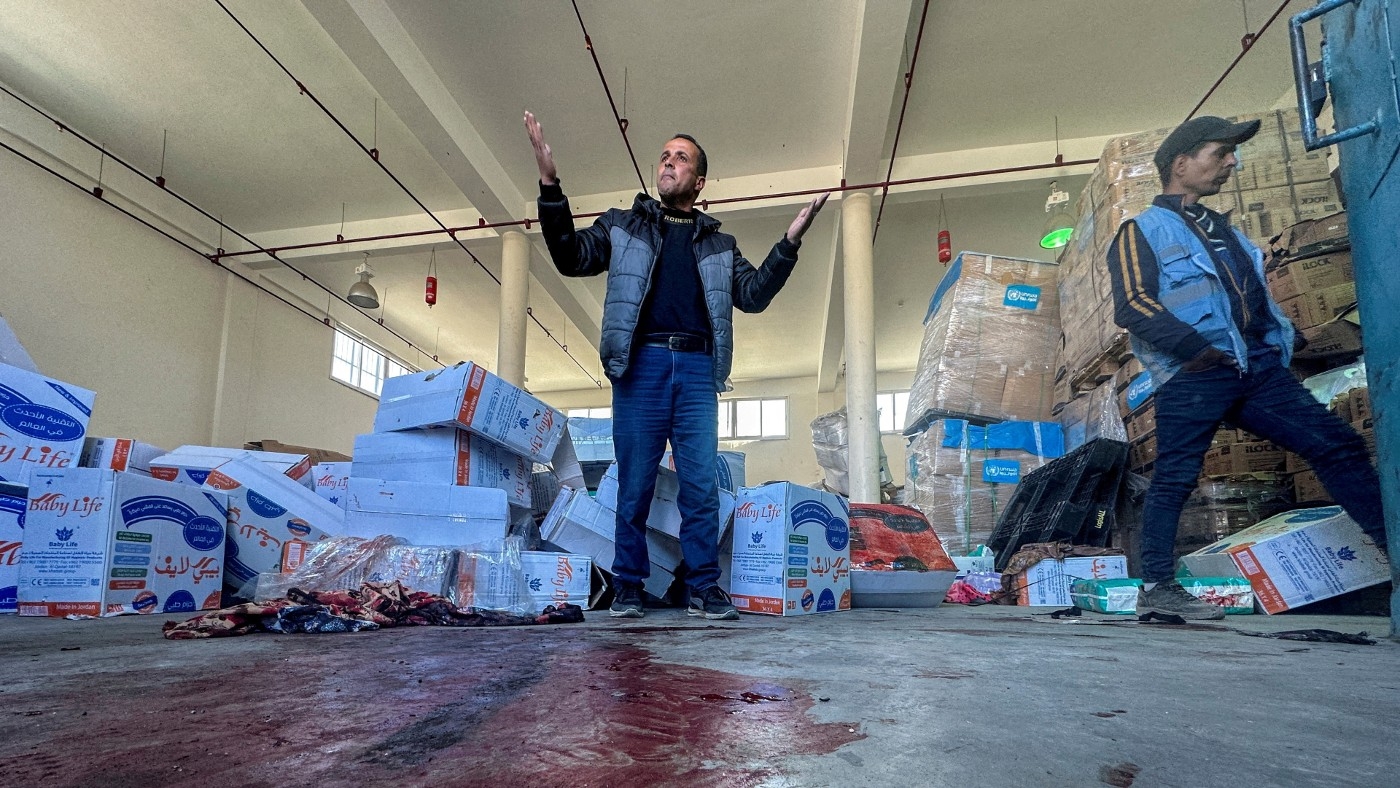
The war in Gaza will significantly slow the pace of economic growth across the Middle East, according to the International Monetary Fund (IMF).
On Thursday, the IMF revised its 2024 growth forecast for the Middle East and North Africa (MENA) region down to 2.7 percent from its 3.4 percent October regional outlook.
“The conflict in Gaza and Israel is a key downside risk for the MENA region, particularly the risk of further escalation or a protracted conflict and disruptions to trade and shipping,” the Washington-based UN financial agency said.
Israel's war on Gaza began following the Hamas-led attacks of 7 October. On Friday, Gaza's health ministry said that 34,012 Palestinians have been killed and 76,833 wounded since then.
According to Oxfam, 70 percent of the Palestinian enclave's infrastructure has been destroyed. More than 500,000 people have no homes to return to.
The downward revision was also driven by the war in Sudan, attacks on Red Sea shipping, lower oil output and violence in the occupied West Bank. The IMF also pointed to the existing challenges of high debt and borrowing costs.
The revised 2.7 percent figure still represents an improvement on the 1.9 percent growth recorded in 2023.
“Assuming these factors ease in 2025, growth is forecast to strengthen to 4.2 percent,” the IMF said. “Uncertainty is high and medium-term growth is forecast to remain below pre-pandemic historical averages.”

Within the region, oil exporters are forecast to fare better, with the fund projecting 2.9 percent growth, up one percentage point from last year, Reuters reported.
“The voluntary oil production cuts - most notably by Saudi Arabia - are expected to continue to put a temporary damper on growth this year,” the IMF said, adding that “higher-than-projected oil production will boost growth” for other, non-Gulf hydrocarbon producers.
Saudi Arabia and Russia led other Opec+ members last month in agreeing to extend voluntary output cuts of 2.2 million barrels per day (bpd) until the end of June to support the market. That has helped keep oil prices elevated, according to Reuters.
A meeting of top ministers from the group of oil producing countries earlier this month kept oil supply policy unchanged. The bloc is made up of the de facto Saudi-led Organization of the Petroleum Exporting Countries (Opec) and allies led by Russia.
Gulf economies are forecast to grow by 2.4 percent this year, a downward revision of 1.3 percentage points from October, the IMF said.
Pointing to plans to diversify oil-dependent economies in the region, the IMF said that non-hydrocarbon growth would be the main driver of growth in the coming years.
Prolonged disruptions to trade in the Red Sea would further impact trade volumes and shipping costs, according to the IMF, with a particular impact on Egypt due to lower Suez Canal receipts.
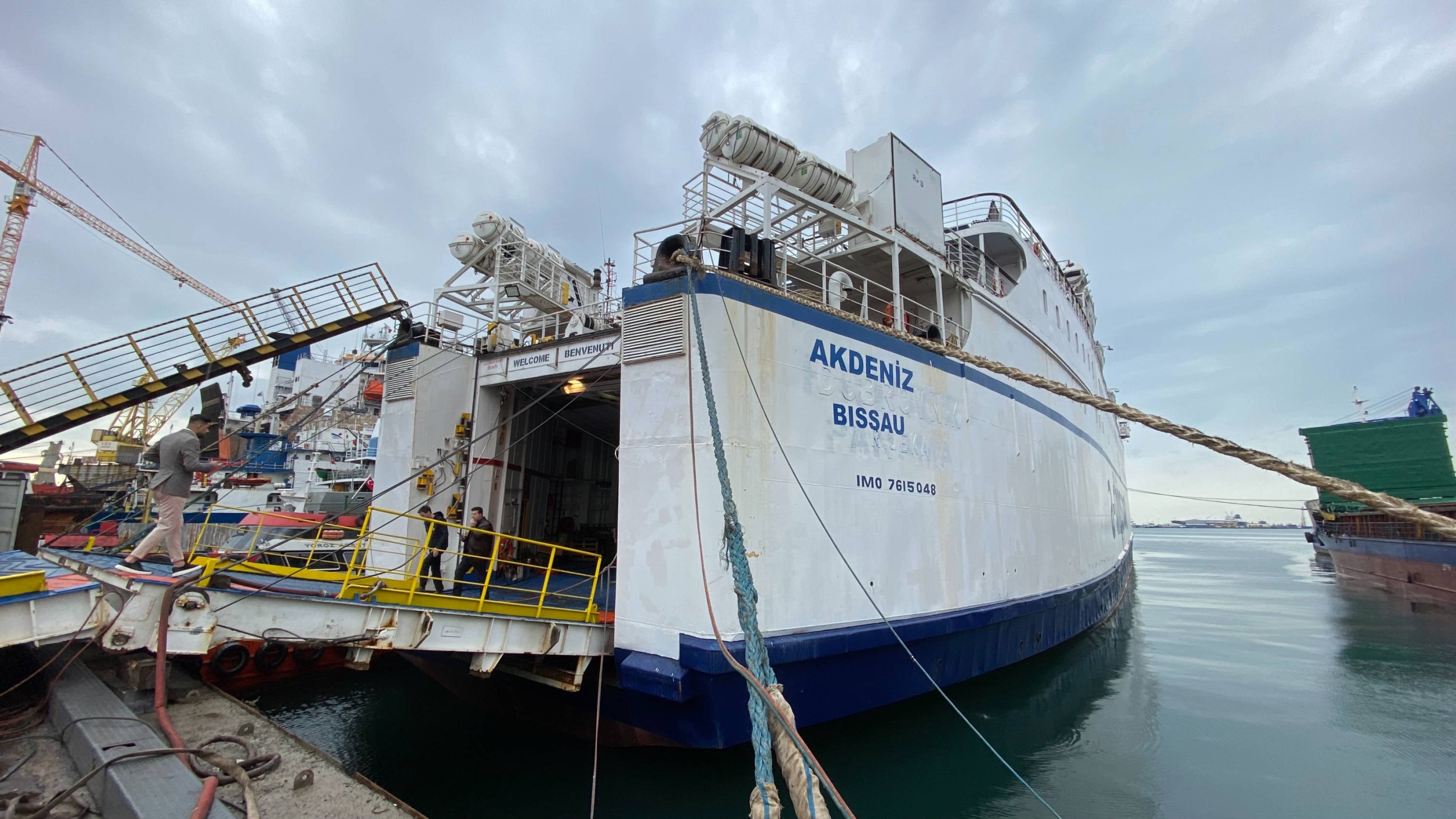
A group of human rights organisations is set to send a flotilla of four ships to Gaza from Istanbul next week, in a challenge to Israel’s blockade on the Palestinian enclave, activists announced on Friday.
Members of the Freedom Flotilla Coalition (FFC) spoke from a dockyard in Istanbul’s Tuzla, on board the Akdeniz ship, one of the four vessels that will embark on the journey. They expressed determination to reach Gaza despite Israel’s threats.
The press conference was attended by activists from various civil society organisations, including Ann Wright and Huwaida Arraf from the US Boat to Gaza, Wendy Goldsmith from the Canada Boat to Gaza, Torstein Dahle from FFC Norway, Zaher Birawi from International Committee for Breaking the Siege on Gaza, Zohar Chamberlain Regev from FFC, Carlos Trotta from Doctors Without Borders, Fauziah Mohd Hasan from Malaysia My Care, Medea Benjamin from the US group Code Pink, and Suzanne Adely from the US National Lawyers Guild.
This initiative evokes memories of the Mavi Marmara incident in 2010 when an attempt to break the Israeli siege on Gaza resulted in the deaths of ten people after the Israeli army raided the ship in international waters. The incident strained Turkish-Israeli diplomatic relations significantly.
This time, the Humanitarian Relief Foundation (IHH), the primary organiser of the coalition, has undertaken extensive preparations, including the acquisition of three ships.
Two ships are designated for activists, while a third, currently docked in Turkey’s Iskenderun, will carry 5.5 tonnes of humanitarian aid.
Another ship is expected to join from Italy. Approximately 1,000 people will participate in the voyage, accompanied by 100 journalists with internet and satellite connections.
'People are eager to sail to Gaza and be part of this historic mission'
-Mustafa Ozbek, Humanitarian Relief Foundation
While the coalition aims to set off next week, the issue of official permission remains unclear. "We are still negotiating with Turkish officials," said Mustafa Ozbek, a media official at IHH, adding that permission from Cyprus would not be necessary.
Despite ongoing preparations, it is uncertain when or if the ships will set sail. While the Turkish government maintains silence, Israeli officials have expressed hope that the attempt will be indefinitely postponed. Israel has designated IHH as a "terror organisation" since 2008.
However, Turkish sources familiar with the matter indicate that the flotilla may have a chance to sail, though its arrival in Gaza is uncertain.
The sources told MEE that Turkish officials are wary of the flotilla entering Israeli maritime waters, fearing further complications in bilateral relations.
The Turkish government believes it has made significant efforts to end the conflict, including imposing limitations on exports to Israel that could support its defence industry during the ongoing war, the sources pointed out.
The Turkish foreign ministry has not responded to MEE’s questions regarding the planned flotilla.
IHH's Ozbek believes 24 April would be a realistic departure date, but various technical challenges need addressing, such as ship maintenance, crew recruitment, additional bedspace provision, and stocking up on food, drinks and other essentials.
Ann Wright, a former US Army colonel who resigned in 2003 due to her opposition to the invasion of Iraq, told MEE that they are determined to accomplish their mission. “We know that the Turkish government is working hard diplomatically and in the humanitarian field. Yet, we expect their support and that of other governments for our mission,” she said.
'According to international law, Israel has no right to raid a ship filled with civilians and humanitarian aid'
- Ann Wright, a former US Army colonel
“There is no way that we can't sail. There is no way that we can't reach Gaza,” she added.
Referring to the Mavi Marmara raid by the Israeli army, Wright said, “In case of such an attack, we’ll expect all governments to uphold international law. According to international law, Israel has no right to raid a ship filled with civilians and humanitarian aid.”
Huwaida Arraf, a human rights lawyer, also said, “There is the possibility that Israel might attack us. We just hope they won’t, as the whole world would be watching us. Even if they do, we’ll adopt non-violent resistance.”
As for the possibility of rerouting the ships to alternative destinations like Egypt, Wright stated they would assess the situation at that time.
“We know that these are very dangerous times for the region. However, the people of Palestine are in danger, too. Therefore, the escalation between Iran and Israel, for instance, will have no impact on our decision.”
Meanwhile, as coalition members engaged with the press, intensive work continued aboard the Akdeniz ship.
Originally a cruise liner adorned with images of Italian, Greek, and Montenegrin shores, the Akdeniz is undergoing a comprehensive transformation.
Hall names have been changed to evoke themes of freedom, while a restaurant has been renamed "libertas," meaning liberty in Latin.
Each room is being redecorated to accommodate at least two activists, and a former restaurant has been repurposed into a press room equipped with around-the-clock internet and satellite connectivity for journalists.
“This ship has eight stories, with the capacity to accommodate 800 people. It has all required amenities for the safety of the activists,” Ozbek said.
“There is tremendous interest in participating in the flotilla coalition. We have received 12,000 applications via the internet from dozens of countries. People are eager to sail to Gaza and be part of this historic mission,” he said.
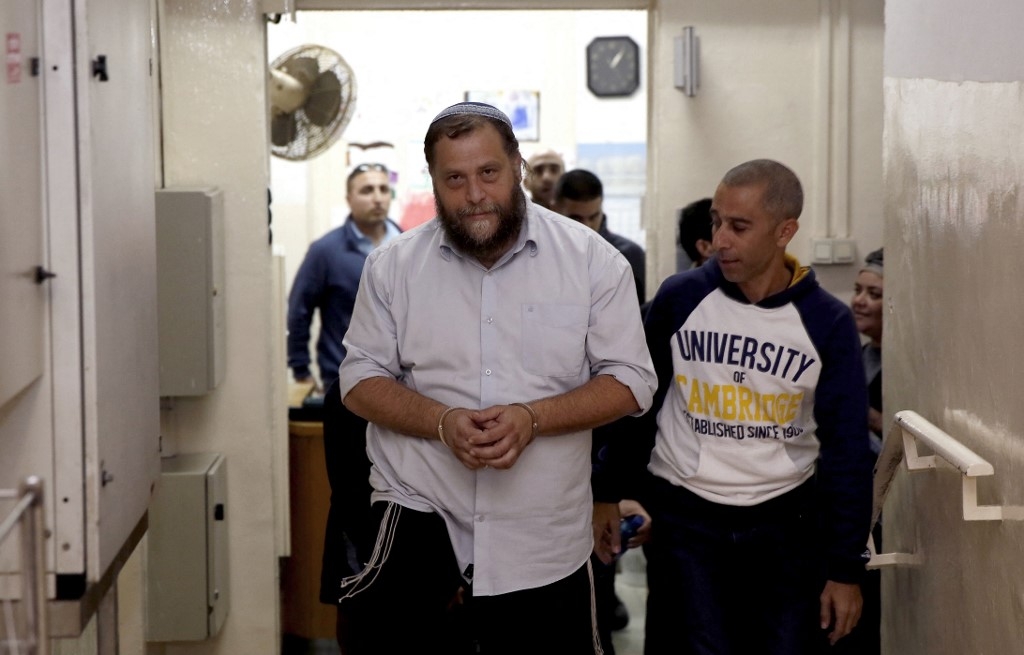
The US State Department on Friday imposed new sanctions on far-right Israeli settlers over their involvement in violence in the occupied West Bank.
Among those listed is Ben Zion Gopstein, leader of Lehava, a far-right Jewish supremacist group that gained notoriety in Israel for attempting to prevent marriages between Jews and Arabs.
The Treasury Department also designated Mount Hebron Fund and Shlom Asiraich over their role in establishing fundraising campaigns for two US-sanctioned far-right Israelis.
"We are deeply concerned about the escalation of violence in the West Bank in recent days and call on Israel to take all appropriate measures to prevent attacks by violent extremist settlers and hold those responsible accountable," the State Department said in a statement.
"The United States will not hesitate to take additional steps to promote accountability if necessary."
Earlier this year, Washington sanctioned five violent settlers and two illegal outposts in the West Bank.
One of the entities sanctioned on Friday, Mount Hebron Fund, launched an online fundraising campaign that raised $140,000 for settler Yinon Levi, according to Treasury, after he was sanctioned on 1 February.
Levi had led a group of Israeli settlers who assaulted Palestinian civilians and burned their properties and agricultural lands.
The other entity, Shlom Asiraich, raised $31,000 for David Chai Chasdai, who Washington said initiated and led a violent riot in the Palestinian town of Huwwara that resulted in the death of a Palestinian civilian.
Although the US has moved to sanction some Israelis involved in violence in the West Bank, it has otherwise resisted calls to impose penalties on other Israeli bodies or individuals.
A report by ProPublica on Thursday, citing several current and former US officials, said Secretary of State Antony Blinken had ignored recommendations from a special State Department panel to suspend assistance to Israeli military and police units, after those units were being probed for alleged human rights abuses against Palestinians.
The report said that in several incidents where this panel had reviewed cases of human rights abuses committed by Israeli forces, including extrajudicial killings by police; the gagging and handcuffing of an elderly Palestinian-American man who later died; and an allegation that Israeli interrogators tortured and raped a teenager.
The review of those incidents was obtained by ProPublica and did not include which ones led to a recommendation of sanctions.
The task force, known as the Israel Leahy Vetting Forum, is made up of Middle East and human rights experts and is named after former Senator Patrick Leahy, who authored the Leahy Laws. Those laws require Washington to cut off assistance to any foreign military or law enforcement units accused of flagrant human rights violations.
According to ProPublica, the recommendations for actions against certain Israeli security units were sent to Blinken in December.
The incidents reviewed by the news site took place prior to Israel's war on Gaza, which began in October in response to Hamas-led attacks on southern Israel that killed around 1,163 people and took more than 200 hostage.
Israel launched a full-scale war on the besieged enclave of Gaza, carrying out a relentless bombing campaign followed by a ground invasion that has levelled much of Gaza's civilian infrastructure.
Israeli forces have killed more than 34,000 Palestinians, most of whom are women and children, and have targeted schools, UN shelters, mosques, and hospitals.
The Biden administration's response to the war has been to provide Israel with diplomatic and military cover by fast-tracking arms shipments and blocking UN resolutions for a ceasefire in Gaza.
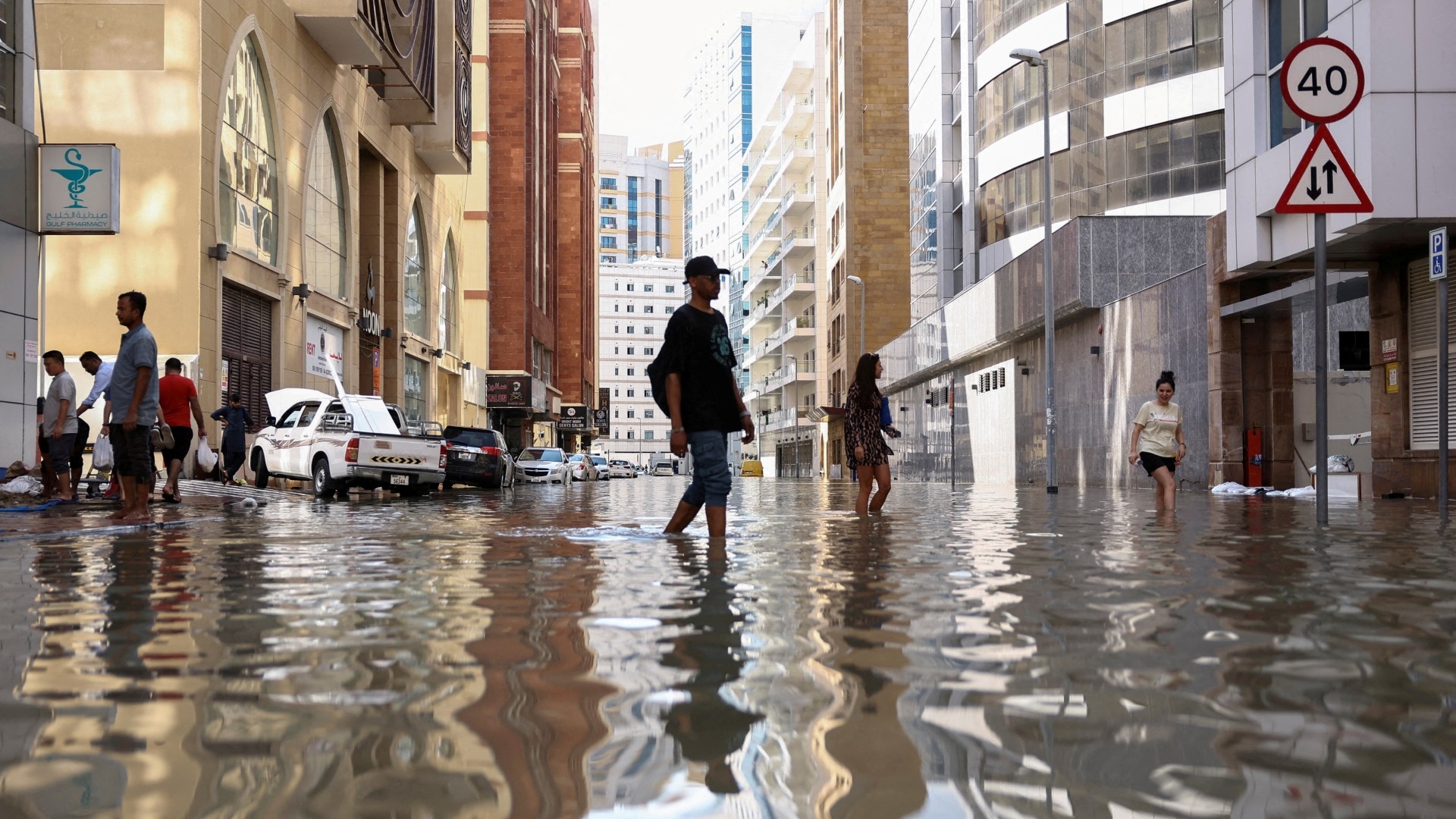
“This Lamborghini is swimming bro,” said influencer Crypto Bitlord, as his sports car battled against heavy rain in Dubai on Tuesday.
He was among hundreds of crypto traders and enthusiasts who descended upon the United Arab Emirates city this week for two cryptocurrency conferences: Blockchain Life and Token2049.
Attendees had probably expected the dry, arid conditions synonymous with the Gulf desert. Instead they were met by some of the heaviest rain in Emirati history.
Along the border with Oman, 254mm of rain was recorded in less than 24 hours earlier this week - the most since records began in 1949.
Many traders and influencers were left unimpressed by the ordeal.
“Dubai is the worst city I’ve ever been to and I’m never willingly coming here again,” wrote one trader.
In a lengthy post, crypto influencer ‘doitbigchicago’ said the emergency door on his plane into Dubai was “shaking”, as the aircraft landed in “3 feet of water”. He said his suitcase was “floating down the runway”.
He added that he attempted to live-stream the conditions in Dubai, until eight police officers were “trying to arrest me for live-streaming in public”.
Middle East Eye couldn’t independently verify the claims.
Another crypto investor and podcaster wrote: “This is the most dogshit thing I’ve ever seen… 0 police, 0 firefighters, 0 taxis - just yoloing the sea with a rental car after flight getting delayed by six hours.”
Some conference attendees who couldn’t get a ride to and from the airport were ready to go to extreme financial lengths.
“Willing to pay $500-1000 USD for a ride from DXB to Palm Jumeirah,” wrote Bitcoin trader "Faded".
Dubai looking like the fyre fest of crypto right now lol
— DANIEL GOT HITS (@danielgothits) April 17, 2024
Another investor, known as "the Watch King", also offered $1,000 to anyone who could take him to the airport.
There were significant delays and disruptions at Dubai International Airport - the world's busiest for international traffic. Clips online showed planes taxiing across a flooded runway.
There appeared to be little online sympathy for the crypto aficionados caught up in the chaos.
Some likened the event to Fyre Festival, a fraudulent luxury music event in April 2017.
“Looks like all the crypto bros are getting liquidated in Dubai. Quite literally,” joked one bitcoin analyst.
Who ever said Dubai was lacking in liquidity? 🇦🇪🌊 pic.twitter.com/VvgTXiJx97
— Cointelegraph (@Cointelegraph) April 16, 2024
“The collective karma of all of these sh*tfluencers is so bad that when they all congregate in the middle of the desert, it ACTUALLY floods,” said another user.
Some thought the floods were a punishment from a higher power.
“You cannot tell me God isn’t real when a bunch of Crypto twitters finest go to Dubai only to be met with a biblical flood,” wrote one X user.
only crypto mfers could cause a flood in a desert
— Jebus (@Jebus) April 16, 2024
It wasn’t the first time crypto and bitcoin investors had been caught up in adverse weather conditions: Korean Blockchain Week was hit by heavy rains in 2022, while an NFT event in New York City coincided with an earthquake earlier this month.
Though initially disrupted, both Dubai crypto conferences went ahead and many attendees made it to the event.
Earlier this week, analysts told MEE that climate change, infrastructure, the region's geography, and cloud seeding could exacerbate flooding in the Gulf region.
Mohammed Mahmoud, director of the climate and water programme at the Middle East Institute, said climate change “is an absolute driver of extreme weather”.
He told MEE: “Though we mostly associate climate change with hotter temperatures, warming in coastal areas promotes severe rainfall and storms.
"Such is the case for the Gulf, where those surrounding warmer waters (close to the equator) help to generate storms that produce intense rainfall that cause these devastating flooding events.”
Justin Dargin, a researcher at Oxford University specialising in climate and the Middle East, said infrastructural and geographic limitations also contributed.
“The region's arid climate, featuring sudden downpours combined with mountainous areas and desert valleys, creates conditions conducive to flash floods,” he said, adding that limited drainage systems also worsened the impact.
To deal with water security issues, the UAE has since 2002 carried out cloud seeding: a weather modification procedure that involves implanting chemicals into the atmosphere to induce rainfall.
“Cloud seeding likely contributed to the severity,” said Dargin. “However, the UAE's recent history of devastating flash floods, like those in 2020 and 2022, shows that recent bouts of heavy rainfall are the baseline of the increasing frequency of extreme rainfall events driven by climate change.”
He said that cloud seeding could exacerbate such weather patterns and lead to even more severe flooding in the future “if not undertaken judiciously”.
The UAE government's National Center of Meteorology taskforce denied that cloud seeding had taken place in the run-up to this week's storms.

A newly released report from an international human rights organisation has concluded that a genocide is taking place against non-Arab groups in Sudan’s Darfur region.
The independent inquiry carried out by the Raoul Wallenberg Centre has found that there is “clear and convincing evidence” that the Rapid Support Forces (RSF) paramilitary and its allied militias “have committed and are committing genocide against the Masalit,” a Black African group.
The report, which cites the work of Middle East Eye on multiple occasions, also concludes that “the RSF and allied militias have committed and are committing direct and public incitement to genocide” and that all 153 states that have signed the Genocide Convention are “obligated to end complicity in and employ all means reasonably available to prevent and halt the genocide”.
It goes on to say that there is “clear and convincing evidence” that Sudan, the United Arab Emirates, Libya, Chad, the Central African Republic (CAR) and Russia via the actions of the Wagner Group are “complicit in the genocide”.
Middle East Eye has reported on the network of supply lines that exist to funnel arms and other goods from the UAE to the RSF, via allied groups and governments in Libya, Chad and the CAR.
The UAE is the Sudanese paramilitary’s main patron, with the supply of arms to the RSF also facilitated by Libyan commander Khalifa Haftar, and running overland from Chad and the CAR, as well as being flown out of airbases in Uganda.
The RSF has been at war with the Sudanese Armed Forces (SAF) since 15 April last year. The war has displaced over eight million people and has left 18 million “acutely food insecure”, according to the UN’s World Food Programme.
The paramilitary force has denied that it is being supplied by the UAE and rejected accusations that it is waging an ethnically motivated campaign of violence in Darfur.
'Today, one can only feel shocked – if not betrayed – by the ongoing level of indifference and impunity in the face of another genocide'
- Irwin Cotler, Raoul Wallenberg Centre
The newly released report, which was reviewed and endorsed by prominent human rights experts including Luis Moreno Ocampo, and Irwin Cotler, the chair of the Raoul Wallenberg Centre and a former Canadian justice minister, states that the war “turned a pre-existing humanitarian crisis into an emergency of unprecedented and global magnitude”.
As the inquiry notes, the RSF grew out of the Janjaweed militias, the “devils on horseback” employed by the government of Omar al-Bashir to violently quell uprisings in the first decade of the 21st century. The Janjaweed stand accused of responsibility for the deaths of hundreds of thousands of Sudanese during those years.
In 2013, the Janjaweed were officially absorbed into the Sudanese state as the Rapid Support Forces, with the RSF’s chief, Mohamed Hamdan Dagalo, the former Janjaweed commander better known as Hemeti, becoming indispensable to Bashir.
In 2019, Hemeti, along with current army chief Abdel Fattah al-Burhan, removed Bashir from power in response to a popular uprising against the autocrat. Two years later, in October 2021, the two men enacted a military coup to end a civilian power-sharing agreement, before going to war with one another in April 2023.
In Darfur, the vast western region that serves as the RSF’s powerbase, the paramilitary group has been able to act almost completely without hindrance. Middle East Eye has reported throughout the war on the group’s targeting of the Masalit in cities including el-Geneina and el-Fasher.
Idriss, a 29-year-old from el-Geneina, the capital of West Darfur, told MEE in July that he had seen other Masalit Sudanese shot and killed by the RSF and its allied militias in front of him. Before escaping to Chad, he took photos of the dead bodies, which lined the streets of the city.
Women across Darfur - some as young as 12 - have been the victims of sexual assault perpetrated by men wearing RSF uniforms. At a meeting in Britain’s parliament on Wednesday, Zaza el-Sheikh, a Sudanese doctor, said that she and colleagues had met and examined 895 Sudanese women in Egypt who had been raped by fighters and were now pregnant as a result.
The Raoul Wallenberg Centre argues that there is clear evidence to conclude that the RSF is continuing the ethnically motivated genocide perpetrated by the Janjaweed militias against non-Arab groups in Darfur.
The report finds that there are “reasonable grounds to believe the RSF and allied militias are responsible for genocide against non-Arab groups other than the Masalit, including the Fur and Zaghawa”.
In his foreword to the report Cotler, who was a Canadian minister during the 2003 war in Darfur, writes that the “targeted identity-based campaign of destruction waged by the Rapid Support Forces (RSF) is the inevitable result of an ongoing culture of impunity in Darfur.”
“As this report demonstrates in chilling detail, the same perpetrators, now under the flag of the RSF, are committing the same atrocities against the same targeted groups, fuelled by the same dehumanisation, demonisation, incitement, and oft-expressed intent to destroy the Masalit or non-Arab groups.
“Twenty years ago,” Cotler writes, “the international community at least acknowledged the genocidal atrocities, though it utterly failed to take the necessary action to prevent them. Today, one can only feel shocked – if not betrayed – by the ongoing level of indifference and impunity in the face of another genocide that is being effectively silenced and sanitised.”

Israel did not notify the US of its intention to carry out strikes in Iran on Thursday, and had previously told its closest ally that it would not strike the Islamic Republic until after the Passover holiday, a senior US official has told Middle East Eye.
The senior US official, who was speaking on condition of anonymity, said Israeli officials had assured their US counterparts that their response to Iran's highly choreographed attacks from over the weekend would not come until after the Passover holiday which starts on 22 April and ends on 30 April.
Israel's overnight attack on Iran appeared to be limited in scope, potentially designed to avoid further escalation.
Iranian state media said three drones were shot down over the city of Isfahan. Siavosh Mihandoust, a senior Iranian commander, told state TV there had been no damage caused by the attack. The International Atomic Energy Agency also said Iran’s nuclear sites were unharmed.
The strike came just hours after US Defence Secretary Lloyd Austin spoke with Israeli Defence Minister Yoav Gallant to discuss rising tensions in the Middle East.
Speaking to reporters on the Italian island of Capri, US Secretary of State Antony Blinken refused to answer questions about the attacks on Iran.
"I'm not going to speak to that [the attacks on Iran] except to say that the United States has not been involved in any offensive operations," he said.
"The United States, along with our partners, will continue to work for de-escalation," he added.
Earlier on Friday, Italy's Foreign Minister Antonio Tajani told reporters that the US was only informed by Israel of the attack at the "last minute".
"There was no sharing of the attack by the US. It was a mere information," he added.
MEE reached out to the White House for comment but did not receive a response by the time of publication. Attempts to contact Israel's embassy in Washington DC went unanswered.
By Friday afternoon, flights resumed at Iranian airports, and a Revolutionary Guard commander told Reuters that there was no immediate plan for retaliation.
Mihandoust was quoted by state TV as saying air defence systems had targeted a "suspicious object".
He said there had been no damage from the attack.
Meanwhile, an analyst told Iranian state TV that mini-drones had been flown by "infiltrators from inside Iran".
In Israel, authorities were officially quiet, although several politicians and former officials have spoken out about the strike.
National Security Minister Itamar Ben Gvir, a hardliner who had pushed for a forceful response to Iran's early Sunday attack, tweeted the single word: "Feeble!"
Since Israel declared war on Gaza following the 7 October attacks, the Biden administration has been trying to prevent Israel's deadly offensive from triggering a wider regional conflict.
But it has been caught between supporting its ally militarily and pushing back against Tehran. On Friday, the Wall Street Journal reported that the White House was considering a new billion-dollar arms transfer to Israel.
Over the weekend, the US led a coalition of France, the UK, and Jordan to intercept over 300 drones, ballistic missiles, and cruise missiles fired at Israel by Iran in retaliation for an attack on its embassy in Damascus, Syria.

Iran has hit out against a "malicious" campaign by British parliamentarians to ban the Islamic Revolutionary Guards Corp (IRGC).
In a letter from the All Party UK-Israel Parliamentary Group signed by MPs and members of the House of Lords, Prime Minister Rishi Sunak was called on to proscribe the organisation, which they said was responsible for "destructive terror" in the Middle East and beyond.
Iran's Embassy in the UK told Middle East Eye that the call to proscribe the IRGC was being pushed by "a few specific individuals and groups who are aiming to diminish and destroy the Iran-UK relationship".
"We believe that the push to designate the IRGC is influenced by external actors, notably the Israeli regime, which has a history of antagonism towards Iran," said the embassy in a statement.
"This attempt serves to escalate tensions and provoke confrontation rather than promote peace and stability in the region."
The embassy said the IRGC had been crucial in countering "terrorist threats and extremist groups" in the Middle East, including the Islamic State group.
"Accusations of terrorism against the IRGC are lack of substantiation and are driven by political agendas, serving only to benefit certain interests," it said.
The IRGC was formed following the 1979 Islamic Revolution in Iran and is part of the Islamic Republic's official military structure.
Calls to proscribe the organisation have come from politicians across all the major UK parties for many years.
Thursday's letter, signed by a cross-party selection of MPs and members of the House of Lords, said the IRGC was responsible for "destructive terror" in the Middle East and beyond.
It came in the wake of an attack launched against Israel by Iran on Saturday, consisting of around 170 drones, 30 cruise missiles, and 120 ballistic missiles, according to Israeli officials.
That attack was itself in response to a 1 April air strike on Iran's consulate building in Damascus, Syria, which killed several people including three top Iranian military commanders.
"The IRGC has never posed a greater threat than it does within the UK. A range of their activities have been publicly disclosed, causing significant concern across our nation," said the letter.
"These include assassination plots uncovered and foiled by MI5, intelligence gathering on British-Jewish targets by UK-based criminal networks, intimidation of journalists including Iranian journalists, and radicalisation in British Islamic centres," it added.
The signatories also linked the IRGC to the Hamas-led 7 October attacks in southern Israel that left around 1,163 people dead, saying they were carried out by "proxies" of the organisation and that it was the "root cause" of their activities.
"The government has rightly proscribed Hamas and Hezbollah terror groups which have been an essential step in combatting extremism and terrorism here in the UK, but it is not enough," said the letter.
Chris Doyle, Director of the Council for Arab-British Understanding (Caabu) told MEE that while there was much that warranted the sanctioning of the IRGC in terms of its activities across the world, it also risked shutting down diplomatic channels at a time of increasing tensions.
"Valid questions exist as to whether by sanctioning it you will make a difference and also whether you are cutting off the last vestigial links with the Iranian authorities which could be crucially important for de-escalation going forward," he explained.
He added that it was notable that despite many politicians advocating proscription for years - particularly within the ruling Conservative Party - the government had so far been hesitant, although that could change.
During Iran's attack on Sunday, a small number of ballistic missiles got through Israel’s defences, hitting the Nevatim airbase in southern Israel, while a young Palestinian Bedouin girl was critically wounded when shrapnel from an intercepted ballistic missile hit her family home near Arad, in the southern Negev region.
The drones and missiles were intercepted by Israel, the US, the UK, France and Jordan.
On Thursday, the US and UK said they have imposed new sanctions on Iran. The US Treasury Department said the measures targeted 16 individuals and two entities enabling Iran’s unarmed aerial vehicle (UAV) production.
That included targeting engine types that power Iran’s Shahed variant UAVs, which were used in the 13 April attack, as well as five companies providing component materials to Iran’s Khuzestan Steel Company (KSC), one of the country's largest steel producers.
Meanwhile, Britain imposed sanctions targeting Iranian military organisations, individuals, and entities involved in the UAV and ballistic missile industries.
Israel retaliated against Iran on Friday, with Iranian state media saying three drones were shot down over the city of Isfahan.
Siavosh Mihandoust, a senior Iranian commander, told state TV there had been no damage caused by the attack, and the International Atomic Energy Agency also said Iran’s nuclear sites were unharmed.
Doyle said that with Israel and Iran increasingly trading blows, there were many in the international community who questioned the push to sanction the IRGC while not applying similar measures to Israel or Israel-backed groups involved in violations of international law.
"When it's Israel making massive violations of international law, not only do we [the UK] do nothing to stop it, but we facilitate it through the sale of arms," he pointed out.
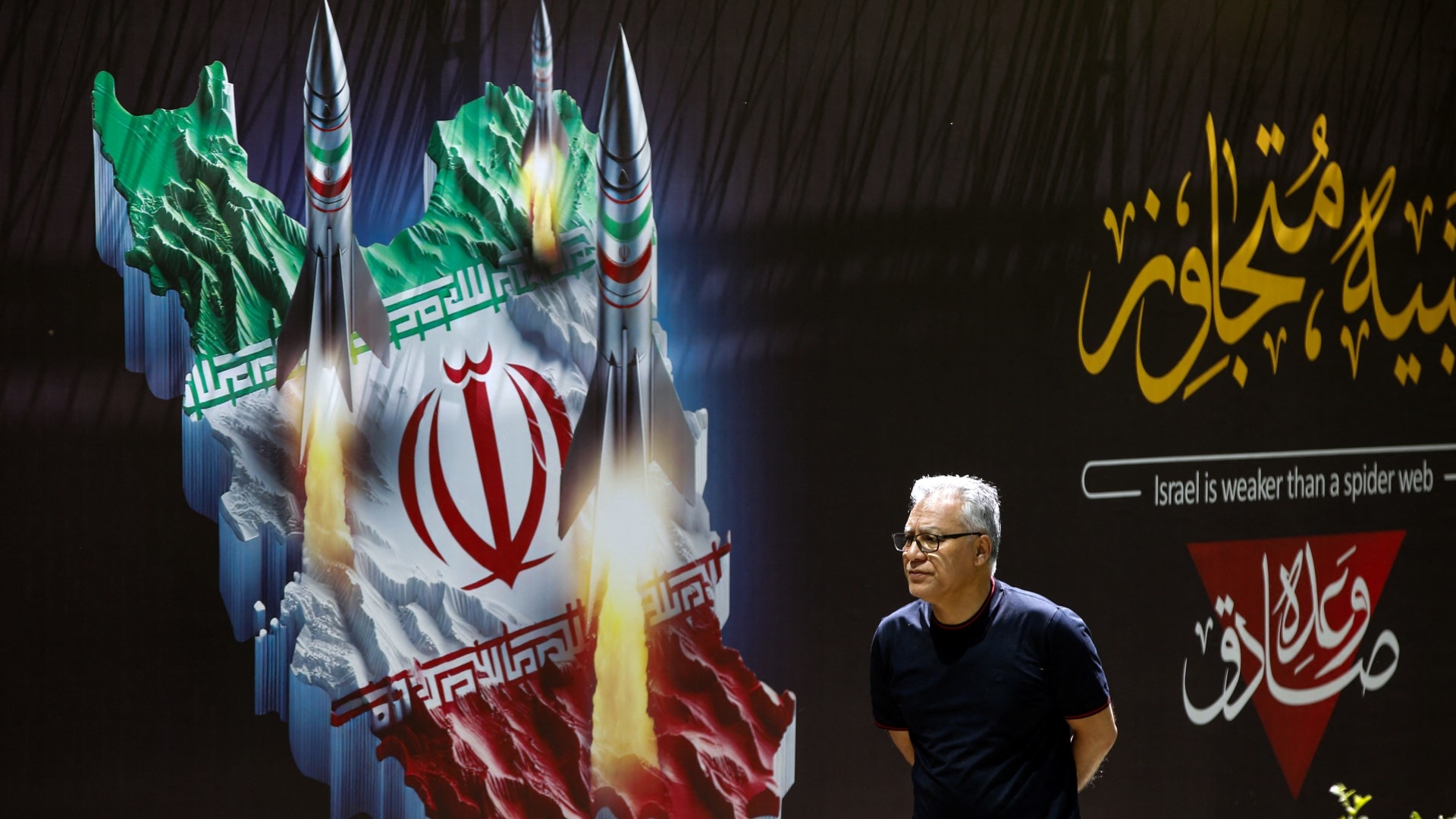
Israel appears to have attacked Iran overnight Thursday, with Iranian state media saying three drones were shot down over the city of Isfahan.
Various media in the United States reported US officials saying “limited” Israeli strikes targeted Iran, and that Washington was notified beforehand.
However, a senior US official told Middle East Eye that Israel blindsided Washington, having promised to wait until after next week's Passover holiday. In Italy's Capri, Secretary of State Antony Blinken said the US was not involved in the operation.
Iranian officials told the New York Times the attack was carried out by small drones, possibly launched from within Iran as its radar systems did not detect them entering the country.
The officials said the drones targeted an air base in the central city of Isfahan and another small group was shot down in Tabriz, 500km to the north.
One US official told the Washington Post the attack was a signal to Tehran that the Israelis can strike within the country.
Siavosh Mihandoust, a senior Iranian commander, told state TV there had been no damage caused by the attack. The International Atomic Energy Agency also said Iran’s nuclear sites were unharmed.
Israel's government has not commented, though its hawkish far-right national security minister, Itamar Ben Gvir, posted on X: "Feeble!"
On 1 April, an Israeli strike on the Iranian consulate in Damascus killed a senior Republican Guard general and six commanders.
Denouncing the raid on sovereign Iranian soil, Tehran launched hundreds of drones and missiles at Israel on Saturday night, most of which were shot down with the help of the US, Jordan and other countries.
By Friday morning, calm was returning in Iran. All flights were resumed at Iranian airports, and a Revolutionary Guard commander told Reuters there is no immediate plan for retaliation.
For years, Israel has struck Iranian forces and their allies in Syria, and is believed to have carried out attacks on facilities in Iran as well as assassinated key figures like nuclear scientists. Israeli strikes reportedly targeted air defence systems in southern Syria early Friday morning.
Following the 7 October Hamas-led attack on southern Israeli communities and Israel's war on Gaza, several Iranian-backed groups have also attacked Israel in solidarity with Palestinians under fire in the coastal enclave.
Lebanon's Hezbollah, the Houthi movement of Yemen and Iraqi paramilitaries have all launched rockets and drones at Israel over the past six months. Though voicing its support for Hamas, and being a chief backer of the Palestinian group before the war, Tehran has largely stayed out of the war.
However, the Israeli strike on the Damascus consulate raised fears of the Gaza war spilling out into an even greater regional conflict.
Oman's foreign ministry condemned the latest strike and "the repeated Israeli military attacks in the region" and reiterated its call for a ceasefire in Gaza and a comprehensive settlement for the Palestinians.
Ursula von der Leyen, the European Commission president, said: "It is absolutely necessary that the region remains stable and that all sides restrain from further action."
UN Secretary General Antonio Guterres said that it is "high time" to stop the "dangerous cycle of retaliation".

The United States vetoed a United Nations Security Council resolution on Thursday that would have allowed Palestine to be admitted as a full member of the international body and effectively recognised its statehood.
The resolution needed at least nine votes to pass and no vetoes from the five permanent members - the United States, the UK, France, Russia and China.
The proposal received 12 votes in favour, while the UK and Switzerland abstained from voting.
Russia, China, France, Japan, South Korea, Ecuador, Algeria, Malta, Slovenia, Sierra Leone, Mozambique and Guyana all voted yes. The US ultimately blocked the measure.
After vetoing the resolution, the US deputy ambassador to the UN, Robert Wood, attempted to justify the decision and appeared to cast doubt on Palestine's qualifications.
"We have long been clear that premature actions here in New York, even with the best intentions, will not achieve statehood for the Palestinian people," Wood said.

"There are unresolved questions as to whether the applicant meets the criteria to be considered a state.
"Since the attacks of October 7, President Biden has been clear that sustainable peace in the region can only be achieved through a two-state solution with Israel's security guarantee... There is no other path that guarantees Israel's security and future as a democratic Jewish state."
Russia's ambassador to the UN, Vassily Nebenzia, lashed out at the US' decision, and said the veto showed what Washington "really thinks of the Palestinians."
The US thinks "they [the Palestinians] do not deserve to have their own state," and it only realises "the interest of Israel," he said.
Nebenzia added that the US was turning a blind eye to the "crimes of Israel" amid its ongoing assault on Gaza, as well as the continuation of the illegal settlement activity in the occupied West Bank.
The Palestinian group Hamas, who just hours earlier said it would dismantle its armed wing after the creation of a Palestinian state, accused the US of standing "in the face of international will" by exercising its veto power.
The group said in a statement that it condemns "in the strongest terms the American position biased towards the occupation," as it called on the international community "to exert pressure to go beyond the American will and support the struggle of our Palestinian people and their legitimate right to self-determination."
"We assure the world that our Palestinian people will continue their struggle and resistance until they defeat the occupation, take away their rights, and establish their independent, fully sovereign Palestinian state with Jerusalem as its capital," the statement added.
Since assuming office in 2021, the Biden administration has repeatedly said it wants to achieve a two-state solution to the protracted conflict. However, a recent report by The Intercept claimed that prior to Thursday's vote, Washington was lobbying other countries to reject the resolution on Palestinian statehood.
"It remains the US view that the most expeditious path toward a political horizon for the Palestinian people is in the context of a normalization agreement between Israel and its neighbors," a diplomatic cable dated April 12 reportedly said.
"We believe this approach can tangibly advance Palestinian goals in a meaningful and enduring way."
Meanwhile, earlier on Thursday, a report in Wall Street Journal said the Biden administration was pushing for a deal that would see Israel express a "new commitment to Palestinian statehood" in exchange for Saudi Arabia normalising relations with Israel.
At the start of the Security Council meeting on Palestine's membership status, UN Secretary General Antonio Guterres told the council that the ongoing war on Gaza, as well as the recent escalations between Iran and Israel, had made it more important to achieve a two-state solution.
"Recent escalations make it even more important to support good-faith efforts to find lasting peace between Israel and a fully independent, viable and sovereign Palestinian state," Guterres said.
"Failure to make progress towards a two-state solution will only increase volatility and risk for hundreds of millions of people across the region, who will continue to live under the constant threat of violence."
His comments were echoed by South Africa's deputy representative to the UN, Marthinus Van Schalkwyk, who said the international community must avoid stiflling "the very existence of the State of Palestine."
South Africa has been among the staunchest opponents of the Israeli war on Gaza, and has led the case before the ICJ accusing Israel of committing genocide against the Palestinians in the besieged enclave, and requesting provisional measures to end the war.
On 26 January the ICJ issued provisional measures calling on Israel to refrain from impeding the delivery of aid into Gaza and improve the humanitarian situation. It also ordered Israel to take all measures within its power to prevent acts of genocide in the besieged enclave and to punish incitement to genocide.
Thursday's vote came more than six months into Israel's bombardment of the Gaza Strip, which has killed more than 33,000 Palestinians and plunged the coastal enclave into a humanitarian catastrophe.
The latest food security report by a UN-backed initiative found that the entire population of Gaza, estimated to be around 2.3 million, is enduring "acute" food insecurity while half the population suffers from a greater level of food insecurity classified as "catastrophic".

Three Barnard College students, including US lawmaker Ilhan Omar's daughter Isra Hirsi, have been suspended for participating in a Gaza solidarity protest encampment at Columbia University in New York City.
The suspension of the three students came as university administrators called on the New York Police Department (NYPD) to dismantle the tents that had been set up earlier on Wednesday.
Several students told MEE that heavily armed police dressed in riot gear entered the university lawns on Thursday to tear down the 50-plus tents. By late Thursday afternoon, the camps were gone and at least 108 students were arrested, including Hirsi.
The developments on Thursday followed the revelations that three students - Isra Hirsi, 21, along with Maryam Iqbal, 18, and Soph Dinu, 21 - had received letters earlier in the day informing them they had been suspended, effective immediately, due to refusing to pay heed to calls to end their protest.
"This decision is based on information received from Columbia University Public Safety that you have been involved in an unauthorized encampment on the Columbia University campus and you have not ceased participation in this unauthorized encampment despite repeated requests from Barnard and Columbia on April 17, 2024 that you do so," the letter to the trio read.
The interim suspension means the students have lost access to their food, housing, and the school's medical centre.
Two of the three live in student housing and have been illegally locked out of their homes with no notice.
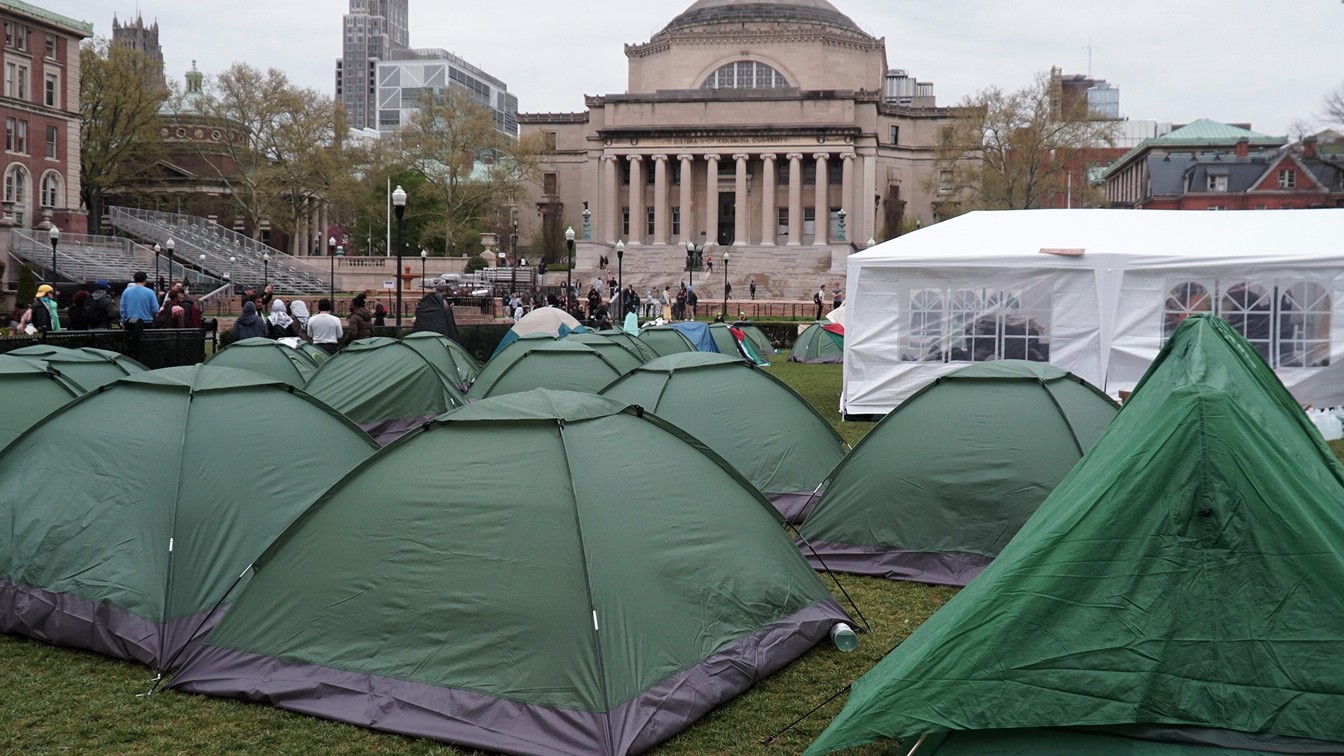
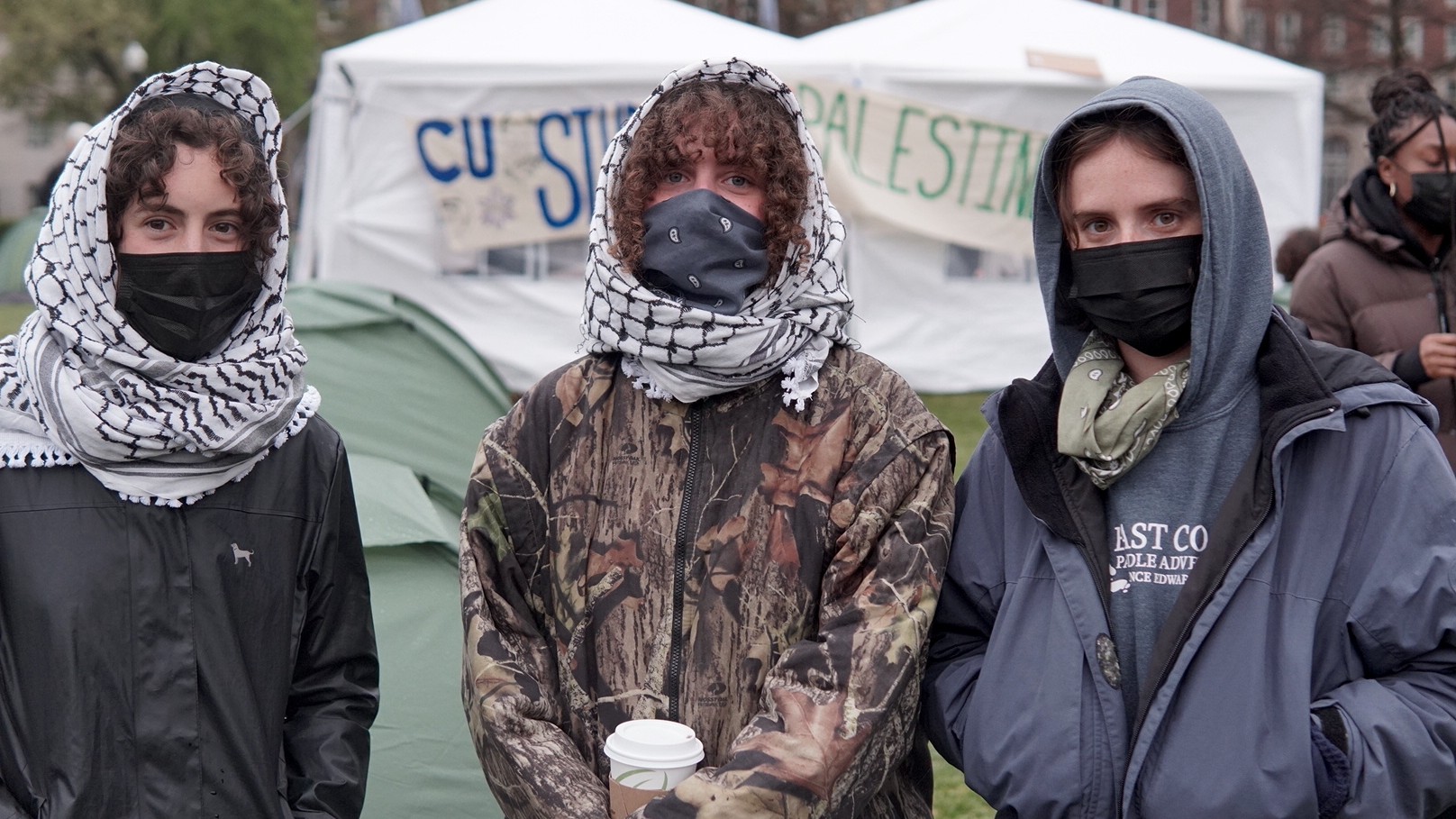
In an interview with Middle East Eye, Hirsi said she and the other two students were not surprised by the university's decision to suspend them because the institution had repeatedly threatened those protesting with immediate consequences.
"We expected it because they warned us ... the school has threatened everybody here with suspension," Hirsi said.
"We find it very interesting that they've only given it to the three of us," she added.
Hirsi said that given so many of her fellow organisers and peers had experienced disciplinary hearings and repression from the university over the past several months, she felt compelled to "step up".
Hirsi said her background as a daughter of refugees - Representative Ilhan Omar's family came to the US as Somali refugees in 1995 - she had some understanding of what war could to do people and the need to fight for others, especially elsewhere.
"Especially going to a school that is complicit in this genocide, I feel like I have a responsibility to use my voice and my platforms to fight for this cause," Hirsi said.
The students said administrators were targeting individual student organisers because they had lost control of the student body and the narrative.
"They've essentially lost control of the student body. We have not only occupied a lot on campus but we've occupied the entire university," said Iqbal, the second student who was suspended.
Iqbal noted how protests at Columbia have continued despite incessant attempts to shut them down.
"I think that they don't seem to learn from their mistakes and that suspending students or suspending organisations always galvanises the student body even more and causes more rage, and then, in turn, produces more escalation and mobilisation," she said of the university administration.
"I think that sooner or later, it will spiral to the point where Columbia will be forced to divest it because they just cannot keep this up. It's not sustainable," Iqbal said.
The camp set up on the southern lawns of Columbia University was organised by the student-led coalition, Columbia University Apartheid Divest, Students for Justice in Palestine, and Jewish Voice for Peace.
Students said they have been encouraging teachers to hold their classes at the camp.
They would also be hosting discussions about the history of the anti-apartheid movement as well as the role of art, and educating in fighting against oppression.
Tensions are particularly high at Columbia following a congressional hearing on Wednesday into accusations of rising antisemitism on the campus since the events of 7 October 2023, when Hamas-led fighters broke out of Gaza into southern Israel.
The Hamas-led attack killed around 1,200 people in Israel and more than 200 people were taken hostage. In response, Israel launched a full-scale war and its forces have killed more than 33,000 Palestians, the majority of whom are women and children, in what rights groups, UN experts and several countries have said is a genocide.
Israel's war on Gaza led to a surge in pro-Palestinian actions on college campuses. The demonstrations taking place at Ivy League schools have particularly received national attention along with a crackdown from police and university administrations.
The comments of three Columbia professors following the Hamas-led attacks, including Joseph Massad, Katherine Franke and Mohamed Abdou, came under intense scrutiny during the congressional hearing on Wednesday. But students say the professors have been grossly misrepresented by administrators and pro-Israel groups.
"Everyone who is speaking their mind right now is being targeted and will continue to be targeted because we are the greatest threat to the university," Soph Dinu, the third student who was suspended by Bernard, told MEE.
Dinu said she was particularly disgusted by the way her Jewish identity was being "used as a means through which to weaponise claims of antisemitism" on the campus.
Since the first week of April, eight students have been suspended from Columbia University for pro-Palestinian activism.
The students said the camp-out would continue until the university ended its relationship with corporations that profited from Israeli "apartheid, genocide, and occupation in Palestine".
"Despite the University's threats, the Gaza Solidarity Encampment will remain until Columbia University divests all finances, including the endowment, from corporations that profit from Israeli apartheid, genocide, and occupation in Palestine," the student groups said in a statement.
"We demand they ensure further accountability with complete transparency for all of Columbia's financial investments. Finally, we demand full amnesty for all students disciplined for their involvement in the encampment or the movement for Palestinian liberation," the students added.

Iran's supreme leader, Ayatollah Ali Khamenei, has been the key figure in Iranian political life for more than 40 years, and the country’s political and religious figurehead since 1989.
During that time he has presided over a nation that has undergone significant social and political change, and repositioned itself in the wider world.
Born into a clerical family on 19 April 1939, he undertook religious training at seminaries in the holy city of Mashhad, as well as Najaf in Iraq.
He returned to Iran and eventually settled in Qom, where he furthered his clerical studies under figures including Ayatollah Hossein Borujerdi and Ayatollah Ruhollah Khomeini, who was later to become the supreme leader.
During the 1960s and 1970s he participated in covert activities against the Shah, Mohammad Reza Shah Pahlavi, for which he was arrested and tortured multiple times by the SAVAK secret police.
In 1979, the Shah was overthrown after popular protests.
Khomeini, who had been in exile since the mid-1960s, returned to Tehran from France amid jubilant crowds and widespread support.
Khamenei quickly ascended through the ranks of the early revolutionary state, assuming key roles on the Islamic Revolutionary Council, as well as a lawmaker and deputy defence minister. He also led Friday prayers in Tehran.
Khamenei was also one of the leading revolutionary figures targeted in assassination attempts in 1981, when a bomb hidden in a nearby tape recorder exploded as he was addressing a mosque. The attack was attributed to the anti-clerical opposition Forqan Group. Khamenei suffered serious injuries and was left paralysed in his right arm.
After President Mohammad Ali Raja'i and Prime Minister Mohammad Javad Bahonar were assassinated in August 1981 by the dissident Mujahedin-e Khalq (People's Mojahedin Organisation of Iran), Khamenei ran for the presidency, winning 95 percent of votes in an uncontested election.
He was publicly backed by the three other candidates, one of whom, Mir-Hossein Mousavi, was to become prime minister. Khamenei sought to cement the clerical establishment's control of the key organs of power, often clashing with more left-leaning figures, including Mousavi.
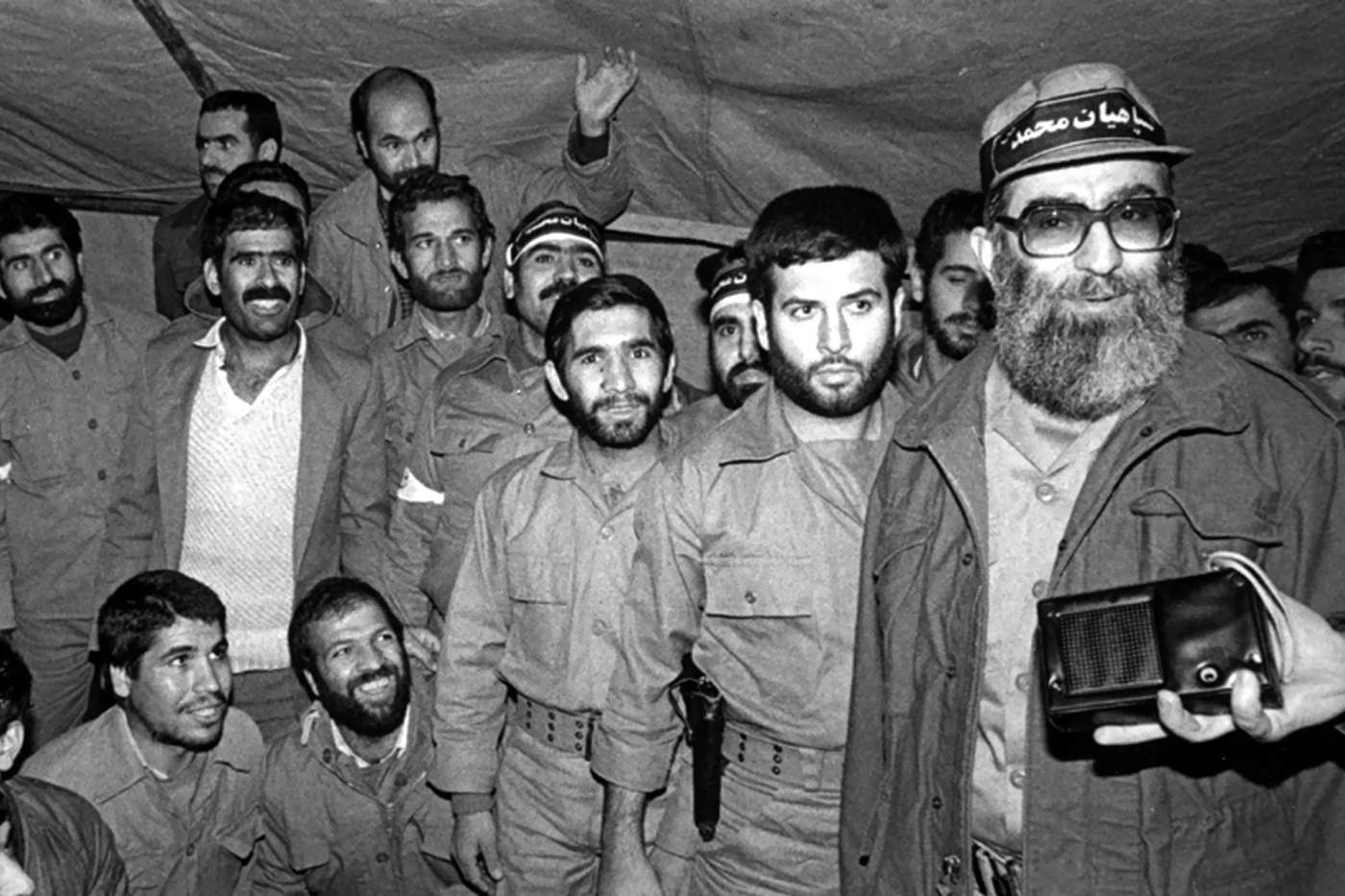
Khamenei’s foreign policy focused initially on managing Iran’s eight-year conflict with Saddam Hussein's Iraq, during which an estimated one million civilians and troops died on both sides.
In September 1987, Khamenei attacked the US presence in the region at the United Nations General Assembly in New York. “Our message to Third World governments is that as long as the order of domination and the current situation exists, they should try to create unity among themselves: this is the best way to become powerful.”
In 1989, the world changed with the end of the Cold War between the US and the Soviet Union.
Iran also began to witness significant changes. The death of Khomeini on 3 June 1989 was a crucial turning point for the country. Khomeini’s long-time designated successor, Ayatollah Hossein Ali Montazeri, had been sidelined and effectively defrocked by Khomeini only three months earlier, due to his calls for more pluralism in politics.
Iran’s Assembly of Experts designated Khamenei as Iran’s new leader, a role which Khamenei himself initially argued he was not qualified to assume.
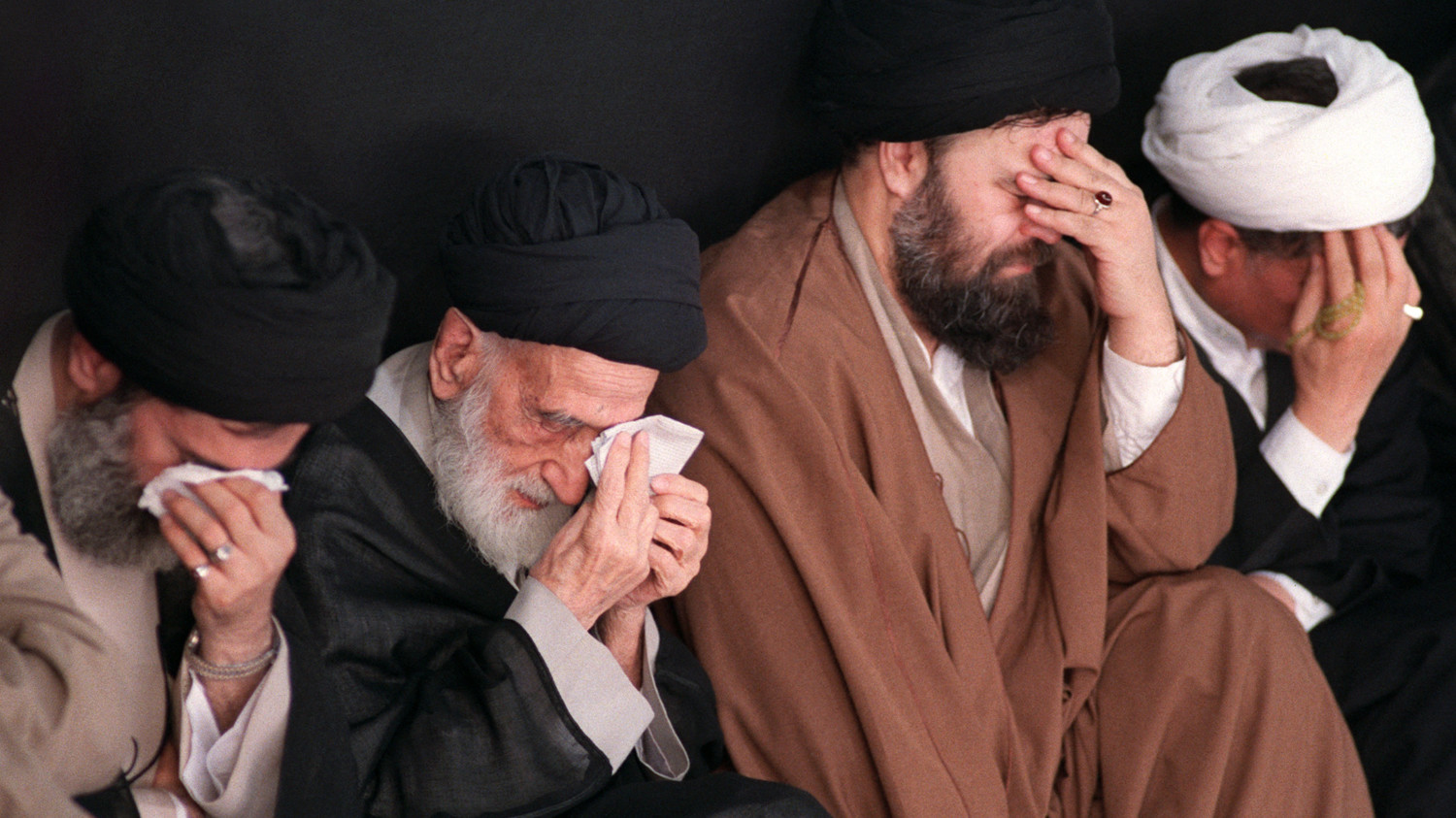
Khomeini’s theory of Islamic government, on which the Islamic Republic’s political system was partly based, centred on the notion of the guardianship of the jurist, known as velayat-e faqih. It asserts the power of the clergy over the state, and means only the highest-ranking Shia clerical figure is deemed sufficiently qualified to be Iran's supreme authority.
But Khamenei’s position in June 1989 was only that of a middle-ranking hojatoleslam. For some clerics, Khamenei was not sufficiently qualified in religious matters to hold the post. Khamenei himself asserted as much in his inaugural address, noting that he was but a “minor seminarian”.
Ayatollah Khomeini’s theory of Islamic government centred on the notion of the guardianship of the jurist… but Khamenei was just a middle-ranking cleric
Subsequent changes to the constitution stated that it was more important for the office holder to be “aware of the times”, and therefore politically minded, rather than derive their authority solely from certain religious qualifications. At the same time, the executive powers of the presidency were also enhanced.
Khamenei’s unconventional assumption of power eventually led to a form of dual leadership between him and Ali Akbar Hashemi-Rafsanjani, president from 1989-1997.
During the early years of his rule, the two long-time protagonists in Iranian post-revolutionary politics initially acted in step with one another.
Khamenei has faced opposition, both within the establishment and, perhaps more seriously, among the wider population. But his position at the time of writing seems secure.
The relationship between the presidency and supreme leader came under increasing strain during the 1990s, as the liberalising tendencies of Rafsanjani collided with the conservatism of Khamenei.
Khamenei’s relative pragmatism was especially tested with the rise of the liberal reformist movement in Iranian politics from the mid-1990s onwards.
This reached its zenith with the election of Mohammad Khatami as Iran’s fifth president in 1997. Khatami rode a wave of popular optimism and secured support from Iran’s rapidly growing young population and female voters.
Khamenei now adopted a more recognisably conservative outlook, often acting as a balance against the more liberally inclined Khatami. This approach also extended to curtailing reformist efforts to further open Iran to the West.
When Mahmoud Ahmadinejad became president in 2005, the assumption was that he and Khamenei would be in lockstep, due to Ahmadinejad’s popularity among Iranian conservatives.
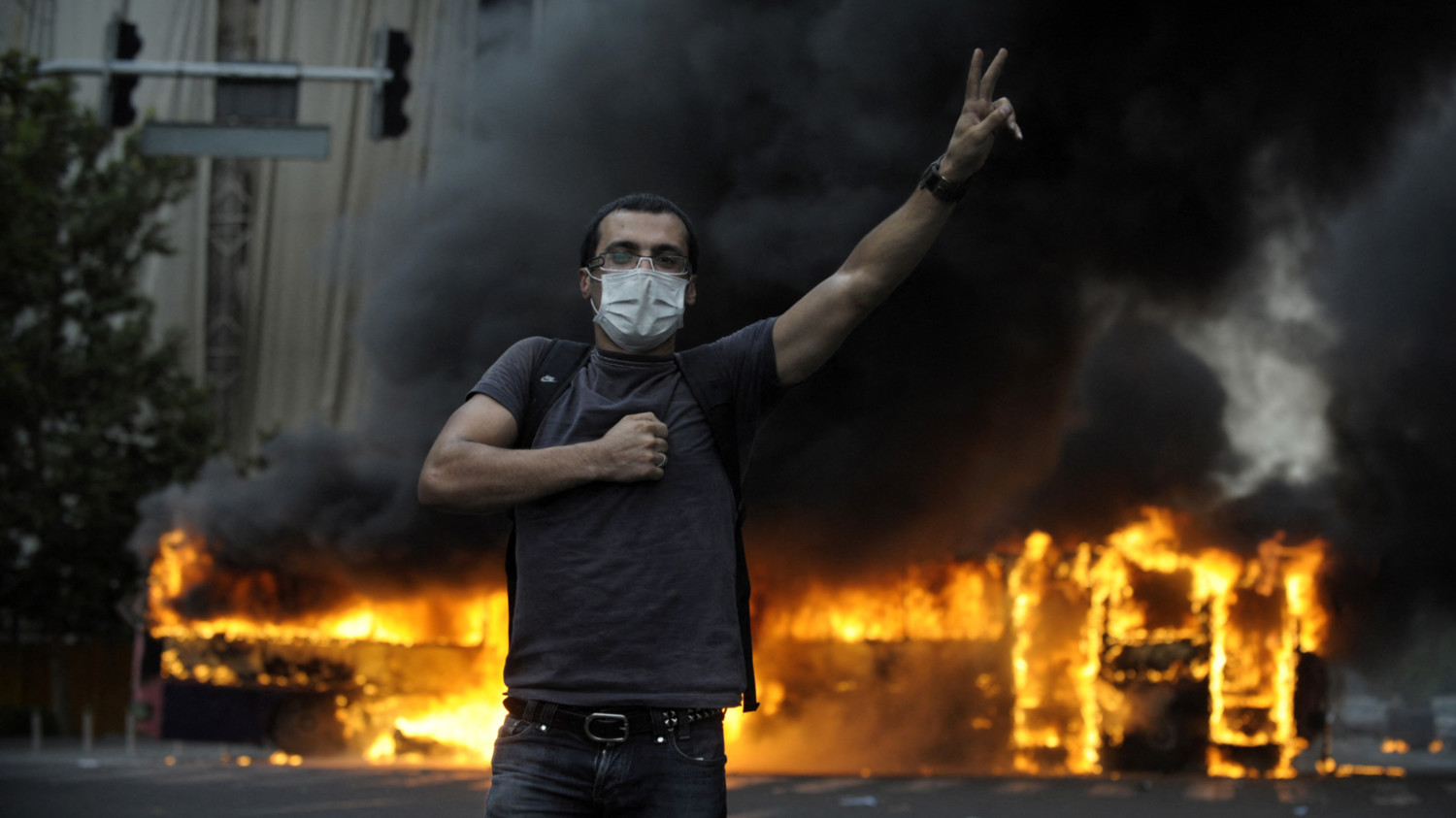
Nowhere was this more apparent than following the disputed 2009 presidential elections, when Ahmadinejad controversially secured a second term with Khamenei’s support. The ayatollah's authority was challenged by popular protests in support of defeated candidates, Mir-Hossein Mousavi and Mehdi Karroubi, and the rise of the Green Movement.
The demonstrations marked some of the most open displays of dissent against the Islamic Republic’s rulers since the early years of the revolution. Lesser demonstrations, against economic conditions, took place in 2017 and 2019.
The most recent widespread signs of discontent in Iran during Khamenei’s reign began in autumn 2022, after Mahsa Amini, 22, died from her injuries after being detained by the "morality police" for allegedly wearing her headscarf "improperly".
Widespread protests followed, both at Amini’s funeral and subsequently, lasting several months and resulting in the deaths of hundreds of people. At times, some demonstrators called for Khamenei to go.
In October 2022, Khamenei argued that the protests were not about the death of Amini or wearing of the hijab but the involvement of foreign governments. “It is about Islamic Iran’s independence, resistance, strength, and power," he said. "That is what this is about.”
Iranian electoral politics swung back towards a more moderate outlook when Hassan Rouhani became president in 2013.
Khamenei reasserted his authority against his president, but also gave his consent for Rouhani to pursue a more pragmatic foreign policy.
Much of this focused on the attempts of foreign powers to stall Iran’s nuclear ambitions, an especial cause of tension between Tehran and Washington which had resulted in crippling economic sanctions against Iran for much of the past decade.
Khamenei initially allowed Rouhani and his negotiating team considerable power: as secretary of the Supreme National Security Council, he had led nuclear talks with key EU powers between 2003 and 2005.
Discussions eventually came to fruition with the Joint Comprehensive Plan of Action in 2015. One year later, sanctions were lifted.
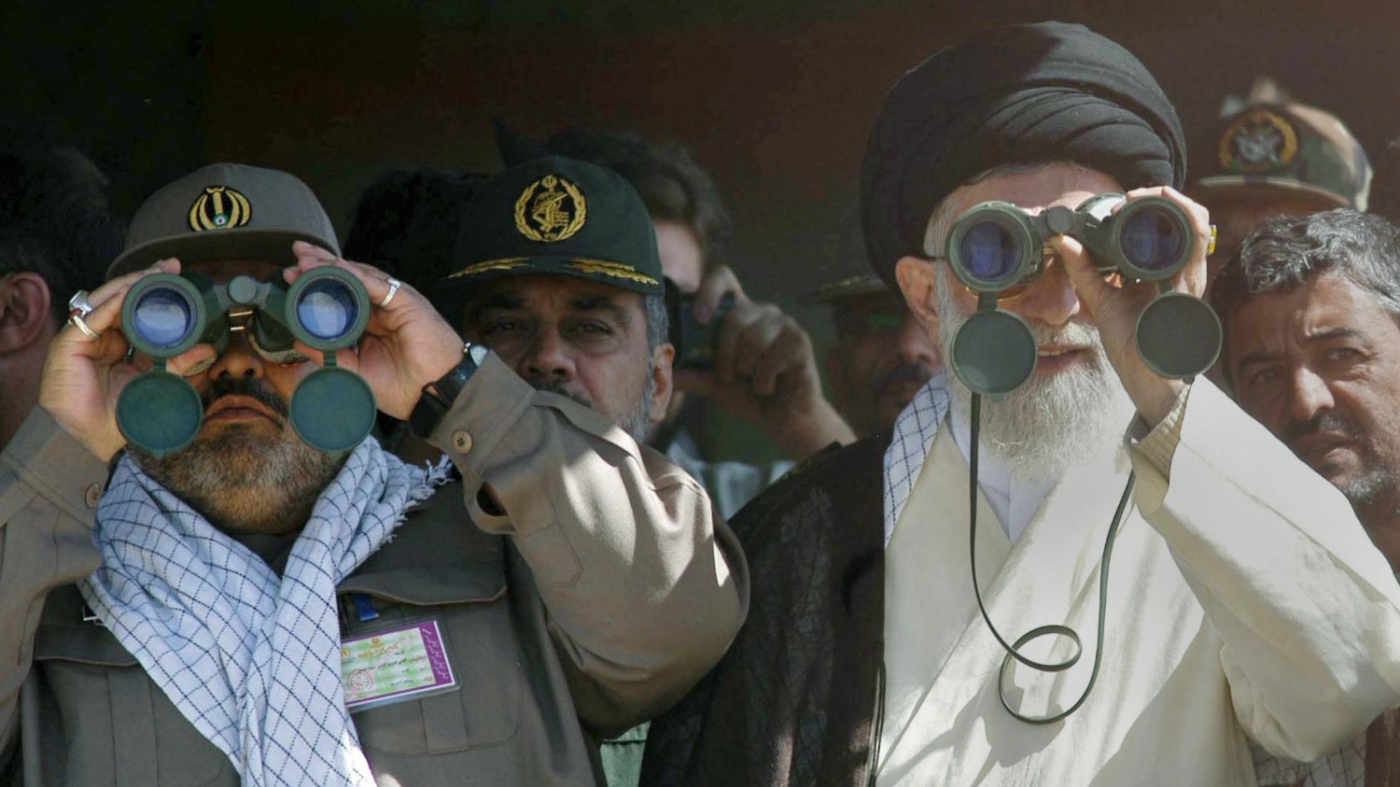
Khamenei cited the need to demonstrate “heroic flexibility” in the negotiations. At the same time, he imposed strict limits on Iranian concessions to world powers in the agreement. Later, he accused the US of reneging on its commitments, saying: “The nuclear deal, as an experience, once again proved the pointlessness of negotiating with the Americans, their bad promises and the need not to trust America’s promises.”
US President Donald Trump’s subsequent violation of the deal in 2018 was seen by Khamenei as proof that the US could not be trusted, and set the stage for a sharp downturn in Iran’s relations with the US and some of its key allies in the region.
Despite offering conditional support for a return to the JCPOA, talks aimed at reviving the deal under the presidency of Joe Biden have been put on ice since 2022.
Multiple conflicts have destabilised the Middle East during the past decade, most notably in Syria, a key Iranian ally, where Iran-aligned groups have had a key role in enabling President Bashar al-Assad to restore control over most of the country.
For Khamenei, the Arab uprisings of 2011 were a chance to invoke an “Islamic Awakening” across the region, for which Iran could act as a potential model of Islamic government.
But the ensuing conflicts that resulted exacerbated long-standing geopolitical rivalries, none more so than between Iran and Saudi Arabia. Up until their 2023 rapprochement, the kingdom was regularly chided by Khamenei for its culpability in regional conflicts, its close relations with the US, and more recently its increasingly open convergence with Israeli interests.
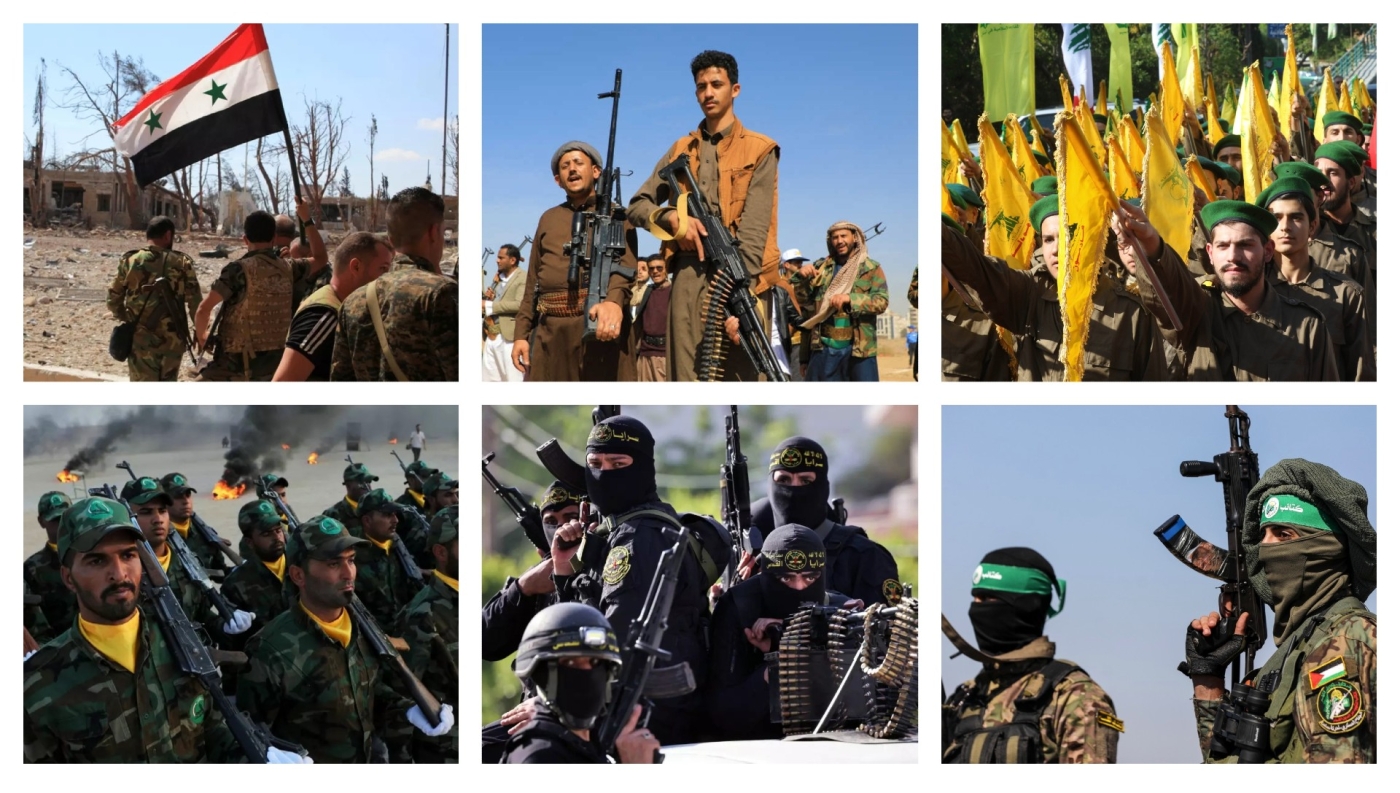
Khamenei viewed many contemporary developments as due to perceived anti-Iranian forces, as illustrated by the emergence of the Islamic State (IS) group as a significant existential security threat to Iran.
In recent decades, Khamenei has established Iran as the hub of the Axis of Resistance, using the military nous and operational expertise of its elite Quds Force under the leadership of the assassinated Qassem Soleimani to enhance its strategic depth and counter threats against the Islamic Republic.
Khamenei has established Iran as the hub of the Axis of Resistance, using the military nous and operational expertise of its elite Quds Force
The axis has drawn in allies at state and sub-state levels from across the region, all of whom share Khamenei’s worldview of an independent region expunged of US forces.
"The policies of America in the region are 180 degrees apart from the policies of the Islamic Republic," he said in 2015.
Iran's conception of the axis includes Syria, Hezbollah in Lebanon, allied factions of the Iraqi Popular Mobilisation Forces and Yemen's Houthi movement. Palestinian groups, including Hamas, Islamic Jihad and the Popular Front for the Liberation of Palestine are also seen as key members.
It is this project that perhaps will be seen as one of Khamenei’s most significant legacies, and one that has already left an indelible mark on regional politics.
Iran-Israel relations have been contentious since the founding of the Islamic Republic, with Khomeini declaring the last Friday of Ramadan as “Qods Day”, a pro-Palestinian day, reflecting his opposition to recognition of Israel’s legitimacy as a state.
Iran’s support for the Palestinian cause has been a long-standing feature of its foreign policy, forming a regular theme in Khamenei’s pronouncements on Iran’s international relations.
For the broader Axis of Resistance, Palestine-Israel remains a central focus, acting as the key element in its “unification of arenas” concept, whereby Iran and its allies have begun to foster ever-closer coordination in their confrontation with Tel Aviv.
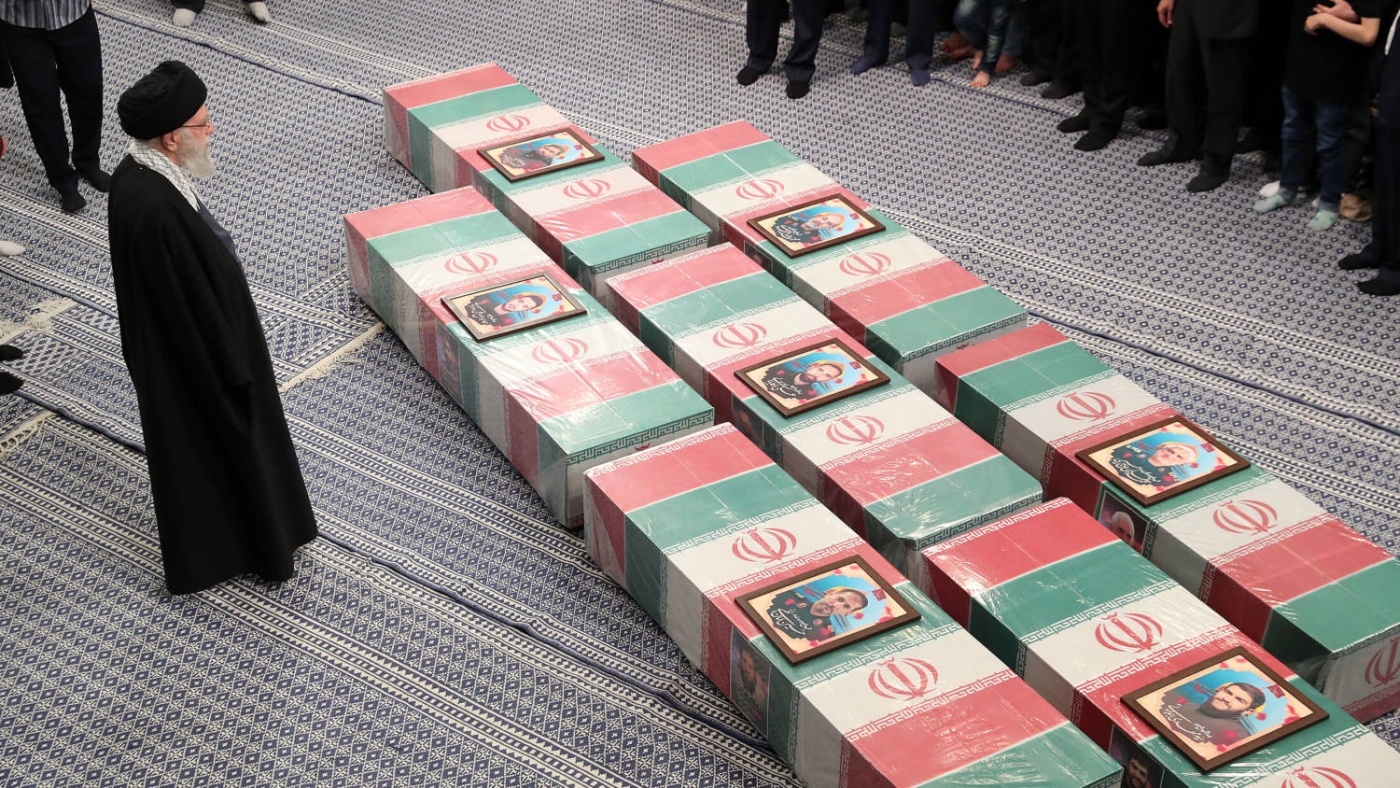
Israel and Iran have been involved in an escalating shadow war for many years. Israel has regularly targeted Iran and allied figures in Syria and Lebanon, as well as being responsible for a number of attacks on Iran’s nuclear programme.
Up until April 2024, Iran had largely followed a policy of what it termed “strategic patience” in response to the targeting of its interests, and continued to avoid direct confrontation with Israel, given its ongoing assault on Gaza.
However, the launch of several hundred drones and missiles against Israel on 13 April, in response to its bombing of Iranian diplomatic premises in Damascus on 1 April, marked a “new equation” in Iran’s approach to its nuclear armed rival.
Given Khamenei’s age, speculation is naturally rife around who might become his successor.
Some point to a possible dynastic succession involving his son, Mojtaba, while others have cited President Ebrahim Raisi as a potential candidate.
It seems most likely that Khamenei’s successor will come from the harder end of the conservative camp
With reformist and even pragmatic conservative voices increasingly sidelined in Iranian politics, it seems most likely at present that Khamenei’s successor will come from the harder end of the conservative camp, although the appeal of more unifying candidates being involved in the process cannot be discounted.
Whatever happens, the role of the Islamic Revolutionary Guard Corps (IRGC) will be key, given the huge political and economic power it wields. It is no surprise that one of Khamenei’s key achievements has been the role that he has permitted the IRGC to assume for itself in Iran’s domestic politics and foreign policy.
Regionally, the IRGC has been the primary actor in reinforcing and expanding Iran’s strategic depth, playing a major role in shoring up its national security, while entrenching its position domestically.
As such, Khamenei has overseen the development of an ever deepening security apparatus at home. While he has been perhaps the key figure in ensuring the Islamic Republic endures, the tensions between those who seek to challenge the totality of its rule through greater freedoms, and those who wish to guard it, will continue to shape Iranian political and social life under any successor.


Tech giant Google fired dozens of employees on Thursday who took part in protests at the company's US offices against its controversial cloud-computing and AI contract with the Israeli government and army.
Google said it fired the 28 staff members because they were "physically impeding other employees' work" as they held sit-ins at Google Cloud CEO Thomas Kurian's office in Sunnyvale, California, and Google offices in New York City.
"A small number of employee protesters entered and disrupted a few of our locations," Google said in a statement.
"Physically impeding other employees' work and preventing them from accessing our facilities is a clear violation of our policies, and completely unacceptable behavior.
"After refusing multiple requests to leave the premises, law enforcement was engaged to remove them to ensure office safety," it added.
In a statement on Medium, Google workers affiliated with the No Tech for Apartheid campaign, which organised the protests, called it a "flagrant act of retaliation" and said that some employees who did not directly participate in Tuesday’s protests were also among those that Google fired.
"Google workers have the right to peacefully protest about terms and conditions of our labor," the statement said.
The employees had specifically hit out at Project Nimbus, a $1.2bn agreement for Google and Amazon to supply Israel and its military with cloud computing and AI services.
The project, announced in 2021 by Google and Amazon, provides advanced artificial intelligence and machine learning capabilities to Israel’s government.

Since then it has sparked backlash among some Google workers who have condemned Israel’s treatment of Palestinians. That criticism has resurfaced amid Israel’s war on Gaza, which has killed over 33,000 Palestinians, mainly women and children.
"Google execs basically chose to arrest workers for speaking out against the use of our technology to power the first AI-powered genocide," Google software engineer Mohammad Khatami, one of the protestors arrested in New York, told Democracy Now.
In its statement, Google maintained that the Nimbus contract "is not directed at highly sensitive, classified, or military workloads relevant to weapons or intelligence services".
Protests at Google are not new. In March, Google fired an employee who shouted, “I refuse to build technology that empowers Genocide” during a presentation in New York City by Barak Regev, Google’s Israel managing director.
And in December, Google staff members and No Tech for Apartheid held a vigil in London for software engineer, Mai Ubeid, who was a graduate of the Google-funded coding boot camp, Gaza Sky Geeks, and in 2020 was part of the Google for Startups accelerator programme.
Ubeid was killed on 31 October along with her entire family in an air strike during Israel's war on Gaza.
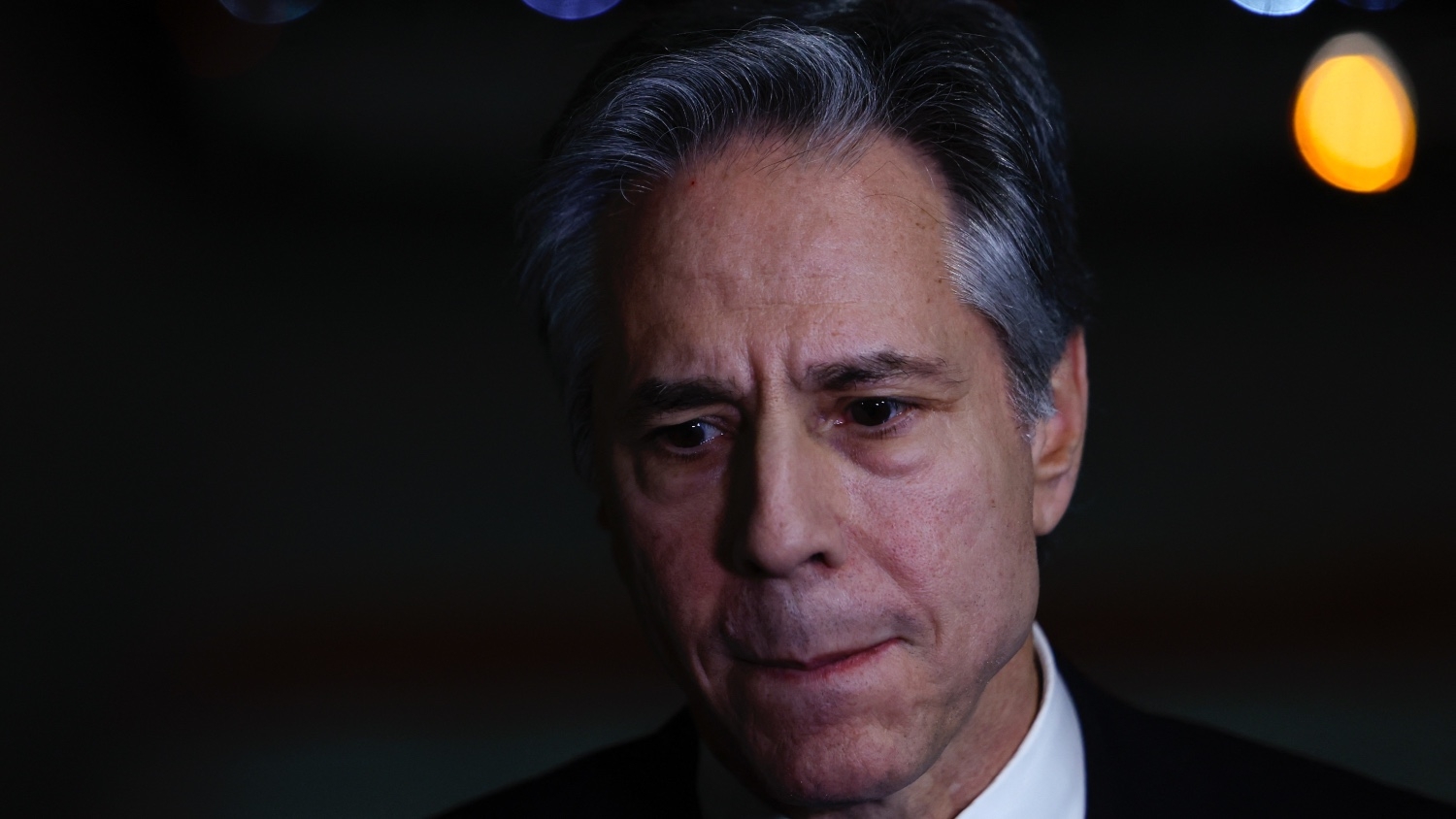
US Secretary of State Antony Blinken has ignored recommendations from a special State Department panel to suspend assistance to Israeli military and police units, after those units were being probed for alleged human rights abuses against Palestinians, according to a report by ProPublica citing several current and former US officials.
The report stated that in several incidents where this panel had reviewed cases of human rights abuses committed by Israeli forces, including extrajudicial killings by police; the gagging and handcuffing of an elderly Palestinian-American man who later died; and an allegation that Israeli interrogators tortured and raped a teenager.
The review of those incidents was obtained by ProPublica and did not include which incidents led to a recommendation of sanctions.
The task force, known as the Israel Leahy Vetting Forum, is made up of Middle East and human rights experts and is named after former Senator Patrick Leahy, who authored the Leahy Laws. Those laws require Washington to cut off assistance to any foreign military or law enforcement units accused of flagrant human rights violations.
According to ProPublica, the recommendations for actions against certain Israeli security units were sent to Blinken in December.
“They’ve been sitting in his briefcase since then,” one US official told the news site.
A State Department spokesperson told ProPublica that the department "takes its commitment to uphold US human rights laws seriously".
"This process is one that demands a careful and full review," the spokesperson said, "and the department undergoes a fact-specific investigation applying the same standards and procedures regardless of the country in question."
The incidents reviewed by the news site took place prior to Israel's war on Gaza, which began in October in response to Hamas-led attacks on southern Israel that killed 1,200 people and took more than 200 people hostage.
Israel launched a full-scale war on the besieged enclave of Gaza, imposing an aerial bombing campaign followed by a ground invasion that has levelled much of Gaza's civilian infrastructure.
Israeli forces have killed more than 33,000 Palestinians, most of whom are women and children, and have targeted schools, UN shelters, mosques, and hospitals.
The Biden administration's response to the war has been to provide Israel with diplomatic and military cover by fast-tracking arms shipments and blocking UN resolutions for a ceasefire in Gaza.
In recent weeks, particularly in response to Israel's killing of several foreign aid workers with the international charity, World Central Kitchen, Democratic lawmakers in the US have called for suspending arms sales to Israel.
US President Joe Biden has signalled some criticisms of Israel, however, the administration has continued to fall short of making any conclusions that Israel is in violation of international law.
This week, more than two dozen Democratic lawmakers called on the administration to provide proof that Israel was not in violation of international law in its military conduct in Gaza.
Officials told ProPublica that even if Blinken approved the sanctions, Israel could mitigate their impact by buying American weapons with their own funds and then providing their sanctioned units with them.
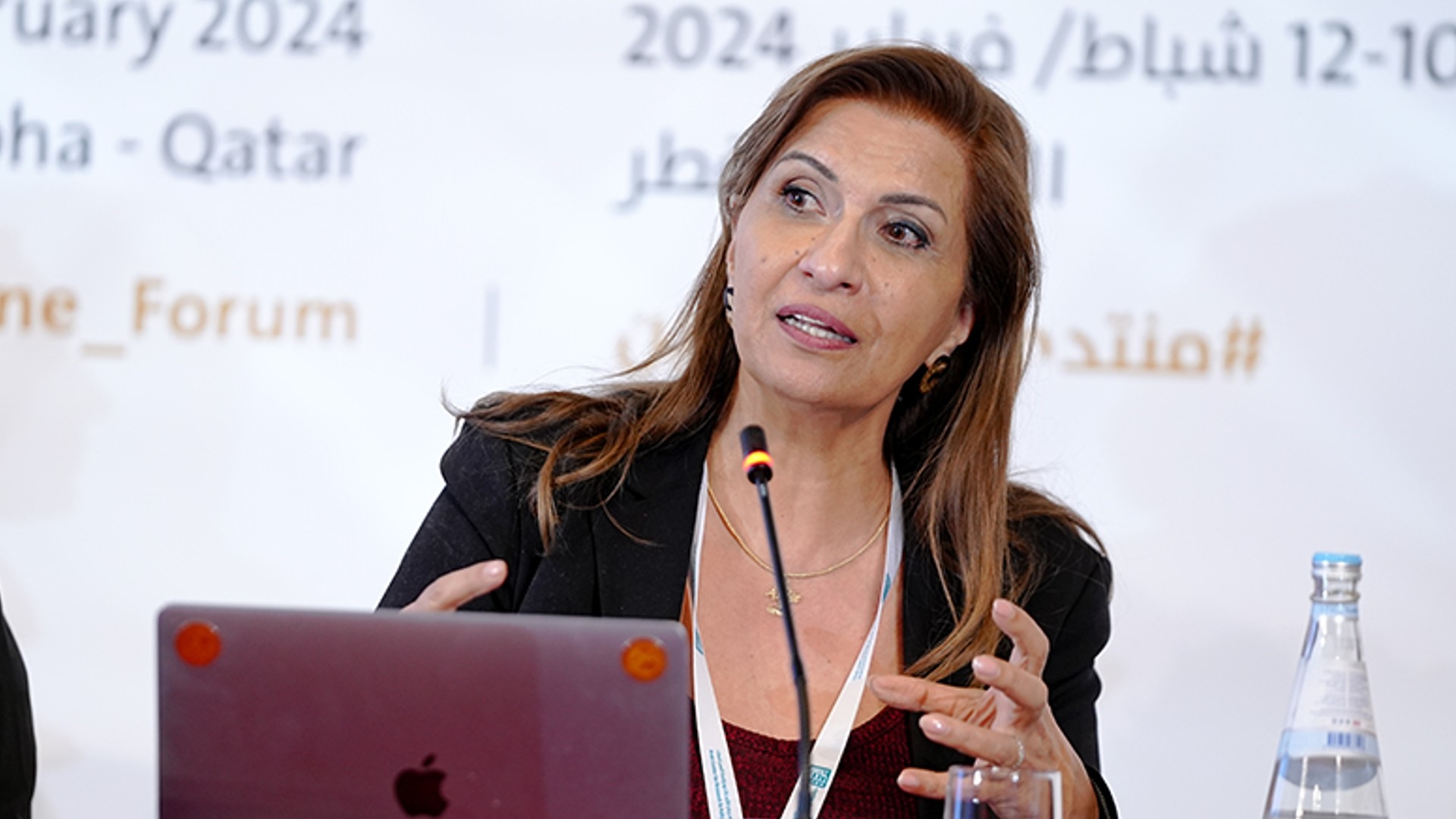
A prominent Palestinian academic already suspended from her university position over anti-Zionist comments has been arrested on "suspicion of incitement".
According to Israeli media, Nadera Shalhoub-Kevorkian has been arrested for questioning by Israeli police, who will then determine whether she should be held in custody or released.
Shalhoub-Kevorkian is a professor at the Hebrew University of Jerusalem, which suspended her last month after she called for "abolishing Zionism" and suggested that accounts of sexual assault during the Hamas-led 7 October attacks on Israel were a "lie".
Shalhoub-Kevorkian is also a chair in global law at Queen Mary University of London in the UK.
Israeli police reportedly asked the prosecutor's office at the beginning of April to approve the opening of a criminal investigation against the scholar on suspicion of incitement.
The Hebrew University's move to suspend Shalhoub-Kevorkian, whose work focuses on trauma, state crimes, gender, surveillance and genocide, was widely criticised online, with commentators accusing the university of cracking down on criticism of Israel's actions.
Jamil Dakwar, director of the American Civil Liberties Union's (ACLU) human rights programme, described the suspension as "another blow to academic freedom in Israel".
Eventually the university reversed its decision following an apology from the professor, as well as an admission that sexual assault took place on 7 October.
Shalhoub-Kevorkian's arrest brought both praise and condemnation in Israel.
Elhanan Fellheimer, chair of the National Union of Israeli Students, said he hoped the "arrest will mark a new way of handling the whole issue of incitement in academia and incitement against Israel in general".
Ofer Cassif, an MP for the left-wing Hadash party, compared the arrest to that of a "dictatorial regime".
Adalah, an advocacy group which campaigns for the rights of Palestinians in Israel, said: “The arrest of Professor Shalhoub-Kevorkian is an egregious violation of her rights, motivated by an agenda of incitement, political persecution, and racism.
"Her opinions and speech are protected under the right of freedom of expression and academic freedom. The decision of the State Attorney’s Office to pursue an investigation against her flagrantly violates her right to freedom of expression, contradicts the rule of law, and appears to be unduly influenced by the radical right-wing."
Since the outbreak of war last year, scores of Palestinian citizens of Israel have been arrested in connection with social media posts expressing solidarity with victims of Israeli bombardment in Gaza.
Middle East Eye reported in October that Palestinian students in Israel suspected of harbouring sympathies for the residents of Gaza, or opinions critical of Israeli policy, were being reported to their faculties and, in many cases, suspended.
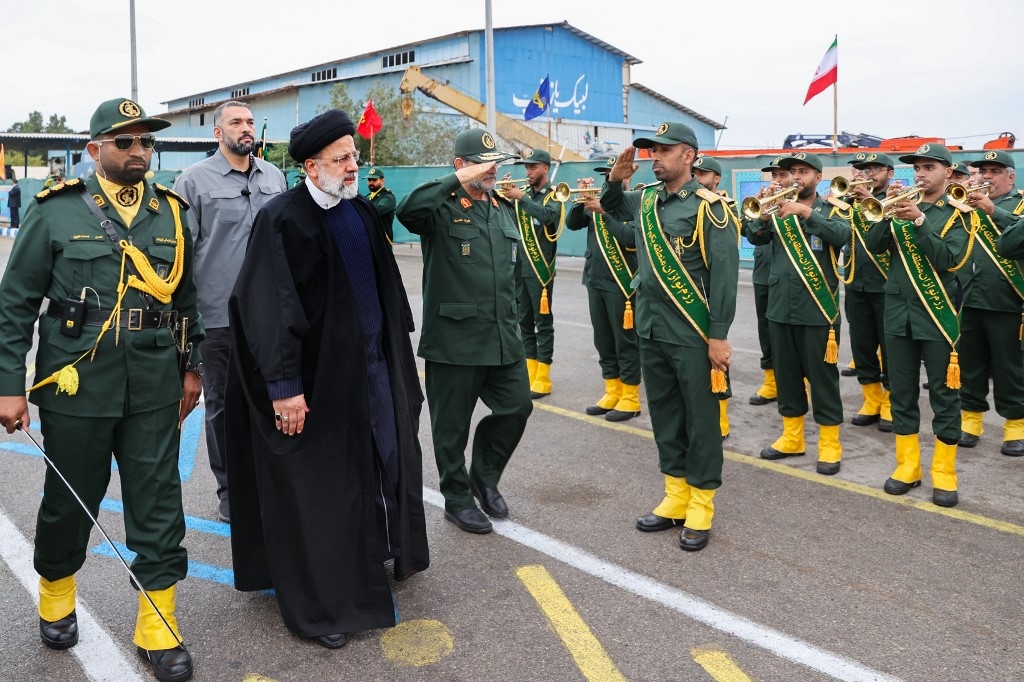
British parliamentarians on Thursday urged Prime Minister Rishi Sunak to proscribe Iran's Islamic Revolutionary Guards Corp (IRGC) in the wake of the country's attack on Israel.
In a letter from the All Party UK-Israel Parliamentary Group signed by MPS and members of the House of Lords, Sunak was called on to proscribe the organisation, which they said was responsible for "destructive terror" in the Middle East and beyond.
"The IRGC has never posed a greater threat than it does within the UK. A range of their activities have been publicly disclosed, causing significant concern across our nation," said the letter.
"These include assassination plots uncovered and foiled by MI5, intelligence gathering on British-Jewish targets by UK-based criminal networks, intimidation of journalists including Iranian journalists, and radicalisation in British Islamic centres," it added.
The signatories also linked the IRGC to the Hamas-led 7 October attacks in southern Israel which left at least 1,163 people dead, saying they were carried out by "proxies" of the organisation.
"The government has rightly proscribed Hamas and Hezbollah terror groups which have been an essential step in combatting extremism and terrorism here in the UK, but it is not enough," said the letter.
"Given that the IRGC is the primary source of ideological radicalisation, funding, equipment, and training for these dangerous groups, it is the responsibility of the government to act against the root cause as well."
On Saturday, Iran launched an attack against Israel consisting of around 170 drones, 30 cruise missiles and 120 ballistic missiles, according to Israeli officials.
The attack was in response to a 1 April air strike on Iran's consulate building in Damascus, Syria, which killed several people including three top Iranian military commanders.
A small number of ballistic missiles got through Israel’s defences, hitting the Nevatim airbase in southern Israel.
A young Palestinian Bedouin girl was critically wounded when shrapnel from an intercepted ballistic missile hit her family home near Arad, in the southern Negev region.
The drones and missiles were intercepted by Israel, the US, the UK, France and Jordan.
On Thursday, the US and UK said they had imposed new sanctions on Iran.
The US Treasury department said the measures targeted 16 individuals and two entities enabling Iran’s unarmed aerial vehicle (UAV) production.
That included targeting engine types that power Iran’s Shahed variant UAVs, which were used in the 13 April attack, as well as five companies providing component materials to Iran’s Khuzestan Steel Company (KSC), one of the country's largest steel producers.
Meanwhile, Britain imposed sanctions targeting Iranian military organisations, individuals and entities involved in in the UAV and ballistic missile industries.
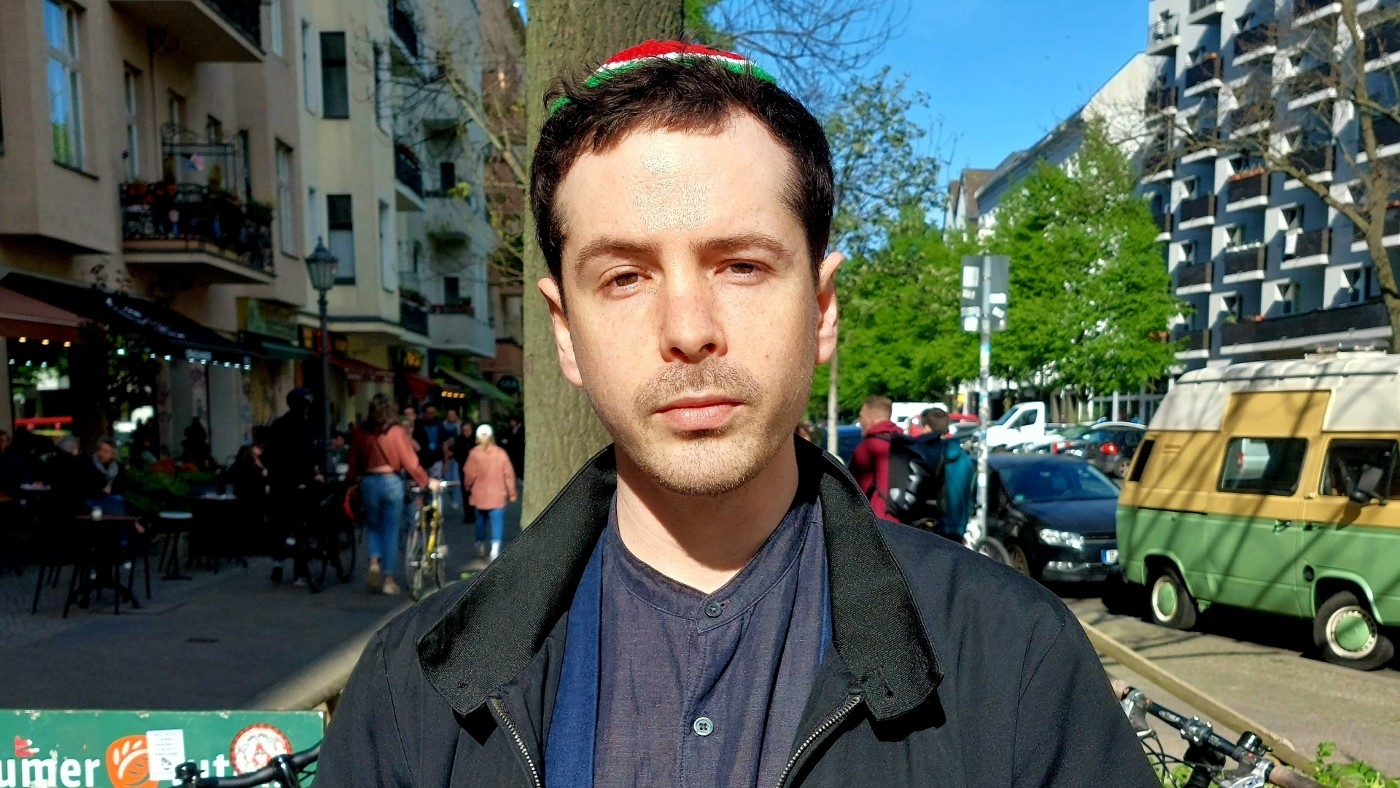
“Germany is promoting only those Jews who are willing to produce anti-Muslim discourse. Jews who do not perceive Muslims as such are being marked as a threat not just to the German nation but to Jews themselves.”
Udi Raz, 34, is sitting in a cafe in Berlin, where he lives, reflecting on a turbulent six months. Since Israel’s war on Gaza began following the Hamas-led attacks of 7 October, Raz, an Israeli Jew raised in Haifa, has been fired from his job and had the activist group he’s part of labelled antisemitic by Germany’s official antisemitism commissioner.
Last Friday, German authorities arrested Raz, a board member of Jewish Voice for a Just Peace in the Middle East, after they cancelled and then banned the group’s three-day conference on Palestine.
The conference, which was set to feature notable speakers including former Greek finance minister Yanis Varoufakis and leading British-Palestinian surgeon Ghassan Abu-Sittah, was cancelled by Berlin police within its first two hours on Friday.
“They came in and blocked the screening of a recorded video message, then they broke into the control room and switched off the electricity for the whole building with hundreds of people inside,” Raz told Middle East Eye.
The recorded video message was from Abu-Sittah, who had been detained after landing in Germany. The doctor told MEE that, in a basement room in Berlin’s airport, he was questioned for three and a half hours.
At the end of the interrogation, Abu-Sittah, who spent 43 days during the war treating patients in Gaza’s al-Ahli and al-Shifa hospitals, was told by German authorities that he was not allowed on German soil, that this ban would last for the whole of April and that if he tried to dial into the conference remotely – or send a video message to be played at it – that would constitute a breach in German law that could see him face up to a year in prison.
In an exclusive interview with Middle East Eye, Ghassan Abu Sittah, a British-Palestinian doctor who has become known for his work in Gaza, detailed how he was detained at an airport in Germany and subsequently denied entry. Abu Sittah wanted to attend a conference where he would… pic.twitter.com/UTTgsWIXpO
— Middle East Eye (@MiddleEastEye) April 12, 2024
Nadija Samour, a lawyer involved with the conference, said organisers had not been “given anything in writing about why the event was being cancelled. We had been cooperating with the police through everything, nothing said or done at the venue was illegal. From the very beginning, it was clear that there would be attempts by the police to shut the conference down."
“A speaker was projected who was subject to a ban on political activity,” Berlin police said on social media after closing the conference down.
In the last six months, German authorities have continued to crack down on the Palestine solidarity movement in Germany, including silencing several high-profile Jewish intellectuals, academics and artists.
The country’s responsibility for the Holocaust, in which six million Jews were murdered by Germany’s Nazi government, and its post-war “staatsrason”, or reason of state, a principle that places support for Israel at the core of Germany's national identity, have contributed to an atmosphere in which even Jews are now regularly branded antisemitic for criticising Israel.
'I was allowed to speak only to the extent that I had something bad to say about Palestinians, about Arabs, about Muslims'
- Udi Raz, Jewish activist
Raz, who is a leading Jewish peace activist in Berlin, has been twice detained, labelled an antisemite, lost his job, and his organisation has had its bank account frozen, as well as being branded antisemitic by Germany’s antisemitism commissioner.
The Israeli says there were clear signs that authorities in Berlin would try and shut down the event.
“The Berlin Senate had been trying for the past few weeks to stop the Palestine Congress from going forward - one of the strategies they used was to freeze our bank account. For weeks, we had been collecting donations and tickets receipts for the Palestine Congress. We still dont have access to those funds.”
Raz says that Jewish Voice for a Just Peace is constantly reminding Germans of the structural inequalities and the genocide being carried out in Palestine.
“We want everyone to be treated equally, we want human rights and international law to be respected. That makes the German state very uncomfortable; they are OK with the apartheid regime and its genocidal crimes,” he says.
Jewish Voice for a Just Peace has been campaigning for an immediate end to hostilities in Gaza and demanding that the German government suspend diplomatic, economic support and weapons sales to Israel.
Raz told MEE that he feels there exists a clear disparity in the treatment of pro-Zionist and anti-Zionist Jews in Germany.
“Whenever I had the opportunity to speak from my own perspective, I was allowed to speak only to the extent that I had something bad to say about Palestinians, about Arabs, about Muslims. Whenever that was not the case, and I brought up the Palestinian narrative, insititutions were pointing at me and accusing me of antisemitism.”
Previously a tour guide at the Jewish Museum in Berlin, Raz was fired for referring to Israel’s occupation of the West Bank as “apartheid” on tours.
Since 7 October, several Jewish groups, academics, artists and human rights activists – including Israelis like Berlinale-winning journalist Yuval Abraham, who was branded an antisemite in Germany - have called out Germany for suppressing any criticism of Israel's war in Gaza and the Palestine solidarity movement in the country.
Last week, a leading Jewish American philosopher, Nancy Fraser, was disinvited from taking up a professorship at the University of Cologne after signing a letter expressing solidarity with Palestinians and condemning the killings in Gaza carried out by Israeli forces.
In December, Russian-American journalist Masha Gessen was at the centre of a similar controversy after official German sponsors removed their support for the Hannah Arendt Prize – which was being awarded to Gessen – because of a New Yorker article in which which the Jewish writer drew a comparison between conditions in Gaza today and the Warsaw Ghetto.
Raz told MEE that while growing up in Haifa, he was aware of two distinct realities that existed in that region between the Jewish and Palestinian population.
“I did not feel comfortable there. For me, the act of emigrating from Israel and landing in Germany was an act of finding my own home, where everyone was equal and human rights were respected.”
'If you are a conscientious Jew, not willing to support a genocide in your name and wanting to speak out against it, you will be persecuted in Germany'
- Udi Raz, Jewish activist
Soon after moving to Berlin in 2010, Raz says, he felt that he was being celebrated by cultural institutions and politicians because of his Jewish heritage.
“However, I did soon realise that, while in Germany my Jewishness was being celebrated, I felt like a second-class citizen, so I found more in common with other minority religious groups.”
He adds that while he did feel excluded, he was constantly reminded that being an Israeli Jew he had easier access to higher social standing in German society because he embodied a “superior” white western European heritage.
“Today, Jews in Germany are being divided along political lines: if you are a conscientious Jew, not willing to support a genocide in your name and wanting to speak out against it, you will be persecuted in this country, and if you are happy with the hate and the genocide being carried out then you can live in peace and enjoy your privilege,” he says.
When asked about the future, Raz draws on his family’s history and suggests quietly that his days in Germany might be numbered, while firing off a warning to Jews wanting to settle here.
“My grandparents lived in Lithuania before the Second World War. I often ask myself that, as the Nazis marched into Lithuania, at what point did my grandparents decide that it’s time to leave, and then eventually at what point in time did they realised that it's perhaps too late to leave?”
His head hanging down, Raz says, with a defeated look, that space for Jews in Germany to express their political opinions safely and openly is shrinking.
“All this is happening under a Social Democrat government; you can only imagine what will happen when the far-right AfD comes to power.
“My request to all my Jewish brothers and sisters is that, if you are considering moving to Germany, think twice.”
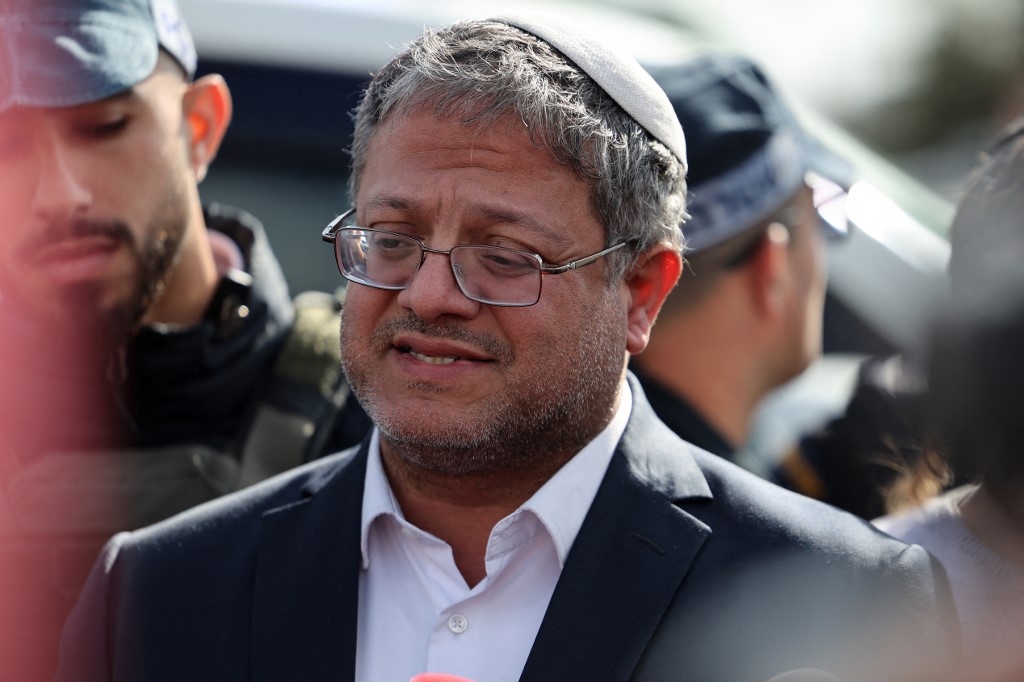
Itamar Ben Gvir, Israel's far-right national security minister, has called for the execution of Palestinian prisoners to ease overcrowding in the country's jails.
Writing on social media, he welcomed a decision by the Israeli army to build 936 additional prison places for "security prisoners".
"The additional construction will allow the prison service to take in more terrorists, and will bring a partial solution to the prison crisis that exists in the Shabak," he said, referring to the Israeli Prison Service.
"The death penalty for terrorists is the right solution to the incarceration problem, until then - glad that the government approved the proposal I brought."
In a statement on Wednesday marking Palestinian Prisoners' Day, the Gaza media office said over 5,000 Palestinians had been arrested by Israeli forces during their current war on Gaza, which started on 7 October.
The office also said that Palestinian prisoners were undergoing "the worst kinds of torture" in Israeli jails, and asked the international community to intervene.
The Israeli Public Defender's Office in February published a report stating that some Israeli prisons have been declared to be in a state of emergency due to severe overcrowding.
During a visit by members of the Public Defender’s Office, squalid conditions were noted, including "intolerable overcrowding", with less than three square metres of space per person, poor sanitary conditions, pest issues, inadequate ventilation, and a lack of basic necessities for the incarcerated.
The report said that the overcrowding has caused people stress and anxiety, which can at times cause unnecessary friction in cells.
A statement from the Public Defender’s Office said that it had witnessed an “unprecedented prison crisis, in which detainees and prisoners were crowded into inhumane living spaces”.
It added that almost half of the incarcerated in Israel are held in harsh conditions that do not meet the High Court’s "first step" of living space, which states that they are to be held in an area of no less than three square metres.
Thousands have also been detained in the occupied West Bank since 7 October.
Palestinian rights group Addameer said on Wednesday that Israel was holding 9,500 Palestinian political prisoners, not including those taken from Gaza.
"The date of October 7 marked a significant turning point that imposed radical transformations on the reality of prisoners and detainees in Israeli occupation prisons," said the group in a statement.
"This was reflected across all dimensions related to this issue, in light of the comprehensive aggression against our people and their detainees, and the ongoing genocide against our people in Gaza for over six consecutive months."
Dozens gathered to protest in the West Bank city of Ramallah on Wednesday to mark Palestinian Prisoners' Day, with some demonstrators calling for the release of their imprisoned relatives.
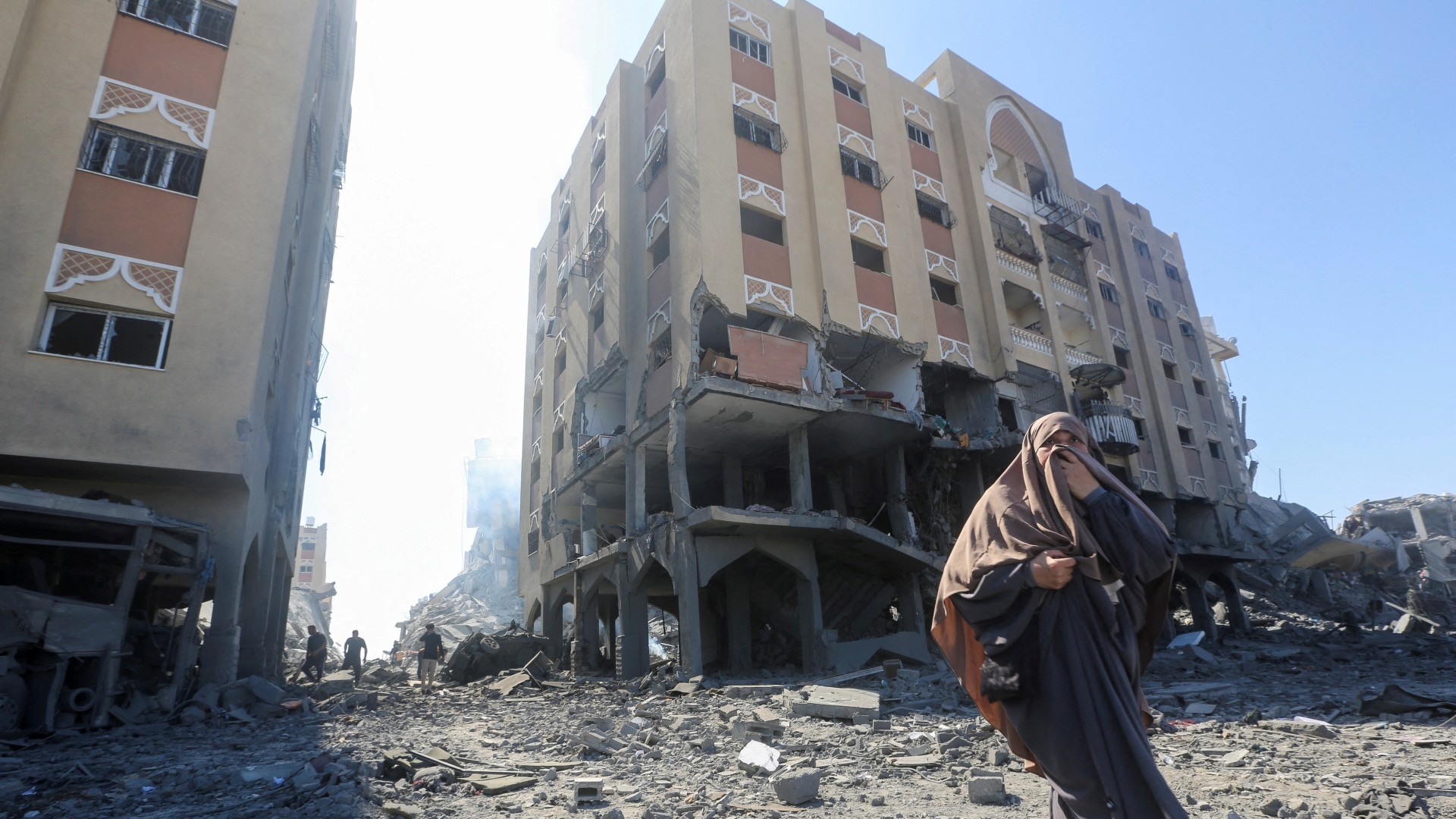
On paper, both sides in the US-led Gaza ceasefire talks in Cairo are working towards the same goals: a cessation of hostilities and the exchange of Israeli captives for Palestinian prisoners.
Yet, as Hamas sees it, the Palestinian movement and the Israelis are worlds apart.
The Israeli government, under domestic pressure, prioritises the release of people taken captive on 7 October.
Hamas, meanwhile, seeks not only a complete end to the war, but a future where Gaza is liberated from the blockade Israel has imposed on the coastal enclave for the past 16 years.
“The problem is, I think, that we have a strategy, and the strategy that we negotiate through is the strategy of a ceasefire, and not the strategy of a hostage exchange,” says Hamas official Basem Naim.
Middle East Eye has obtained the latest proposal passed by Hamas to Israel via Egyptian and Qatari mediators.
Like those presented to Hamas since a summit in Paris in January, it suggests winding down the war in three phases.
But whereas proposals given to Hamas have three truce periods that would, in theory, progress towards an end to the conflict, the Palestinian movement is seeking something more concrete.
'The Americans are not guarantors nor are they mediators. They are an oppositional player, they are an enemy'
- Basem Naim, Hamas official
In Hamas’s framework, phase one would see a “temporary cessation of hostilities” and the return of Palestinians to residential areas of northern Gaza.
The second phase would start with a permanent ceasefire taking effect and Israeli troops withdrawing from the Gaza Strip completely.
In phase three, Israel totally lifts the blockade it has imposed on Gaza since 2007 and a five-year reconstruction plan begins.
The document also suggests a framework for exchanging prisoners and says the guarantors of the agreement should include Turkey and Russia.
This, Naim says, is because the negotiations are tilted too much in Israel’s favour when led by the United States, which has heavily backed Israel during the war.
“At the end of the day, the Americans are not guarantors nor are they mediators. They are an oppositional player, they are an enemy,” he tells MEE.
Hamas says the Israelis should withdraw from densely populated areas in stages. First, the Israelis would head east of the al-Rasheed Road that runs down the coast, “allowing free movement of the local population”.
After 14 days, Israeli soldiers should then move east of the parallel Salah al-Din Road and deploy along Gaza’s boundary with Israel, so displaced Palestinians can reach other areas of the north.

In recent weeks, the Cairo talks have focused heavily on the return of displaced Palestinians to the north.
Israel’s latest proposal suggested allowing some of the 1.7 million displaced people, most of whom are in camps around southern Gaza’s Rafah, to resettle northwards.
That flexibility has been talked up by Washington, with US State Department spokesperson Matthew Millar saying on Monday: “There was a deal on the table that would achieve much of what Hamas claims it wants to achieve, and they have not taken that deal.”
Naim, though, says the deal fell short of what Hamas deems acceptable. It was a “conditional return”, he says, with those conditions set by Israel.
“On top of that, the people would not return to their homes, but they would move into designated areas that would be predetermined on maps by the occupation,” Naim says.
Israeli oversight over activities in Gaza is a sticking point.
Hamas says it wants United Nations agencies and international organisations to be able to carry out humanitarian aid operations immediately and unimpeded. That includes Unrwa, the UN agency for Palestinian refugees, which has been vilified by Israel and has lost at least 178 of its staff in Gaza to Israeli attacks.
The framework document also demands 60,000 prefabricated units and 200,000 tents to shelter the displaced, followed by reconstruction work overseen by the UN, Egypt and Qatar, and increased trade mobility.
Israel, according to Naim, insists on maintaining its strict controls on what enters Gaza, and this is a problem for Hamas.
“Even the aid, or anything that will come in for construction, would come in according to the conditions and restrictions of the occupation,” Naim says.
Israel says its strict regulations for goods entering Gaza are designed to avoid any potentially hazardous materials falling into Hamas hands, though aid agencies say arbitrary rules have badly impeded humanitarian relief. The UN human rights office has called the Israeli restrictions "unlawful".
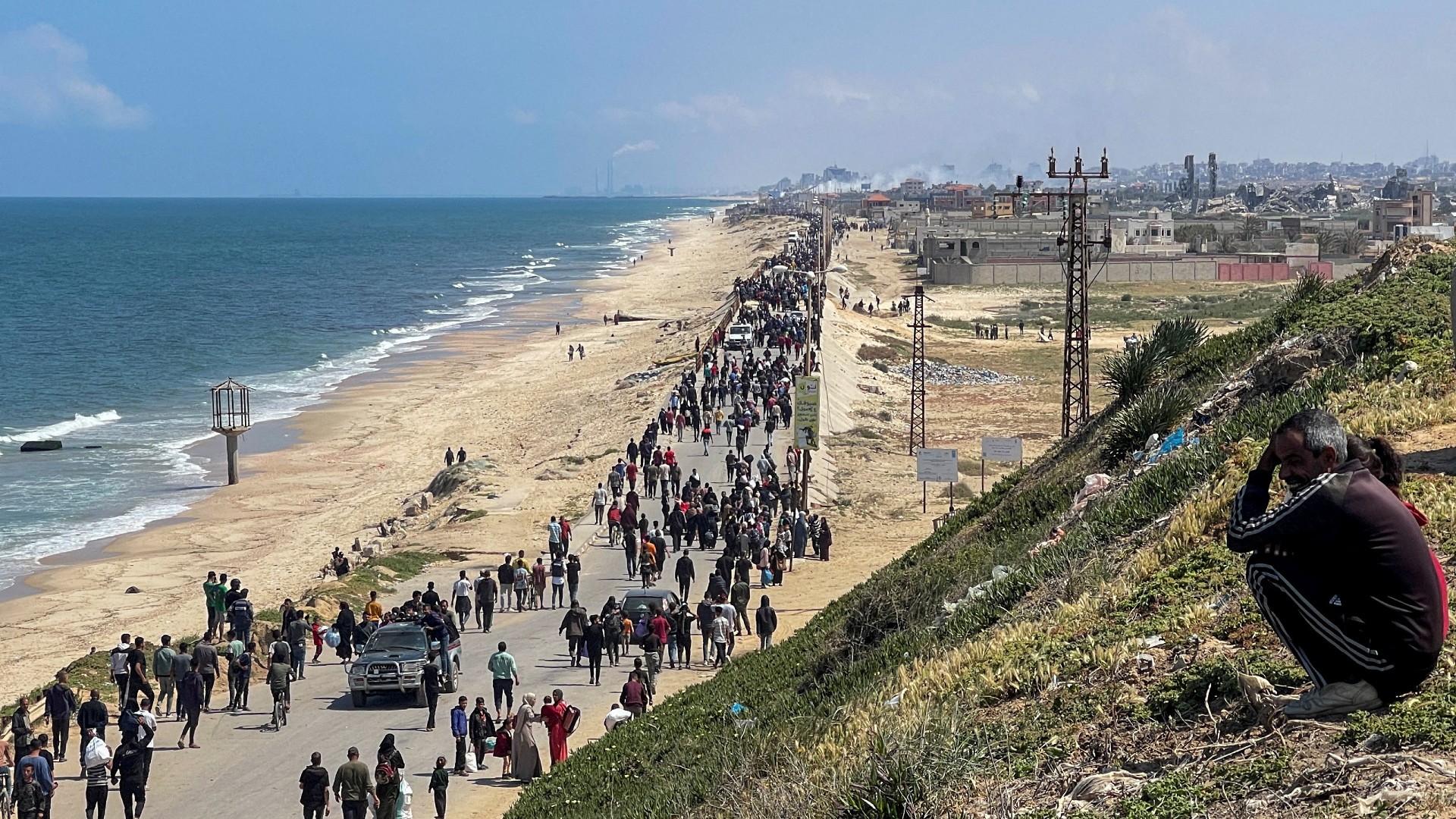
Then there is the prisoner exchange issue.
Of the 240 captives taken on 7 October, 133 people - Israeli soldiers and civilians, as well as 11 foreigners - remain captive in Gaza. Perhaps 50 of the missing Israelis are believed to be dead.
Palestinian rights group Addameer says Israel holds 9,500 Palestinian political prisoners.
Hamas proposes exchanges in the first two phases, and it has different demands depending on the type of captive.
'Israel absolutely won’t talk about a comprehensive, complete and permanent ceasefire'
– Sari Orabi, a Palestinian writer and researcher
Women, children under 19, the infirm, the elderly and female soldiers would be traded in phase one. Hamas suggests each Israeli would be traded for 30-50 Palestinian prisoners, depending on their value.
Male soldiers would be released in phase two for a number of Palestinians, the number to be specified at a later stage. The remains of the dead would be handed over in the third phase, in exchange for the corpses of Palestinians held by Israel.
Wary of Israel rearresting Palestinians, Hamas wants legal guarantees for the freed prisoners. Similarly, it wants everyone who Israel freed then rearrested following the 2011 Gilad Shalit exchange to be released. It also demands better conditions for Palestinian prisoners.
Though Israelis familiar with the talks have suggested to MEE that prisoner exchanges are the least problematic side of negotiations, a difficulty has arisen. Israel demands the immediate release of 40 captives, including all the women, sick and elderly, in return for hundreds of Palestinian prisoners. Yet Hamas says not enough people meeting that criteria are still alive, and refuses to release male soldiers in their place.
Sari Orabi, a Palestinian writer and researcher based in the occupied West Bank, expects Hamas and Israel to have serious difficulties as long as the Israelis are bent on continuing the war.
“Israel absolutely won’t talk about a comprehensive, complete and permanent ceasefire, the withdrawal of its forces from Gaza, alongside the lifting of the blockade and beginning the reconstruction,” he tells MEE.
“That is the main reason for the lack of ability to complete a deal.”
Hamas is in no rush to lose its leverage, particularly by releasing male soldiers.
And though popular pressure is building on Israeli Prime Minister Benjamin Netanyahu to free the captives, public opinion is firmly against ending the war.
A recent poll found Israelis overwhelmingly believe their government should not accept Hamas demands such as withdrawing from Gaza.
Orabi says there has been no “serious pressure” placed on Israel by the lead mediator in Cairo - namely the United States - and this has also played its part.
With Washington so clearly pro-Israeli, and Egypt and Qatar merely acting as interlocutors, there is an imbalance in the negotiations, Orabi adds.
“America is a partner in this war, therefore it manages the negotiations from an Israeli perspective and for Israeli interests.”

Qatar's prime minister has said the Gulf state is re-evaluating its role as mediator between Israel and Hamas, adding that Doha's efforts to secure a ceasefire and prisoner release deal were being undermined by politicians with "narrow interests".
Speaking on Wednesday, Sheikh Mohammed bin Abdulrahman Al Thani said he "lamented the political exploitation" of Doha's diplomacy by some politicians who were "marketing their electoral campaigns through the defamation of Qatar's role".
Whilst Sheikh Mohammed did not name the politicians, Israeli Prime Minister Benjamin Netanyahu has repeatedly criticised Qatar and recently threatened to shut down the local operations of Qatar-owned broadcaster Al Jazeera.
Sheikh Mohammed's comments also came days after Qatar's embassy in Washington denounced senior US Democratic lawmaker Steny Hoyer for threatening to "reevaluate" the US relationship with Doha over the inability of Hamas and Israel to reach a prisoner exchange deal.
"We share his (Hoyer's) frustration that Hamas and Israel have not reached an agreement on the release of the remaining hostages," Qatar's embassy said in a statement.
"But blaming and threatening the mediator is not constructive, especially when the target is a friend and Major Non-NATO Ally that presently hosts 10,000 US troops and America's largest military presence in the Middle East."
Qatar, along with the US and Egypt, has played a critical role in mediating between Israel and Hamas since the 7 October attack. In November, Doha helped broker a temporary ceasefire during which Hamas released 81 Israeli captives in exchange for 240 Palestinians.
However, months of subsequent diplomatic efforts have struggled due to wide gaps between Israel and Hamas.
On Tuesday, State Department spokesperson Matthew Miller praised Qatar's involvement in the protracted negotiations, and said the Gulf state's involvement had been "incredibly important".
"It is because of their work that we’ve already seen hostages come home," Miller said.
He added that it was not due to Qatar or Egypt, another player in the negotiations, that a deal had not been settled.
While Qatar is home to some senior Hamas political officials, it also maintains indirect ties with Israel and is a linchpin in the US security system in the region.
Hamas was based in Syria until 2012, when it fell out with the Assad government over the country’s civil war, and only moved to Qatar at the request of the US in a bid to maintain an indirect line of communication with the group, Qatari officials say.
Before the 7 October attack, Qatar also coordinated directly with the US and Israel to finance electricity for Gaza, fund reconstruction projects and pay impoverished civil servants' salaries.
Those payments were made with the approval of Netanyahu, and analysts say it was beneficial for Israel in keeping the occupied West Bank and besieged Gaza Strip divided between Hamas and Fatah, the main party in the Palestinian Authority.
The more than six-month Israeli offensive on Gaza has killed at least 34,000 Palestinians, two-thirds of them women and children, health officials say. Thousands more are missing and presumed dead under the rubble

As temperatures soared in Gaza, Marah Helles, 17, joined scores of Palestinians by the sea, cooling off and finding solace and distraction from their daily reality.
"As a family, coming to the beach was our favourite trip [before the war]. I used to enjoy coming here so much. But now, I can't feel anything," Helles told Middle East Eye.
Helles, a high school student from Gaza City, has been displaced countless times since war broke out on 7 October.
Israeli forces bombed her home last year, forcing Helles to flee to Rafah and then central Gaza. Now she's sheltering in an overcrowded school in Deir al-Balah, central Gaza, in dire conditions.
She comes to the beach nearby to briefly take her mind off the devastation of Israel's war.
"We come out here to release the depression and sadness we feel. We try to cheer ourselves up. We lost loved ones. I lost my uncle," she said.
"I'm not here enjoying myself. I will not have joy until I return to my home."
On Wednesday, a report published by Israel's Channel 13 showed footage of Palestinians at the beach in Deir al-Balah, as temperatures surpassed 32C.
The footage was criticised online by Israelis, including journalists and ministers, some of whom saw it as evidence that Israel's war on Gaza had not gone far enough.
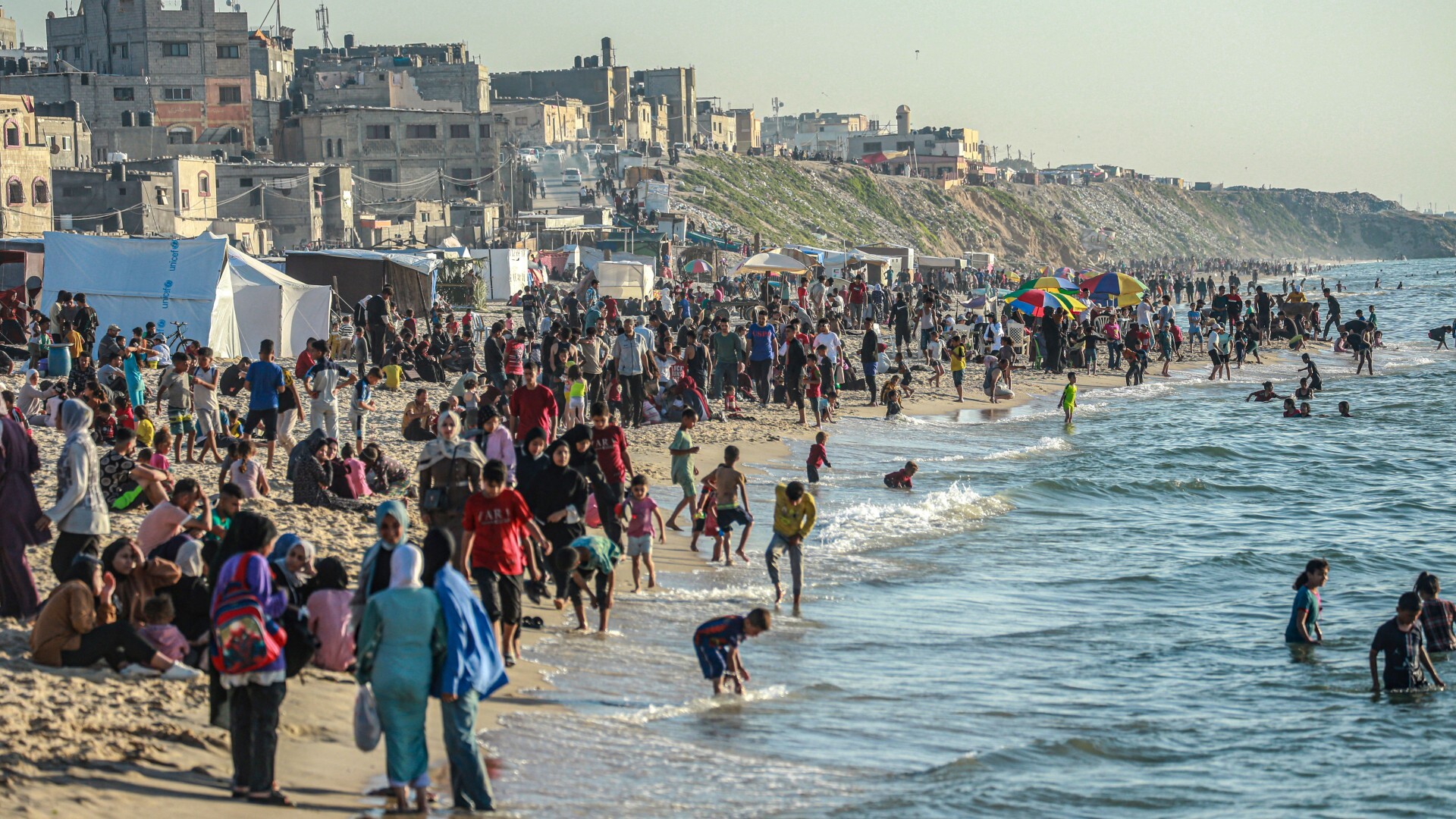
Far-right Israeli National Security Minister Itamar Ben Gvir has suggested that Israel's war cabinet should be "dismantled", partly due to the scenes of Palestinians at the beach.
Ben Gvir wrote on X that in Gaza there were "thousands bathing at the beach", while in northern Israel, Lebanon's Hezbollah "took an aggressive step against us that today cost us wounded fighters".
"It's time to dismantle the [war] cabinet, stop the policy of inclusion and proportionality."
He said that as long as the policies of the current war cabinet continued, "absolute victory" - which has become a slogan of Israel's war - was getting "further and further away".
In a post under the heading "absolute victory", Channel 13 journalist Almog Boker wrote: "This picture makes my body ache. While Zikim beach [in southern Israel, near Gaza] ... is declared a closed military area and we the residents cannot approach it without military escort, on the other side of the fence - the Gazans spend time on the beach and bathe in the sea as if there is no war."
One pro-Israeli commentator suggested people in Gaza "frolicking and having fun on the beach" showed that images of Palestinian suffering were "bullshit".
Another questioned: "Is this what 'genocide' looks like?"
'People come here to express their worries to the sea. Here, we are both happy and sad'
- Nahed Shabat, journalist
But far from frolicking and having fun, displaced Palestinians took to the beach due to a lack of space, clean running water and electricity to stay cool during the hot weather.
"We face overcrowding, health and economic issues as well as lack of food, so the beach is the only place we have to release the stress we endure," Nahed Shabat, a journalist and activist, told MEE.
"People come here to express their worries to the sea."
Shabat is originally from Beit Hanoun in northern Gaza, but is currently displaced in Deir al-Balah.
He said that as summer approaches, shelters and makeshift camps are getting increasingly hot. With parks and other open spaces in Gaza destroyed by Israeli bombardment, the beach is one of the only places left to go to.
"Here, we are both happy and sad. Happy to get a respite at the beach, but sad for our martyrs who have fallen," he said.
"But at the end of the day, this is our land. We will not leave it."
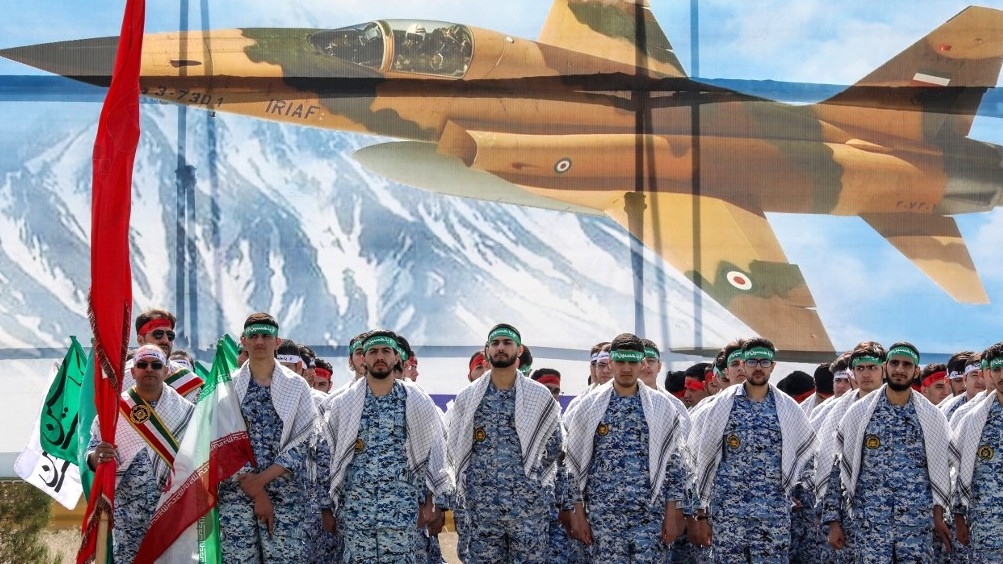
While politicians worldwide expressed either condemnation or support for Iran's recent attacks on Israel, many Iranians took to social media to mock the advance notice given to other countries prior to the attacks.
On Saturday night and early Sunday morning, Iran’s Islamic Revolutionary Guard Corps (IRGC) targeted Israel with over 300 drones and missiles, but officials in the region had been informed about the assault 72 hours in advance.
On Sunday, Iran’s Foreign Minister Hossein Amir-Abdollahian said that Tehran informed its neighbours about the attacks against Israel, as well as informing Washington that its attacks would be "limited" and for self-defence.
This prompted many ordinary Iranians to question the nature of the retaliation that officials said was in response to the killing of high-ranking IRGC commanders in Syria earlier this month.
Shahab Baradaran, a software developer in Tehran, wrote on the X social media platform: “The Iranian government’s attack was like a chess player who thinks out loud, saying: 'Well, I’ll move this pawn forward! Now I’ll put this knight in the centre so that if the bishop comes, I’ll check! Oh, I don't know what to do now! So, I’ll castle to see what happens next!'”
Another Iranian social media user, Hadi Sarmadi, ridiculed the attack, as Israel and its allies were monitoring the drones hours before they arrived in Israel.
“What sort of attack is it if everyone knew about it? The establishment reported it before the missiles and drones hit! Israel, Britain, and America were waiting for them to arrive! A live show could be created from the movement of drones! Drones which were meant to be downed!” he wrote.
Other Iranians used humour, sharing Mr Bean images, to mock the purported inefficiency of the attacks, captioning them: "Israel, waiting for the drones."
Iran's judiciary has summoned journalists and analysts to court and prosecuted outlets for "disrupting the psychological security of society", because of the articles and comments they published about Iran’s attacks against Israel.
On Monday, all Iranian media across the political spectrum praised the attacks in response to Israel’s deadly air raid against Iran’s consulate in Damascus. However, any public opposition to Iran’s response has been the target of a judicial crackdown.
The judicial system’s news agency, Mizan, reported that documentary director Hossein Dehbashi, political analyst Abbas Abdi, and journalist Yashar Soltani were among those summoned to court.
Iranian judicial authorities have also indicted the Jahan Sanat and Etemad dailies for articles published before the attacks, which warned about the consequences of such a military move.
The reason for prosecuting Dehbashi was a post on X after the attack on Israel, saying "Last night's attack was a show, insufficient and unsuccessful, and fuelled concerns about the country’s real defence capability."
Meanwhile, the Jahan-e Sanat daily has been summoned to court for an article published on Sunday expressing concerns about the economic consequences of the tension between Iran and Israel, and the fall of the stock market.
Iran’s judiciary announced that these actions were "in line with the legal duty of the judiciary to deal with those who disturb the psychological security of society".
The intelligence agency of the IRGC also issued a statement saying that it would take "decisive action" against those who support Israel online, urging citizens to report cases of support for Israel to the IRGC's cyber unit.
Iran’s Islamic morality police, or Gasht-e Ershad, have returned to the streets and, since Saturday, several videos have gone viral on Farsi social media showing the brutal arrest of women who defied the country’s obligatory hijab law.
Since the death of Mahsa Amini in morality police custody in September 2022, Gasht-e Ershad has been at the centre of attention. Shortly after Amini’s death, their operation was suspended. However, the return of the infamous branch of police to the streets has sparked criticism among many Iranians.
On Saturday, the Arman Meli daily wrote about the long history of unsuccessful implementation of the mandatory hijab law in Iran after the 1979 revolution, asking, “What was the result of all that?”
Iranian sociologist Ahmad Bokharaei also cast doubt on the effectiveness of forcefully implementing the hijab law, warning that the move would cause more damage to society.
“In the short term, some people may observe the hijab out of compulsion, fear, and threats, but eventually, it will create resentment and hatred in the hearts of the citizens and will have repercussions,” he said.
Reza Rashidpour, a renowned former TV presenter, also suggested that the new plan would have the same result as the previous ones, without any impact on enforcing the hijab law. “No matter how many thousand times you watch the same movie, the ending would be the same,” he wrote on X.
* Iranian press review is a digest of news reports not independently verified as accurate by Middle East Eye.
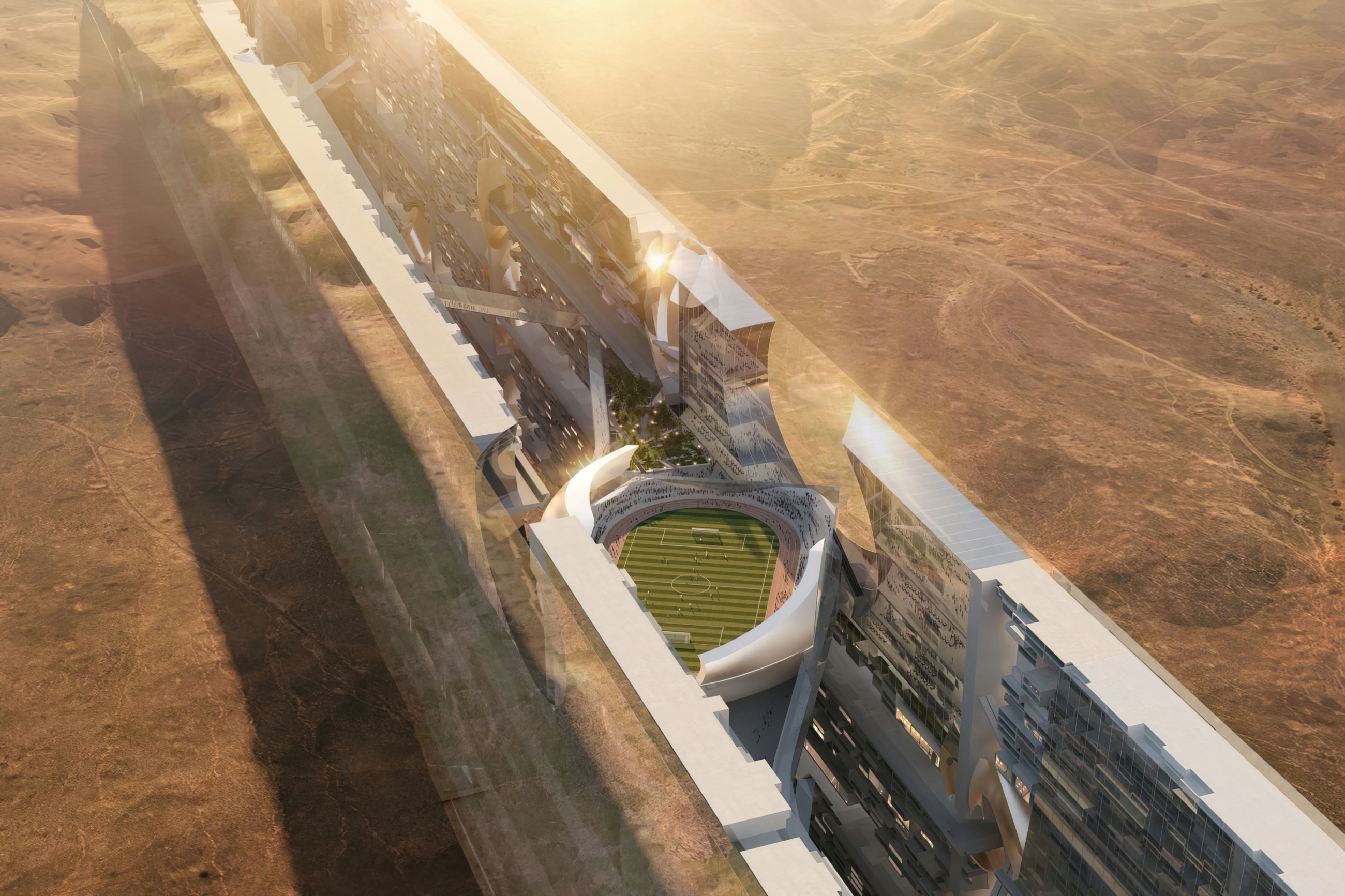
Saudi Arabia is looking to raise over a billion dollars for the Neom megacity project from the sale of Islamic bonds, following reports that ambitions for the desert project have been scaled back.
Neom is looking into a plan to raise as much as $1.3 billion from Islamic bonds, or sukuk, as it looks to shore up funding for the $1.5 trillion megacity project, according to a Bloomberg report.
Saudi Arabia had expected 1.5 million people to be living in the 170km straight-line city by 2030. But Bloomberg reported earlier that officials now expect only 300,000 residents to be living there by that time.
Neom is the flagship project in Crown Prince Mohammed bin Salman’s wider plan to make Saudi Arabia’s economy less dependent on oil revenue and boost tourism, industry and the service sector.
Bloomberg reported in July that Neom hoped to raise $2.7bn in loans from local lenders. So far, most of Neom's funding has come from the kingdom's sovereign wealth fund.
The Line, the horizontal city, is due to have no cars or roads and a high-speed rail service running across the length of the city. Two parallel, mirrored buildings that are nearly 500 metres tall and 120km wide are also planned as part of the project, according to designs uncovered in 2022.
Neom is also touted to include an eight-sided city that floats on water, a ski resort with a folded vertical village, and a Red Sea luxury island resort called, Sindalah.
Those efforts have had an impact. In March, Saudi Arabia reported that its non-oil economy reached a historic milestone in 2023, contributing 50 percent to the country’s real GDP.
But the kingdom’s plans to draw millions of foreign residents and investors face obstacles, including a conservative culture where alcohol is still generally banned. In January, media reports said the kingdom was set to open the country's first liquor store, catering exclusively to diplomats.
Western tourists who have visited Saudi Arabia’s Red Sea coastline have come away with mixed reactions, remarking on its beauty but noting high prices and an overbearing bureaucracy, Middle East Eye has previously reported.
Saudi Arabia also faces stiff competition in the luxury development space from Qatar, Oman and the United Arab Emirates.
The war in Gaza has also revived geopolitical concerns among investors and travellers.
Houthi fighters in Yemen have launched a campaign against commercial shipping, in what they say is in retaliation for Israel’s war on Gaza.
While they have said they are not targeting their Arab neighbours, their drone and missile attacks have led to cruise ship cancellations in the Red Sea, underscoring how their attacks can ripple into Saudi Arabia’s tourism and development ambitions.
Sindalah, the Red Sea resort that is part of the Neom project, is due to open later this year.

Several Google employees were arrested Tuesday evening at the company’s offices in New York City and Sunnyvale, California, after the company called police to break up a protest against Google’s work with the Israeli government.
Police were seen entering a conference room at Google’s office in Sunnyvale and removing protesters wearing Palestinian keffiyehs and T-shirts reading, “Googler Against Genocide”.
The protestors said their sit-in at company offices would continue until they were removed or their employer dropped its $1.2bn "Project Nimbus" contract with Israel’s government.
The project, announced in 2021 by Google and Amazon, provides advanced artificial intelligence and machine learning capabilities to Israel’s government. Since then it has sparked backlash among some Google workers who have condemned Israel’s treatment of Palestinians. That criticism has resurfaced amid Israel’s war on Gaza, which has killed over 33,000 Palestinians, mainly women and children.
Google called in the police after the 10-hour-long sit snarled work at the company’s workplaces, including the office of Google Cloud CEO Thomas Kurian in Sunnyvale. The sit-in was organised by the group, No Tech for Apartheid.
Nine employees were arrested across New York and California, according to Jane Chung, the protestors' spokesperson.
“Google execs basically chose to arrest workers for speaking out against the use of our technology to power the first AI-powered genocide,” Google software engineer Mohammad Khatami, one of the protestors arrested in New York, told Democracy Now.
An online petition circulated by No Tech for Apartheid demanding that Google and Amazon cancel the Nimbus project had garnered 94,494 shares by Wednesday evening, nearing the 95,000 threshold the group had set.
UPDATE: Google orders arrests against its workers for protesting labor conditions and against the company's $1B contract with Israel. https://t.co/FI1wrYyf6t pic.twitter.com/PzQkzF3OGp
— jane chung (@orientaljanedoe) April 17, 2024
“Your technology is directly supporting the ongoing ethnic cleansing of Gaza and the recent genocidal bombing of Gaza that began last month,” the letter said.
“As long as your tech continues to power the Israeli military and government, you are actively complicit in this genocide.”
The protest movement comes after critics accused Google of muzzling pro-Palestinian voices.
In March, Google fired an employee who shouted, “I refuse to build technology that empowers Genocide” during a presentation in New York City by Barak Regev, Google’s Israel managing director.
In December, Google staff members and No Tech for Apartheid held a vigil in London for software engineer, Mai Ubeid, who was a graduate of the Google-funded coding boot camp, Gaza Sky Geeks, and in 2020 was part of the Google for Startups accelerator programme.
Ubeid was killed on 31 October along with her entire family in an air strike during Israel's war on Gaza.
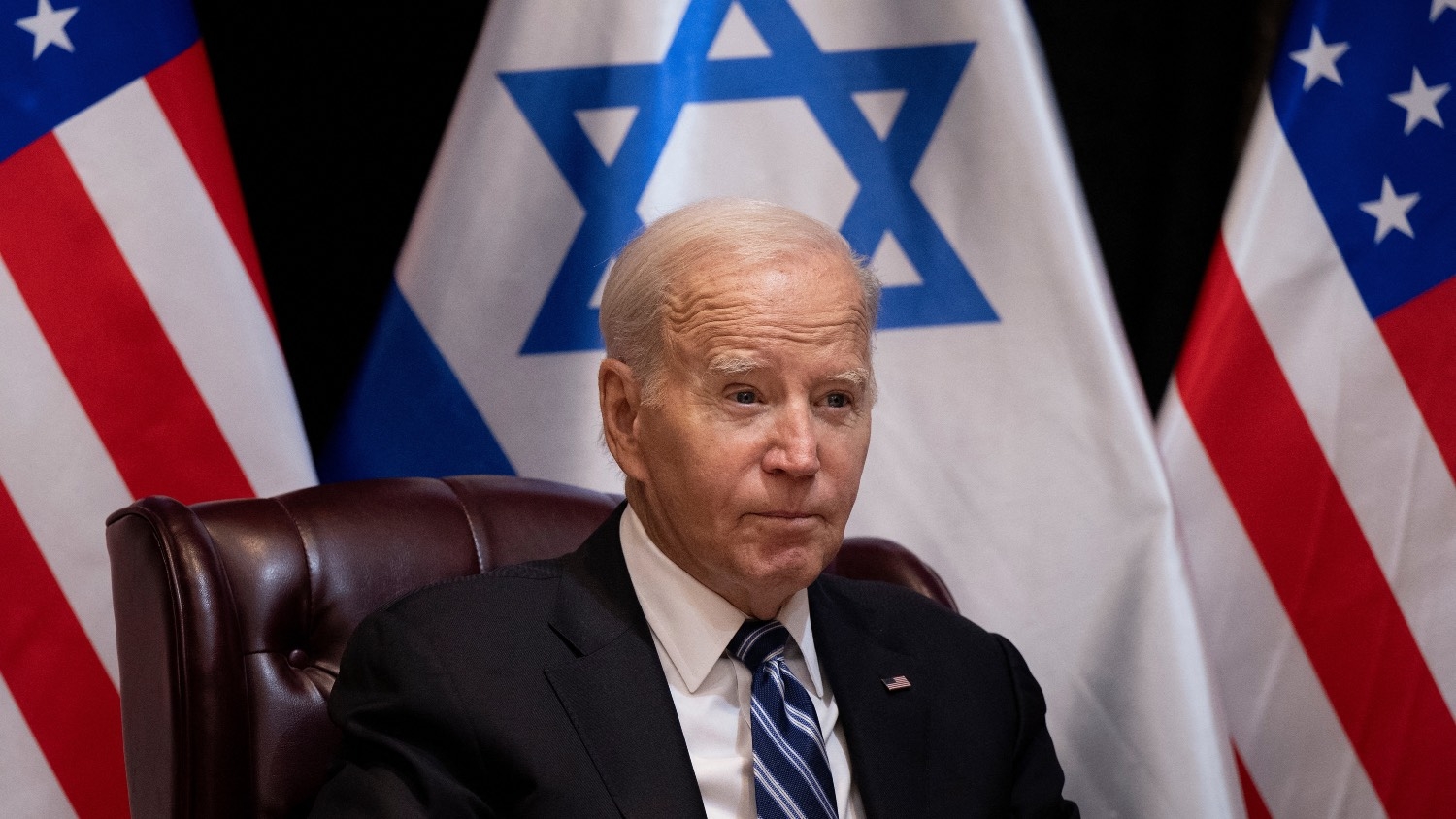
More than two dozen House Democrats, including the co-chair for US President Joe Biden's reelection campaign, have sent a letter to the Biden administration calling for a thorough investigation into how it concluded that Israel was not using American weapons in violation of international law.
Biden issued a national security memorandum in February, which instructed his administration to seek assurances from countries receiving US arms that those weapons are not being used in contravention of international law or international humanitarian law.
If these assurances were not provided, arms sales to that country would be suspended.
In March, Israel sent a letter to the administration offering the assurances that the administration was seeking. However, that letter was not made available to the public.
"In the face of mounting credible and deeply troubling reports and allegations that Israel has used US arms in ways that violate US and international law ... we believe a failure to question, at minimum, the Netanyahu government’s assurances, violates the very spirit of the NSM-20 process," said the letter, first reported by The Intercept.
The letter was signed by a number of prominent progressive lawmakers, including Cori Bush, Rashida Tlaib, Ayanna Pressley, Ilhan Omar, and Alexandria Ocasio Cortez. It was also signed by Veronica Escobar, the national co-chair for Biden's 2024 reelection campaign.
It called on the administration to provide a full breakdown of how it conducted its assessment of Israel's activities in Gaza, "including whether the use of US-origin weapons has been in accordance with US best practices, or international law, or has violated any human rights".
The letter also asks the administration whether it has made any assessments as to whether the issuance of foreign military sales to Israel after Israel's war on Gaza began were in compliance with international law. The Democrats also want to know whether Israel's restriction of humanitarian assistance to Gaza would trigger a US law that could suspend arms sales to the country.
The lawmakers have given the administration until 1 May 2024 to respond to their questions.
Israel's war on Gaza began in October after Hamas led an attack on southern Israel, killing 1,200 people and taking more than 200 people hostage. Israel responded with full force, launching a bombing campaign followed by a ground invasion that has targeted much of Gaza's civilian infrastructure, including schools, hospitals, mosques, and UN shelters.
So far, Israeli forces have killed more than 33,000 Palestinians, most of whom are women and children, in what rights groups, UN experts, and several countries say is a genocide being committed by Israel against the residents of Gaza.
The Biden administration's immediate reaction to the war was to provide Israel with diplomatic and military backing by fast-tracking arms shipments to the country as well as blocking UN Security Council resolutions calling for a ceasefire in Gaza.
When speaking to reporters, Biden officials have repeatedly said that they have not yet made any conclusions as to whether Israel is violating international humanitarian law or international law in general.
However, Middle East Eye spoke to several professors of international law, who all said there is overwhelming evidence that Israel is in violation of international humanitarian law in its conduct in Gaza.
"No, Israel is not complying with international law in Gaza. Israel has unlawfully impeded humanitarian relief, and there is substantial evidence that it has unlawfully used starvation of civilians as a method of warfare," Adil Haque, a professor of law at Rutgers University in the US, previously told MEE.
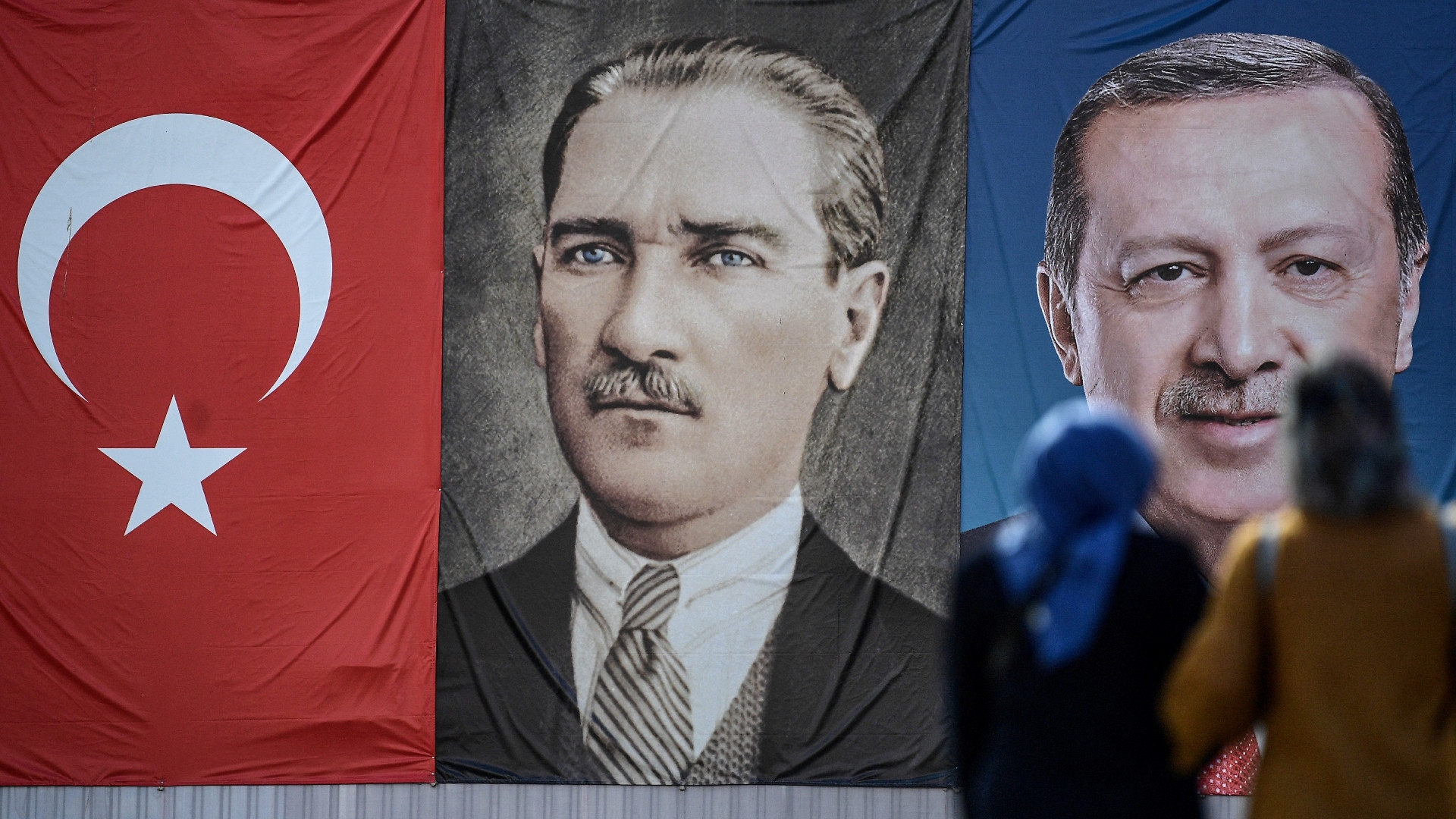
Turkish President Recep Tayyip Erdogan has compared the Palestinian armed movement Hamas to the Turkish revolutionary forces, which helped expel foreign armies from Anatolia in the 1920s.
The comments to parliament on Wednesday are the strongest public endorsement of Hamas by the Turkish leader since the war on Gaza began in October.
"I say it very clearly and openly: Hamas is exactly the same as the Kuva-i Milliye [National Forces] in Turkey during the war of liberation," he said during the address.
"We are aware that there is a price to pay for saying this. We know that it is difficult to proclaim rights and truths in such a period.
"But let the whole world know, understand, and comprehend: we will not yield," Erdogan added.
Erdogan is expected to meet Hamas political leader Ismail Haniyeh in Istanbul on Saturday, according to sources who spoke to Middle East Eye.
The National Forces played an important role during Turkey’s war of independence between 1918-1920, using military force to install a nationalist government in Ankara and expelling Greek and western forces from Western Anatolia and Eastern Thrace, the European part of Turkey.
Parts of the Ottoman Empire, the predecessor state of the Turkish Republic, were occupied by western allies after the Ottoman defeat in World War One.
The Turkish military successes during the independence struggle, which was led by Mustafa Kemal Ataturk, paved the way for the abolition of the Ottoman Empire and the establishment of a republic.
Erdogan's comments have not been welcomed by his opponents, who rejected the comparison between the Turkish nationalists and Hamas.
Ilhan Uzgel, a deputy chairman in the main opposition Republican People’s Party (CHP), dismissed Erdogan’s comments, saying that there was no similarity between Hamas and Turkish revolutionaries.
"Do not use the War of Independence as a tool for your ideological preferences," he said. "You paid no price for the Palestinian cause. Your greatest courage was receiving the Medal of Courage from the Jewish lobby."
In his speech, Erdogan insisted that he will be "a voice of the oppressed Palestinian people" as long as he is alive.
The Turkish leader has been a vocal critic of Israel's invasion of Gaza, which started after a Hamas-led assault on southern Israel that left at least 1,141 people dead.
Erdogan has criticised Israel's subsequent "crimes against humanity" and "genocide", while allowing trade to continue between the two countries.
Erdogan supporters punished the president during the 31 March local elections over the maintenance of trade ties by switching their allegiances to the Islamist New Welfare Party (YRP) or simply boycotting the vote, resulting in his AK Party's defeat in mayoral contests in large cities.
After the results, Ankara halted the export of 54 products to Israel in early April, including cement, steel and construction materials, citing its responsibility under international law to prevent human rights abuses.
Erdogan expressed anger on Wednesday that his government’s past actions against Israel have not been recognised by the wider public, while also dismissing rumours that Ankara has been supplying jet fuel to the Israelis.
"We will courageously defend Palestine's struggle for independence under all circumstances," he said.
"My brothers, remember this; some of our steps may not be visible. We may not be able to explain some of what we do. However, those who come out and question our sensitivity towards Palestine will sooner or later be embarrassed, disgraced, and see what injustice they have done before history."
Turkey was an early critic of Israel’s campaign in Gaza. Erdogan was calling the assault a genocide as early as 20 October, becoming one of the first world leaders to use the term.
The country is also one of the biggest humanitarian donors to Gaza, alongside several Gulf Arab countries, and has flown in dozens of Palestinians from Gaza for medical treatment in Turkish hospitals.
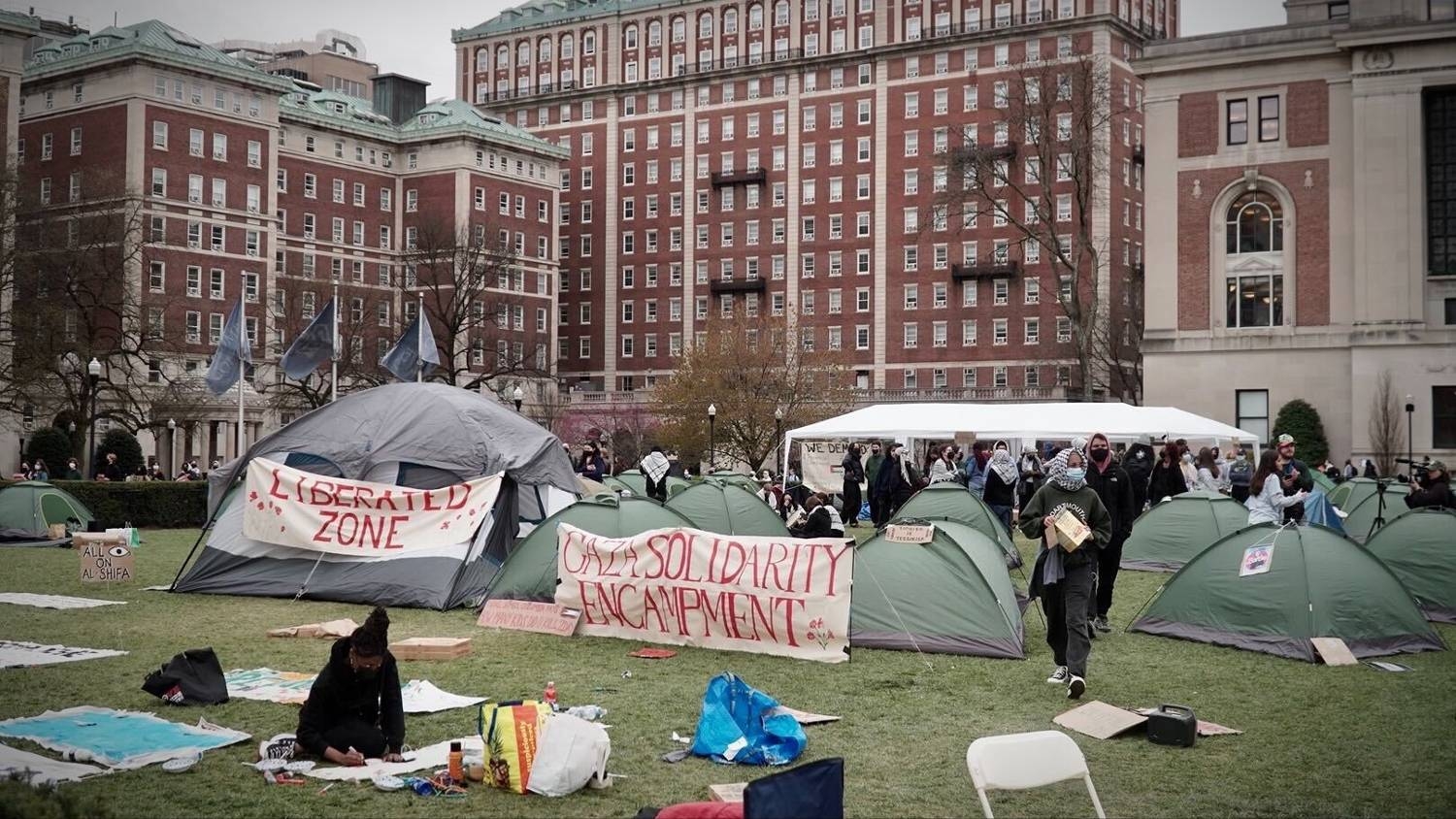
Hundreds of Columbia students have staged a Vietnam-style encampment inside the main campus of the university in solidarity with Palestinians in Gaza, in defiance of what they say is repression of pro-Palestinian protests at the Ivy League school in New York City.
The action on Wednesday morning organised by several groups including Columbia University Apartheid Divest, Students for Justice in Palestine, and Jewish Voice for Peace, began hours before Columbia University President Minouche Shafik’s testimony was expected before the US House Committee on Education and the Workforce.
The Gaza solidarity encampment is the latest student-led action at Columbia geared to force administrators to divest from companies and institutions they deem to be profiteering from Israel's "apartheid, genocide and occupation" in Palestine.
"We set up an encampment of around 50 tents. We are going to be creating our version of the university because we no longer recognise the university that we joined because of the repression and the severe encroachment of academic freedom," Maryam Alwan, a student activist who joined the camp-out at the university, told Middle East Eye.
"We will not be leaving from our position until our school divests from all funds that are going to this genocide," Alwan said.
Students said they arrived as early as 2am local time on Wednesday morning to evade security and set up a camp on the campus in Harlem.
On Wednesday, the campus was heavily fortified, with only those with Columbia identity cards allowed to enter the sprawling campus. University authorities also issued a media moratorium until May 19.
A university spokesperson told MEE that the presence of tents on South Lawn was "a safety concern and a violation of university policies".
"We are informing the students they are in violation of university policies and for their own safety and for the operation of the university they need to leave," the spokesperson said.
Threatened with the very real prospect of the camp being disbanded by administrators and protesters facing potential arrest, several hundred students took turns on Wednesday to march around the site to offer both protection and solidarity with the protesters.
Since Israel's war on Gaza began, following a Hamas-led attack on Israel on 7 October, university students across the United States have been at the forefront of calling for both a permanent ceasefire in Gaza and an end to the complicity of their universities in Israel's war on Gaza.
Pro-Palestinian students have accused universities of attempting to censor or stifle support for Palestine on their campuses.
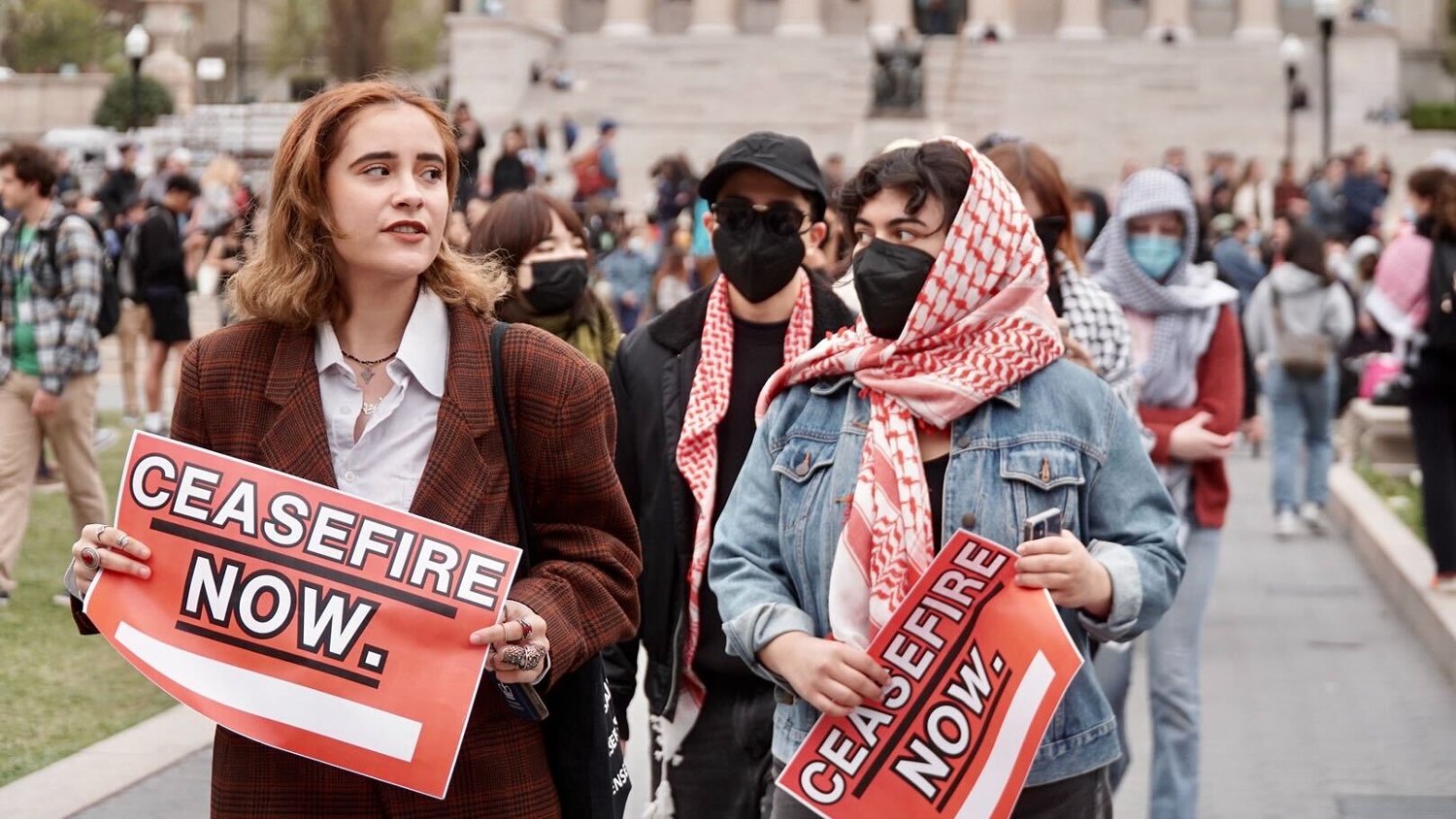
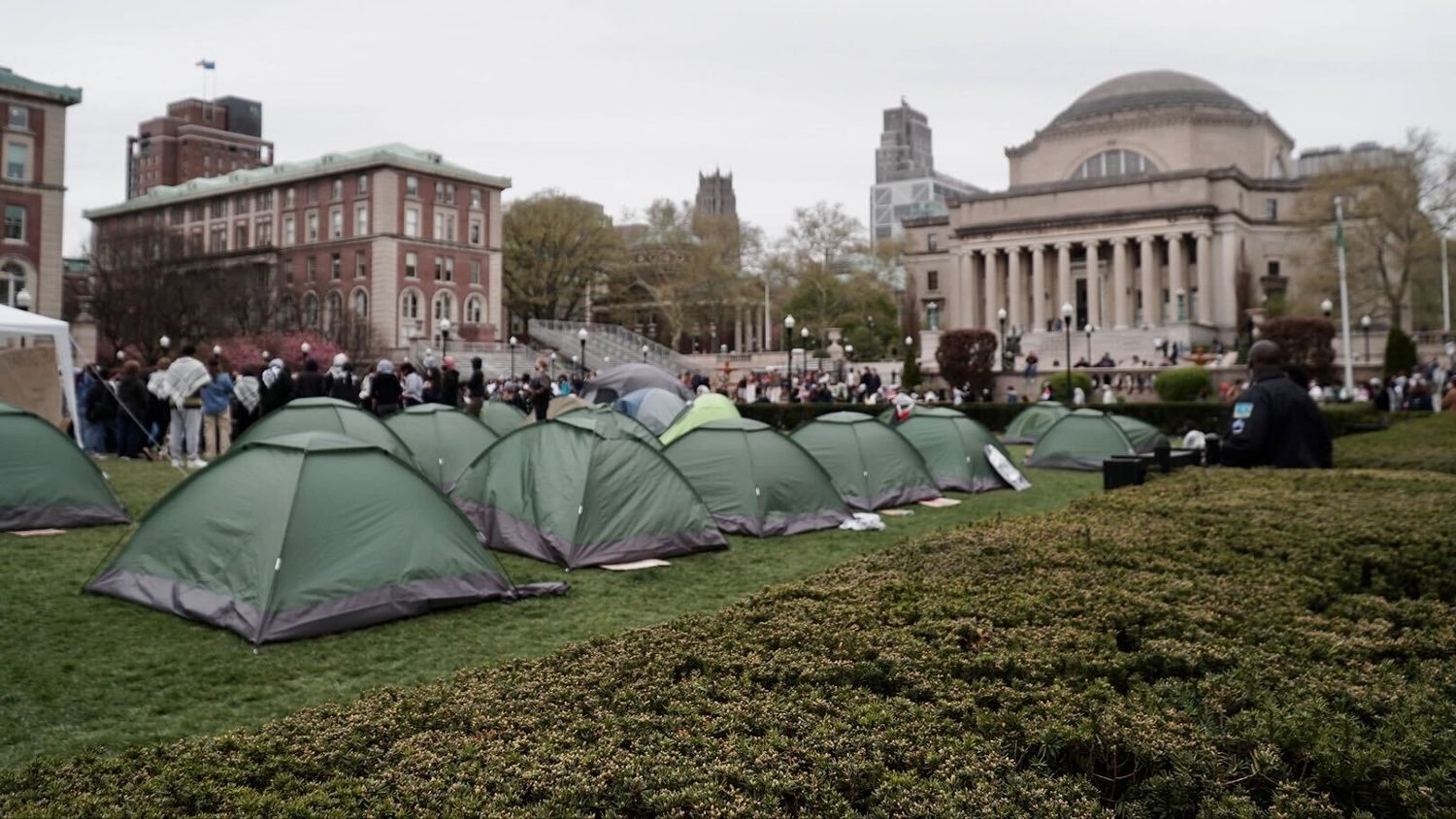
In a statement sent to MEE ahead of the protest action, students said their protest at Columbia carried forward the "rich legacy of student activism, from anti-Vietnam War protests in 1968 to being the first Ivy League school to divest from Apartheid South Africa in 1985".
"As students at this institution, it is our responsibility to stand against our inherent complicity in genocide and ethnic cleansing from Palestine to Harlem.
"We refuse to accept a world where the death of over 30,000 Palestinians is normal, acceptable, or profitable."
"We are in total solidarity with the Palestinian liberation movement, who resiliently resist decades of occupation, apartheid, and genocide. We remain steadfast in our commitment to see a free Palestine within our lifetime," the students added.
Students said they would be hosting teach-ins at the camp about the history of the anti-apartheid movement on campus and would be focusing on building a community around their activism and demands.
Alumni of schools like New York University have pledged to hold back their donations until the university stops infringing on the rights of students and faculty to speak their minds on campuses.
The schools have also come under pressure from wealthy donors who have accused the schools of failing to crack down on antisemitism on the campuses.

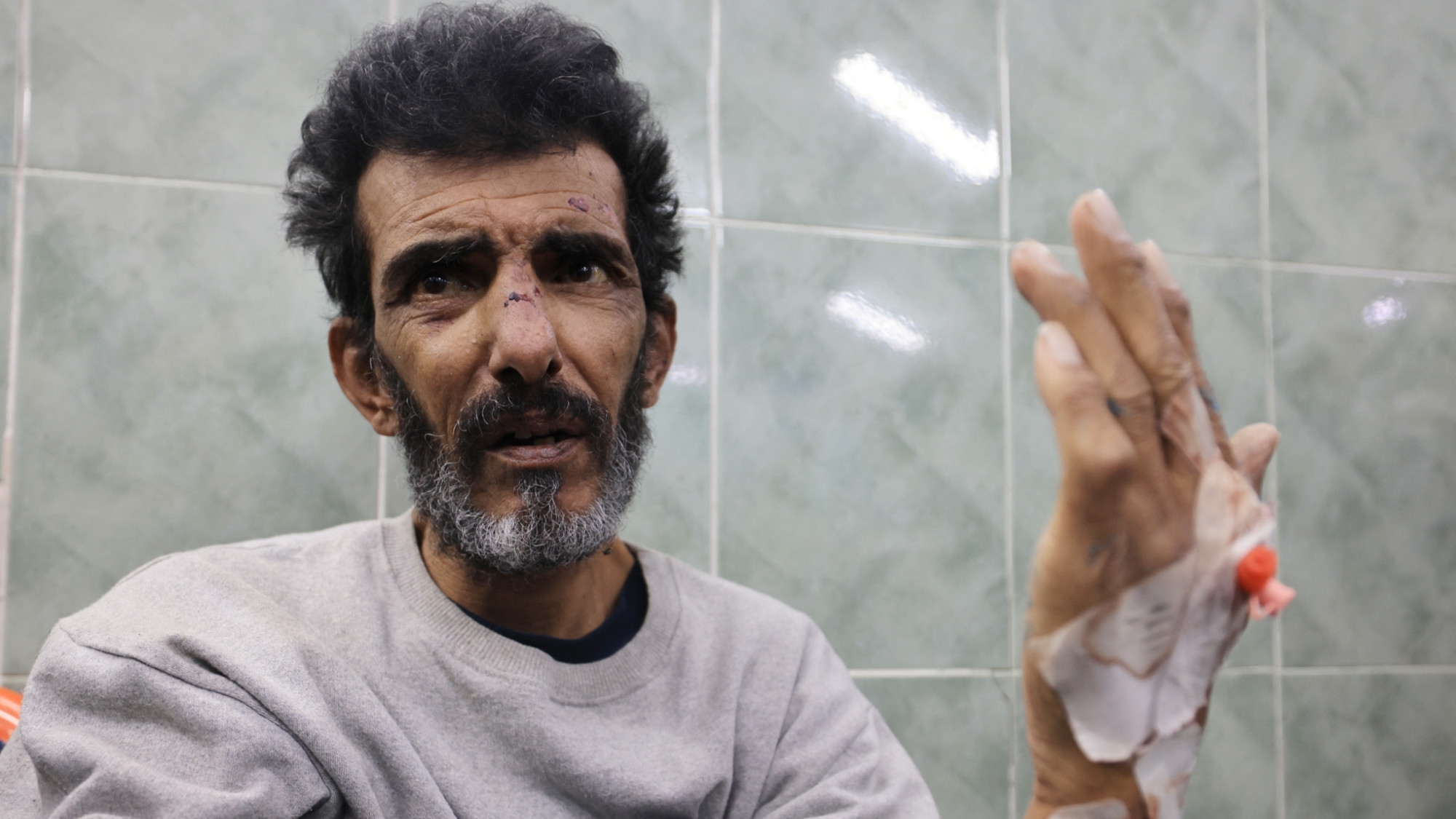
The United Nations agency for Palestinian refugees (Unrwa) said it received reports of mass ill treatment of Palestinians taken captive from Gaza by Israeli forces, including detainees being urinated on and made to act like animals, and children being attacked by dogs.
A new report, released on Palestinian Prisoners' Day on Wednesday, warned that for the thousands of prisoners kept in detention by the Israeli army, physical, sexual and psychological abuse were routine.
"This included being subjected to beatings while made to lie on a thin mattress on top of rubble for hours without food, water or access to a toilet, with their legs and hands bound with plastic ties. Several detainees reported being forced into cages and attacked by dogs. Some released detainees, including a child, had dog bite wounds on their body," read the report.
"Detainees were threatened with prolonged detention, injury or the killing of family members if they did not provide requested information."
The testimonies come from some of the 1,506 detainees that Unrwa said it had documented being released from Israeli detention between November and 4 April.
Among those abused while in detention were Unrwa staff members, who the agency said were made to make forced confessions in addition to suffering other forms of abuse.
Unrwa said other detainees reported having wet blankets thrown on them, or "being made to sit on their knees for 12-16 hours a day while in the barracks, blindfolded, with their hands tied".
Unrwa also received reports of sexual violence against prisoners. Male victims said they received beatings to their genitals, while at least one detainee reported "being made to sit on an electrical probe" and said he saw one man die after a probe was inserted into his anus.
Both men and women were photographed and filmed while naked and subjected to inappropriate touching.
Middle East Eye contacted the Israeli army for comment, but had received no response at time of publication.
In a statement marking Palestinian Prisoners' Day, the Gaza media office said over 5,000 Palestinians had been arrested by Israeli forces during their current war on Gaza, which started on 7 October.
The office also said that Palestinian prisoners were undergoing "the worst kinds of torture" in Israeli jails, and asked the international community to intervene.

While MEE cannot independently verify the testimonies given in the Unrwa report, they support other testimony given by former prisoners to MEE last month, in which they described being physically tortured with dogs and electricity, subjected to mock executions, and held in humiliating and degrading conditions.
One man, who was taken by Israeli forces from a school in Gaza where he had sought refuge with his family, described to MEE how he had been handcuffed, blindfolded and detained in a metal cage for 42 days.
During interrogations, he said he had been given electric shocks, and was scratched and bitten by army dogs.
Other men also described being electrocuted, attacked by dogs, doused with cold water, denied food and water, deprived of sleep, and subjected to constant loud music.
Hamas on Wednesday said freeing Palestinian prisoners in Israeli jails was a "top priority" and called for a global movement in support of the prisoners' cause.
"[Israel]'s prison administration continues to practice the most heinous crimes against prisoners inside prisons and detention centres, including medical negligence, torture and direct killing," the statement from the group read, adding that 16 prisoners have died in Israeli jails since 7 October.
Last month, the Israeli military said that it was aware of the deaths of 27 Palestinians in its custody.
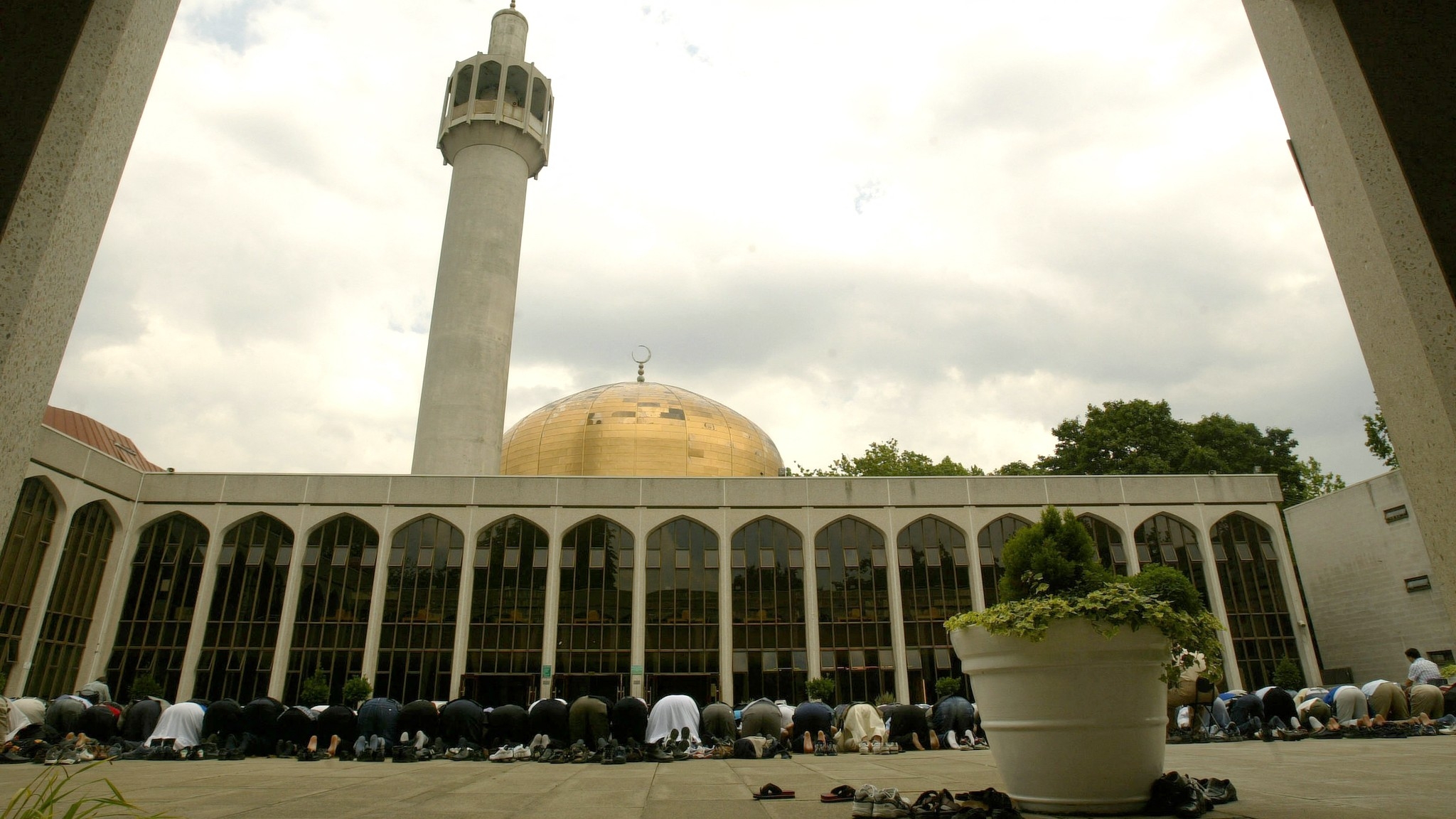
London Central Mosque has denied that one of it's imams said it was permissible for Muslim students to defer obligatory afternoon prayers, after court documents from a recent legal case over a school’s ban on prayers had shown the alleged input of the mosque.
The opinion on prayer deferrals, which is contested by some Muslim scholars, caused controversy among British Muslims.
On Tuesday, the UK High Court ruled that a prayer ban imposed by Michaela Community School in northwest London was not unlawful.
A British Muslim student filed the legal challenge on the grounds that the school’s policy was discriminatory and "uniquely" affected her faith due to its ritualised nature.
Justice Thomas Linden concluded that the prayer ritual policy was "proportionate" and its aims and ability to achieve them "outweighs" any "adverse effects" on the rights of Muslim pupils at the school.
The judge added that the pupil could perform "Qada" prayers for missing prayers earlier in the day "to mitigate the failure to pray within the allotted window."
In March last year, students at the school began praying in the school’s yard using blazers to kneel on, following the imposition of the ban.
According to the written ruling, the school's founder and headteacher Katharine Birbalsingh said she had spoken with an imam at the London Central Mosque and Islamic Cultural Centre (also known as Regent’s Park Mosque) about the permissibility of making up missed prayers.
The document stated: “Ms Birbalsingh argues that… observant Muslim pupils who miss the Duhr prayer can make up for it later in the day, including by praying at the Brent Civic Centre if they wish.
“She says... she also spoke with the Imam at the London Central Mosque and Islamic Cultural Centre who agreed with this view and offered to speak to any Muslim parents who had doubts on this point.”
On Thursday, London Central Mosque published a statement stating that it disagreed with the judgement and that preventing Muslim's praying was "a violation of the religious and human rights".
Statement regarding Michaela Secondary School https://t.co/dooBgNXlnW pic.twitter.com/VKHycTYC6i
— LondonCentral Mosque (@iccukorg) April 18, 2024
"The London Central Mosque was not involved in, and was not asked to be involved in this court case in any way whatsoever," it stated.
The mosque said it explained to Birbalsingh that Muslim students needed to pray in the allotted time for prayer.
On the issue of praying later, it told the school that in the summer, the time between Duhr (noon) and Asr (afternoon) prayers was further apart, and therefore the Duhr prayer can be delayed to its final prescribed time.
"We made it clear that in the winter it would NOT be possible to pray later as times are much shorter."
Birbalsingh describes herself as having “small-c conservative values”, and is as the self-styled “strictest headmistress” in Britain.
There are different interpretations on the issue of Qada prayers, with some Islamic scholars stating that obligatory prayers can only be missed in exceptional circumstances.
'Regent’s Park Mosque imam advised the Tory government’s darling to ban prayers. This mosque is working to undermine our community'
- Salma Abla
The London Central Mosque, first established in 1977, is one of the largest Muslim places of worship in London, accommodating several thousand worshippers. Its iconic golden dome can be seen prominently from nearby Regent’s Park.
Its apparent involvement in the legal case had been criticised by a number of British Muslims on social media.
“Not one Muslim should step foot inside this mosque,” said one user. “Full boycott.”
Another user, Salma Abla, wrote: “Regent’s Park Mosque imam advised the Tory government’s darling to ban prayers. This mosque is working to undermine our community. We need to flood their lines again & call for [a] boycott of this mosque. I want zero people praying behind an imam who sold us out to Islamophobes.”
The mosque came under criticism last month after it hosted British Prime Minister Rishi Sunak on the first day of Ramadan.
Several worshippers described the visit as a "betrayal" by the mosque over Sunak's support for Israel during its ongoing war on Gaza.

A former Tunisian president and several former regional leaders have launched a new international body in solidarity with Tunisia's imprisoned former speaker of parliament, Rached Ghannouchi, exactly one year after he was detained and his party's headquarters were raided.
The International Committee for Solidarity with Rached Ghannouchi was established on Wednesday, one year after the 82-year-old was "unjustly detained at his home" and "taken to an unknown location, denied access to a lawyer, and subjected to a lengthy and degrading interrogation," it said in a statement.
A vocal critic of Tunisia's powerful and erratic President Kais Saied, Ghannouchi was detained last year on charges of incitement against police and plotting against state security.
Earlier this year, in a separate case, a judge sentenced him to three years in prison on charges of accepting external financing.
The international committee, which boasts members including former Tunisian President Moncef Marzouki, former Moroccan Prime Minister Saad Dine Elotmani, and former Libyan Prime Minister Mustafa Abushagur amongst many others, said it would focus its work on calling for Ghannouchi's release, and that of all political prisoners.
Before his arrest, Ghannouchi had played "an essential role in consolidating the foundations of an emerging democratic system … reducing political and ideological polarization, and enacting a progressive, pluralistic constitution," the committee said.
But since then, Tunisian authorities have systematically dismantled "democratic institutions painstakingly built over a decade of democratic transition," it said.
"In their place, a new system of authoritarian one-man rule has been put in place through an array of unconstitutional executive decrees," it added.
Saied, a former constitutional law professor, was democratically elected as president in 2019. A fiery populist, he billed himself as an outsider who could take on Tunisia's established political parties, which oversaw growth in democracy but also mounting economic problems in the country of 12 million.
In 2021, however, he shut down parliament and replaced it with a rubber-stamp assembly, an act whose planning was revealed by MEE two months earlier.
He later rewrote the constitution to consolidate power and has targeted political opponents. Meanwhile, his vow to fix the country’s ailing economy has fallen flat, as Tunisians cope with high inflation and shortages of basic goods.
In the last 18 months, the president has dismissed several ministers, including Prime Minister Najla Bouden, without explanation.
Saied immediately replaced her with Ahmed Hachani, a retired central bank employee who had shared articles on his Facebook account espousing conspiracy theories.
In the last year, about 20 opposition, media, and business figures have been imprisoned, accused of "plotting against state security".
Among the other prominent opposition figures to be detained are former UK resident Said Ferjani, former justice minister Noureddine Bhiri, and former public prosecutor Bechir Akremi.
Amnesty International has labelled the arrest campaign a "politically motivated witch hunt".
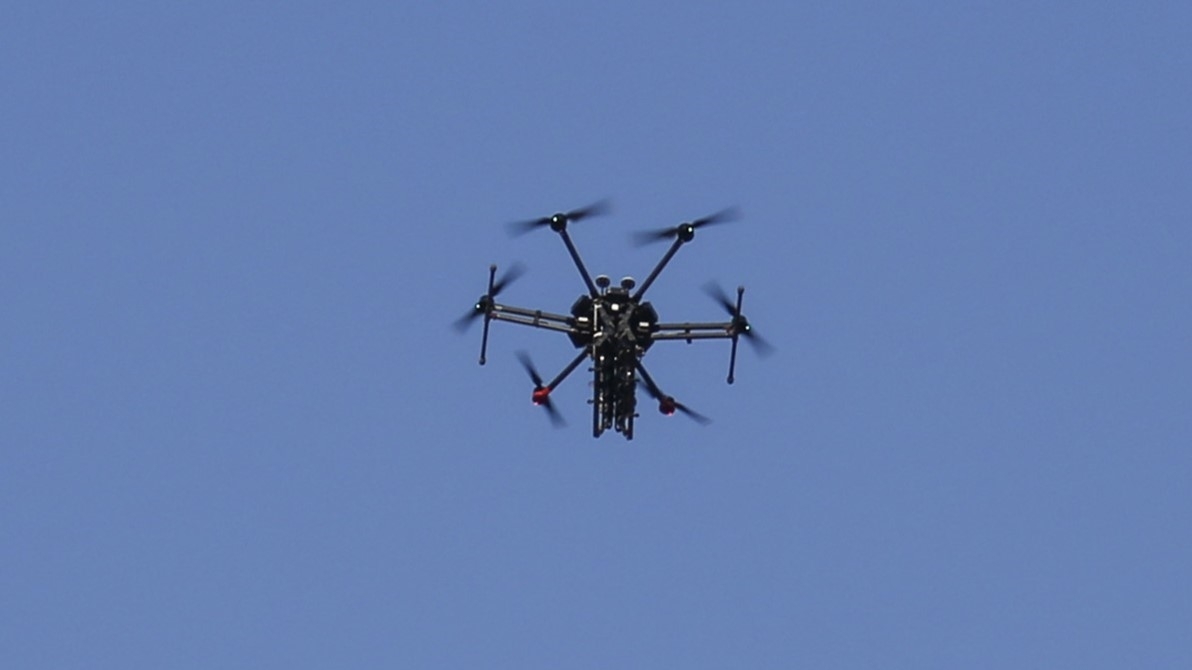
Israeli quadcopters are employing a "bizarre" new tactic of playing audio recordings of crying infants and women in order to lure Palestinians to locations where they can be targeted.
On Sunday and Monday night, residents of the northern parts of Gaza’s Nuseirat refugee camp woke up to the sounds of babies crying and women calling out for help.
When they went outside to locate the source of the cries and provide aid, Israeli quadcopters reportedly opened fire directly at them.
Samira Abu al-Leil, a resident of the refugee camp, told Middle East Eye that she heard Israeli quadcopters opening fire during and shortly after playing the recorded sounds, which lasted for several minutes and recurred multiple times on Monday night.
"I heard a woman crying and screaming for help, saying, ‘Help me, my son was martyred’. The sounds were coming from the street and they were bizarre," the 49-year-old said.
“Some men rushed out to the rescue, only to be shot by the quadcopters that kept roaming all night long."
According to eyewitnesses, at least seven to 10 people were injured by the quadcopter fire overnight.
'The injuries were serious: some were shot directly in the head'
– Resident of Nuseirat refugee camp
Residents were unable to help the victims, as the "quadcopters were firing at anything that moved". However, an ambulance managed to reach the area and transport them to hospital.
"At night, the streets are usually empty and men are inside their homes," Leil added. "When the quadcopters open fire, they only hit the roofs and streets, they don’t find any people to shoot. So they played these sounds because they know the nature of our society; they know that men were going to try to provide help. They wanted them to go out so that they could shoot them," she said.
"Yesterday and the night before, quadcopter bullets hit our roof, door and the street in front of our home. But yesterday morning, they fired some kind of explosive bombs with shrapnel that spreads everywhere on our neighbourhood, leaving many residents injured."
Quadcopters are remote-controlled drones that have been used extensively against Palestinian fighters and civilians in the Gaza Strip since 7 October.
This technology is gradually replacing ground troops, aiding in target identification, individual targeting, and securing areas where Israeli soldiers are stationed.
Israeli drones are reported emitting sounds of crying children at al-Nuseirat camp in Gaza to target and shoot civilians searching for the source of the distress calls. pic.twitter.com/5w02CqYwqs
— Middle East Eye (@MiddleEastEye) April 16, 2024
Additionally, quadcopters can scout forward positions, target individuals within residences, and disperse crowds in public spaces.
A significant event involving the use of quadcopters occurred on 11 January when a large crowd waiting for food on al-Rasheed Street, near the Gaza City coastline, came under fire from the Israeli military. Numerous witnesses recounted quadcopters firing upon hundreds of individuals awaiting the arrival of aid trucks.
Muhammed Abu Youssef, 19, told MEE that at around 2am on Monday he heard the cries of babies. However, since people were posting on social media to raise awareness of the source of these sounds, he chose not to venture outside.
'We did not go out, because we learned that these were only recordings played by the quadcopters to lure us to go out'
- Muhammed Abu Youssef, camp resident
“There were different sounds coming from the quadcopters. They were making noises; some recordings were comprehensible and some were not. They lasted for around 30 to 60 minutes, then the quadcopters started opening fire and firing bombs in the neighbourhood,” he said.
“We did not go out, because we learned that these were only recordings played by the quadcopters to lure us to go out.”
A video recorded by a resident of Nuseirat refugee camp, and circulating on social media, showcased sounds of crying infants, while the resident explained that these were pre-recorded sounds played by Israeli quadcopters.
"Over the past three days, there have been at least 12 injuries due to quadcopter fire. This morning alone, we rescued six people who were wounded in the neighbourhood. The injuries were serious: some were shot directly in the head.”
According to the residents, the audio recordings also included songs in both Hebrew and Arabic, including children’s songs, sounds of clashes and moving tanks, voices of Palestinian armed men, and voices of local roaming vendors of cleaning products familiar to residents of Gaza.
For over a week, the Israeli army has been carrying out an intense military attack on the northwestern part of Nuseirat, targeting individuals, homes and neighbourhoods with artillery, aerial and naval shelling, as well as quadcopter gunfire.

Hundreds of detainees have died as a consequence of torture and inhumane treatment in Kurdish-run prisons in northeast Syria for people suspected of links to the Islamic State group (IS), according to Amnesty International.
In a new report published on Wednesday, the human rights organisation accused authorities and security forces in the Autonomous Administration of North and East Syria (AANES) of committing war crimes at prisons and detention facilities where it said more than 56,000 people - the majority of them children - remain captive.
Launching the report on Wednesday, Nicolette Waldman, a senior crisis adviser at Amnesty, said the US government had played a “key role” in the detention system because of its support for the Kurdish authorities, including funding since 2015 totalling hundreds of millions of dollars.
“The US is involved in most aspects of this detention system. They played a key role in establishing the system in the first place and they’ve played a key role since in supporting and maintaining the system,” said Waldman.
The report found that US officials and military personnel had visited detention facilities and were likely aware of the brutal treatment inflicted on detainees.
Local officials told Amnesty that US intelligence bodies were involved in conducting interrogations of American nationals and Syrian and Iraqi detainees, while several other states had interrogated their own nationals.
“These interrogations, from what we were told, are very regular, they’ve been happening over the course of years and we were told that the US has interrogated all what are termed ‘high-value’ suspects as well as all of their nationals,” Waldman told Middle East Eye.
“Something that became clear through this process is just how much access there is for third states through this system of detention,” Waldman added.
US forces had also delivered detainees into Kurdish custody, where they were subsequently tortured, and had repatriated detainees to countries, including Saudi Arabia and Iraq, where they were at risk of further rights abuses, Amnesty said.
Amnesty also said that scores and possibly hundreds of Yazidis captured and enslaved during IS militants’ genocidal campaign against the minority group in Iraq and Syria likely remained among about 14,500 women and 30,000 children being held at the Al-Hol and Al-Roj detention camps.
Most of those held in the camps were rounded up during the final battles between IS militants and the Kurdish-led Syrian Democratic Forces (SDF) near Baghouz in 2019, and many women were victims of trafficking and forced marriages with IS militants, it said.
While the arbitrary detention of women and children at Al-Hol and Al-Roj, and the refusal of some countries to repatriate their own nationals from the camps, have long been condemned by rights groups, Amnesty’s report reveals harrowing details about conditions inside a network of prisons and interrogation facilities where about 11,500 men are still being held.
It highlighted the Sini detention facility, near Al-Shaddadi city in Al-Hasakah governorate, where it said thousands of prisoners had been subjected to “unrelenting and systematic brutality” resulting in at least hundreds of deaths.
“Former detainees said they were subjected to torture or other ill-treatment primarily in the form of beating with various implements, but also including whipping with electrical cables, suspension from the wrists in what is known as the shabeh stress position, sexual violence and electric shocks,” the report said.
In one incident in 2020, a former detainee said that 17 people in his cell had died of suffocation after prison authorities turned off an exhaust fan. Other former detainees said the bodies of those who died were buried in a mass grave inside the prison complex.
Former detainees also described routinely being denied access to adequate food, water and medical care.
One detainee said that he and his cellmates had regularly gone for two or three days without water, leaving them so thirsty that on one occasion one of his cellmates tried to drink urine from the toilet in the cell.
“Former detainees said the combination of the physical abuse, inhumane conditions and lack of medical care led to the deaths of at least many hundreds of people, if not more. Former detainees recounted witnessing friends and other cellmates dying in front of them, sometimes in large numbers,” the report said.
'We know the Americans, they come with their weapons and their dogs… They could see the people who were injured from torture'
– Former detainee in Amnesty report
Amnesty said that about 800 detainees remained in the prison in 2023, down from about 3,000 to 4,000 detainees prior to 2022.
One former detainee told Amnesty that US soldiers had visited the prison in 2021 to collect biometric data and check on the state of the prison.
“We know the Americans, they come with their weapons and their dogs… [They] checked on the prison, and they searched us, and all of our rooms… [We] were going outside to the courtyard. It was the same courtyard where we were tortured. They were able to see the blood on the wall. They could see the people who were injured from torture,” the report quoted the detainee as saying.
At another detention facility in al-Hasakah city, known as Panorama, Amnesty said that a lack of adequate medical care had resulted in an outbreak of tuberculosis that had been ongoing and unchecked for years.
Kurdish officials confirmed to Amnesty that nearly 600 detainees held at Panorama had died as a result of tuberculosis and other diseases, according to the report.
Torture and mistreatment had been systematically used in another 15 detention facilities to coerce confessions, extract intelligence or as a form of punishment, Amnesty said.
Women held in camps and prisons also described incidents of torture and sexual violence. One former detainee said she had been subjected to electric shocks while pregnant.
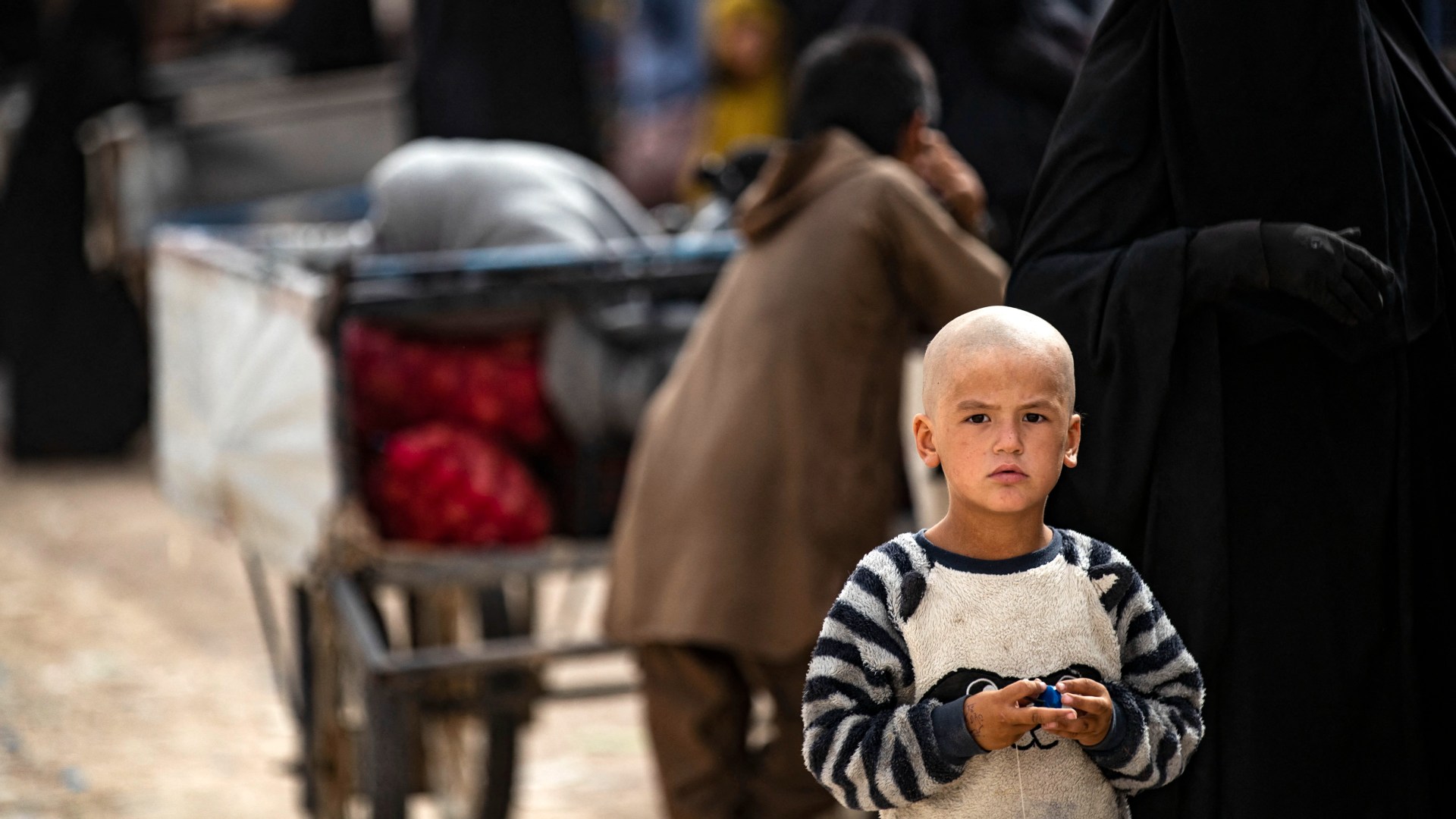
Waldman said: "Men, women and children told us they were subjected to the same methods of torture. They included electric shocks, stress positions, severe beating. The majority of these people we interviewed were Syrians who were being tortured to confess."
Kurdish authorities and security forces have long faced accusations of torturing and abusing detainees in their custody. In 2017, the parents of Jack Letts, a British-Canadian man still imprisoned in northeast Syria, raised concerns with the British foreign office that Letts could die as a result of alleged mistreatment by his captors.
According to documents seen by MEE, Letts' parents said he had told them he had been "subject to electrocution" and threatened with being "put in a box".
Kurdish officials said the allegations were "baseless", and British officials took no action because there was deemed to be "no public sympathy" for Letts. He was subsequently deprived of his British citizenship. Canada has also refused to repatriate either Letts or other Canadian men held in the prisons.
Sally Lane, Letts' mother, told MEE that her son had also told a consular officer in Ottawa in January 2018 about his torture in detention.
"Since then, the Canadian government has done precisely nothing to address the issue of his mistreatment, and claimed in August 2023 they didn't even know where he was or if he was still alive," she said.
"I am disgusted thst for six years the government has used the defence of incompetence in order to evade responsibility for the terrible suffering that Jack and the other detainees have endured."
According to the report, about 42 percent of detainees (about 23,500 people) are Syrian, 37 percent (20,700) Iraqi, and the remaining 21 percent (11,700) foreign nationals from approximately 74 countries.
Amnesty called on AANES to investigate and address allegations of torture and other abuses, and to end practices which it said had led to “mass death as well as severe pain and suffering”.
It called on the US government and its anti-IS coalition allies to take steps to enforce international humanitarian law. And it called for a United Nations-led international response to address “the detention crisis in northeast Syria”.
Agnes Callamard, Amnesty’s secretary general, said: “The autonomous authorities, the US government, other members of the coalition and the UN must all work together and prioritise the urgent development of a comprehensive strategy to bring this shameful system into compliance with international law and identify justice solutions to finally hold perpetrators of IS’s atrocity crimes to account.
“They should conduct an urgent screening process to identify individuals in detention who should be immediately released, with a particular focus on victims of IS crimes and at-risk groups.
“While this is under way, they must ensure that the violations being committed are stopped immediately, and reports of torture and death are independently investigated.”
Amnesty’s report follows a plea last month by Paulo Pinheiro, the chair of the UN’s International Commission of Inquiry on the Syrian Arab Republic, for action to address the situation of the 30,000 children still detained in the camps.
Kurdish officials did not respond to MEE’s request for comment. But in a response to Amnesty, the AANES said it operated in compliance with international human rights laws.
It said it had “not received any information or complaints” regarding alleged torture, and said that if abuses had occurred they were “individual acts”.
It said allegations about ill treatment and lack of food, water and healthcare in detention facilities were untrue, but admitted there were shortages of medical supplies and conditions of overcrowding in detention facilities.
AANES highlighted the difficult conditions it faced, including continuing conflict and a lack of resources to manage and maintain the prisons and camps. It said members of the international community had failed to “fulfil their legal and moral obligations" by failing to repatriate their own nationals.
The US State Department also called for the repatriation of detained foreign nationals to their countries of origin and said it “remained committed to addressing the dire humanitarian and security challenges” in the region.
It said: “We take seriously and remain deeply concerned about reports of human rights abuses including extrajudicial killings; torture and cruel, inhuman or degrading treatment or punishment; arbitrary detention; and enforced disappearance.
“We continuously urge all actors in Syria, including the Syrian Democratic Forces (SDF), to uphold human rights, protect civilians, and to respond appropriately to allegations of abuse and civilian harm, including by holding perpetrators accountable as appropriate.”
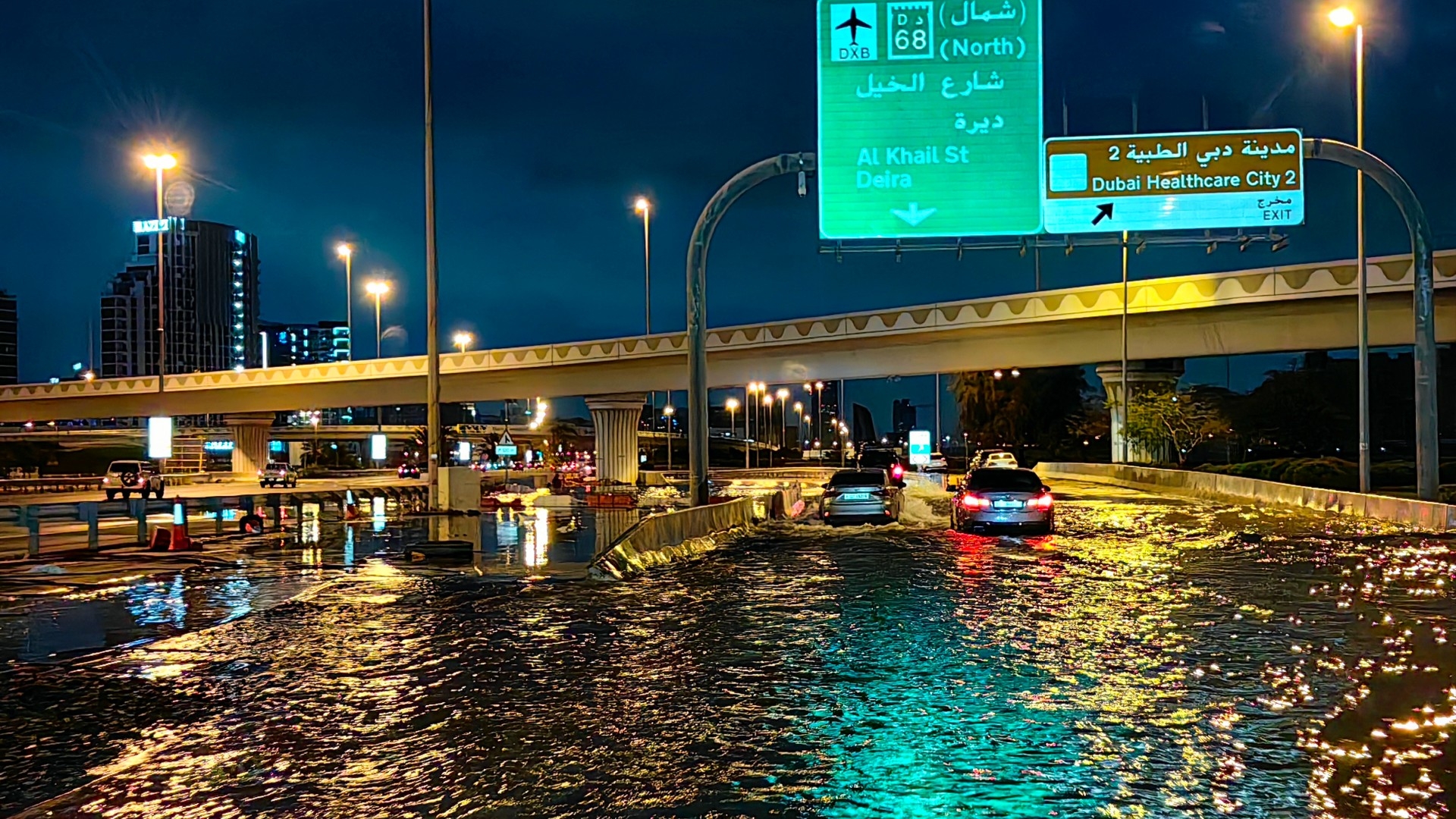
The death toll from severe flooding that hit the United Arab Emirates, Oman and other Gulf countries rose to almost 20 on Tuesday, with homes and businesses across the Gulf damaged by the heavy rains, and flights delayed or cancelled.
Analysts told Middle East Eye that climate change, infrastructure, the region's geography, and cloud seeding (in the UAE) may have exacerbated the flooding.
In Al Ain, an Emirati oasis city on the border with Oman, 254mm of rain was recorded in less than 24 hours, according to the National Meteorology Centre. That marked the highest level since records began in 1949.
An Emirati man in his 70s died after his vehicle was caught in the flooding in Ras al-Khaimah, one of the country's seven emirates, according to police.
The storms also hit Bahrain and parts of Qatar, days after flooding devastated neighbouring Oman.
Across Sunday and Monday, 18 people died in Oman as a result of heavy rain. Among the dead were at least nine schoolchildren, according to Oman News Agency.
Justin Dargin, a researcher at Oxford University specialising in climate and the Middle East, told MEE the "intensity and frequency" of destructive natural disasters in the region were linked to climate change.
"Climate change has indeed contributed to an increased risk of flooding across the Middle East. Jeddah, for example, has experienced a rise in unexpected heavy rainfall events in recent years," he said.
Mohammed Mahmoud, director of the climate and water programme at the Middle East Institute, said climate change "is an absolute driver of extreme weather".
He told MEE: "Though we mostly associate climate change with hotter temperatures, warming in coastal areas promotes severe rainfall and storms. Such is the case for the Gulf, where those surrounding warmer waters (close to the equator) help to generate storms that produce intense rainfall that cause these devastating flooding events."
Dargin said that infrastructural and geographic limitations also contributed.
"The region's arid climate, featuring sudden downpours combined with mountainous areas and desert valleys, creates conditions conducive to flash floods," he said, adding that limited drainage systems also worsened the impact.
To deal with water security issues, the UAE has since 2002 carried out cloud seeding: a weather modification procedure which involves implanting chemicals into the atmosphere to induce rainfall.
"Cloud seeding likely contributed to the severity," said Dargin. "However, the UAE's recent history of devastating flash floods, like those in 2020 and 2022, shows that recent bouts of heavy rainfall are the baseline of the increasing frequency of extreme rainfall events driven by climate change."
He said that cloud seeding could exacerbate such weather patterns and lead to even more severe flooding in future "if not undertaken judiciously".
The UAE government's National Center of Meteorology taskforce denied that cloud seeding had taken place in the run-up to this week's storms.
"One of the basic principles of cloud seeding is that you have to target clouds in its early stage before it rains, if you have a severe thunderstorm situation, then it is too late to conduct any seeding operation," Omar al-Yazeedi, deputy director of the task force, told CNBC.
Videos on social media showed collapsed roads and homes in the UAE, as well as vehicles completely submerged on Tuesday. One clip appeared to show planes taxiing across a flooded runway at Dubai International Airport.
The airport, the world's busiest for international traffic, saw significant disruption after passengers and crews struggled to arrive and depart on time. Several flights were cancelled or delayed on Tuesday.
Dubai, United Arab Emirates, experienced significant flooding on Tuesday, attributed to heavy rainfall.
— Middle East Eye (@MiddleEastEye) April 17, 2024
Dubai International Airport (DXB) reported that there will be temporary flight diversions for arriving flights, while departures continued operation. Officials state there is… pic.twitter.com/4QSFiaMv8Q
"We are working hard to recover operations as quickly as possible in very challenging conditions," said the X account of the airport.
Though the heavy rains eased, delays continued into Wednesday, as the Emirates airline suspended check-ins for departing passengers until midnight.
An Asian Champions League match between the UAE's Al Ain and Saudi Arabia's Al-Hilal was postponed due to the weather.
Skies were clearer on Wednesday morning, though Emirati authorities ordered all government workers and schools to continue working remotely for a second day.
Mahmoud said that to address such flooding events, countries would need "improved water drainage and routing infrastructure and advance warning systems [for residents]".
"But even those have limitations if the weather event is too severe," he added.
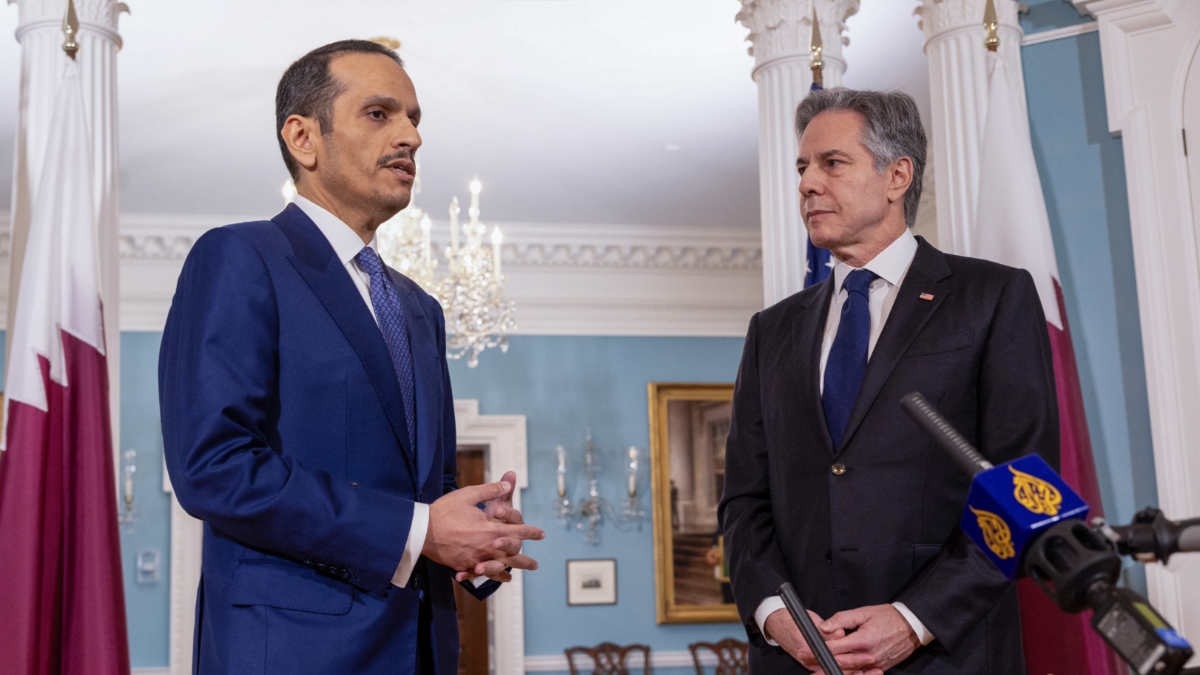
Qatar's embassy in Washington denounced senior Democratic lawmaker Steny Hoyer for threatening to "reevaluate" the US relationship with Doha over the inability of Hamas and Israel to reach a hostage deal.
"We share his (Hoyer's) frustration that Hamas and Israel have not reached an agreement on the release of the remaining hostages," Qatar's embassy said in a statement.
"But blaming and threatening the mediator is not constructive, especially when the target is a friend and Major Non-NATO Ally that presently hosts 10,000 US troops and America's largest military presence in the Middle East."
Qatar's rebuke of Hoyer came after the Democratic Congressman released a statement on Monday saying that Hamas had responded to Israel’s latest truce offer with “absurd demands and unfeasible requirements."
He said Hamas "sought to use its intermediary Qatar" to extract greater concessions from Israel, adding that Qatar finances, backs, and houses the US-designated terrorist organisation.
The claims riled the small, energy-rich Gulf monarchy which has long had to fend off criticism in the West.
For years, it has faced charges that it was too cosy with groups like the Muslim Brotherhood, while its state-owned media channel, Al Jazeera, has been attacked by supporters of Israel for its coverage of Palestine.
When Republican Senator Ted Budd accused Qatar in November of having a "pro-Hamas policy" that was a "significant liability", Qatar's ambassador to the US, Meshal bin Hamad al-Thani, took the lead and penned an opinion article in the Wall Street Journal, stating that his country doesn't endorse Hamas.
"The criticism from lawmakers and some US officials was seen as coming in bad faith by the Qataris, particularly at a time when they are negotiating on the US’s behalf," Kristian Coates Ulrichsen, an expert on the Gulf at the Baker Institute, previously told MEE.
Hamas was based in Damascus, Syria, until 2012, when it fell out with the Syrian government over the country’s civil war.
Qatar agreed to host the exiled leadership at the request of the US to maintain an indirect line of communication with the group, Qatari officials say.
Before 7 October, Qatar also coordinated directly with the US and Israel to finance electricity for Gaza, fund reconstruction projects and pay impoverished civil servants salaries.
Those payments were made with the approval of Prime Minister Benjamin Netanyahu, and analysts say it was beneficial for Israel in keeping the occupied West Bank and besieged Gaza Strip divided between Islamist Hamas and secular Fatah, the main party in the Palestinian Authority.
While Qatar is home to some Hamas officials, it also maintains indirect ties with Israel and is a linchpin in the US' security system in the region.
MEE reported on Monday that Qatar’s Al Udeid air base was one of the locations from which the US scrambled fighter jets to shoot down missiles and drones fired by Iran at Israel.
In November, Qatar, alongside Egypt, was able to leverage its ties with the US, Israel and Hamas to seal a temporary truce and deal for some of the hostages in Gaza.
Over the last five months, efforts to strike a new hostage deal have stalled, frustrating the Biden administration’s push to reduce tensions and shift focus to post-war plans for governing Gaza.
Hoyer said that if Qatar did not exert pressure on Hamas to strike a hostage deal -including expelling Hamas's political leader - the US "must reevaluate its relationship" with its Gulf partner.
Qatar said that "neither of the warring parties does anything for Qatar", referring to Hamas and Israel, "but it is useful to remember that Qatar’s mediation role exists only because we were asked by the United States in 2012 to play this role since, regrettably, Israel and Hamas refuse to speak to each other directly."
Analysts and diplomats say sealing a ceasefire to the Israel-Palestine war would be a major victory for Qatar, helping it realise its ambitions as being the Middle East's troubleshooter after its role as mediator in Afghanistan and supplier of liquefied natural gas to Europe after the Russian invasion of Ukraine.
"Qatar has come through as a saviour to the Biden administration time and again," Kirsten Fontenrose, a former head of Gulf affairs at the White House, told MEE, previously. "The [November] hostage deal has just cemented that role."
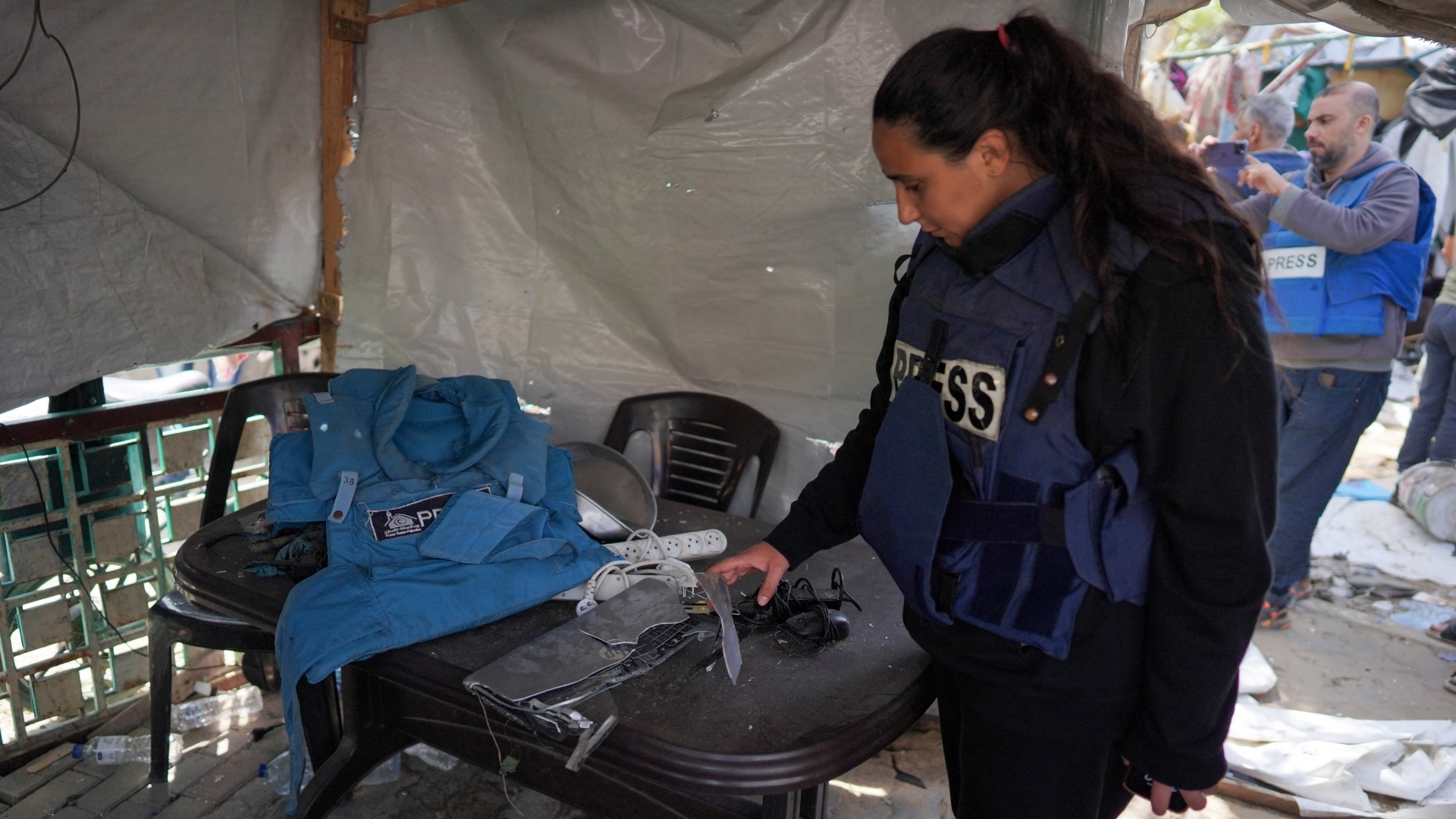
More than two dozen Palestinian journalists working inside and outside of Gaza published a letter on Tuesday calling on American journalists to boycott the annual White House correspondents' dinner, citing the US military support for Israel's war in Gaza that has killed scores of Palestinian journalists.
“As Palestinian journalists, we urgently appeal to you, our colleagues globally, with a demand for immediate and unwavering action against the Biden administration's ongoing complicity in the systematic slaughter and persecution of journalists in Gaza," the letter said.
“For Palestinian journalists in Gaza, the blue press vest does not offer us protection, but rather functions as a red target,” the signatories write in their letter.
Many of the letter's signatories chose to remain anonymous, out of fear their public signing of the letter could lead them to be targeted or killed by Israel's military.
However, it includes several prominent journalists who have been covering Israel's assault on Gaza from inside the enclave. Those names include Bisan Owda; Ali Jadallah; Hosam Salem; Mohammed Zaanoun; Ahmed El-Madhoun; and Mohamed Almasri.
The letter also includes signatures from renowned journalists working outside of Gaza, such as Mariam Barghouti, Mohammed El Kurd, and Said Arikat, the Washington bureau chief for Al-Quds newspaper.
Israel's war on Gaza began in October, after Hamas and other Palestinian armed groups launched an attack on southern Israel, killing 1,200 people and taking more than 200 people hostage.
Israel responded with a declaration of war and launched a devastating and indiscriminate bombing campaign followed by a ground invasion of Gaza that has killed more than 33,000 Palestinians.
During this time, Israeli forces have also killed at least 125 journalists, which the letter says makes up 10 percent of Gaza's community of journalists.
CNN chief international anchor Christiane Amanpour says “our major problem covering Israel-Gaza right now… is that we can't get there”.
— Middle East Eye (@MiddleEastEye) April 12, 2024
Amanpour says it is “an unprecedented situation” where independent Western journalists are not on the ground in Gaza. pic.twitter.com/Ikd7w1555S
The letter points to the lack of coverage and attention paid to the killing of Gaza's journalists during Israel's war.
CNN's Christine Amanpour recently stated that the problem with the coverage of the Gaza war was that "journalists are not on the ground in Gaza". The comment was met with outrage from Palestinian journalists who said the remark equated to an erasure of their work in Gaza.
Amanpour quickly clarified that what she meant was there were no "independent, western journalists" in the enclave reporting on the war, but those comments were further criticised as asserting that Palestinian journalists are unable to accurately tell their stories.
“We cannot overlook the White House Correspondents' Dinner’s role in legitimizing and whitewashing the same deadly propaganda and policies coming out of the Biden administration during its daily press briefings by bringing journalists together to sit and laugh with the President, while ignoring his complicity in the assassinations and targeting of Palestinian journalists in Gaza,” Nasser Abu Baker, president of the Palestinian Journalists Syndicate, said in a statement.
“For our members and colleagues in Gaza, we, the Palestinian Journalist Syndicate, call upon our fellow journalists to boycott the White House Correspondents' Dinner. Let absence speak louder than any words we might utter at that table.”
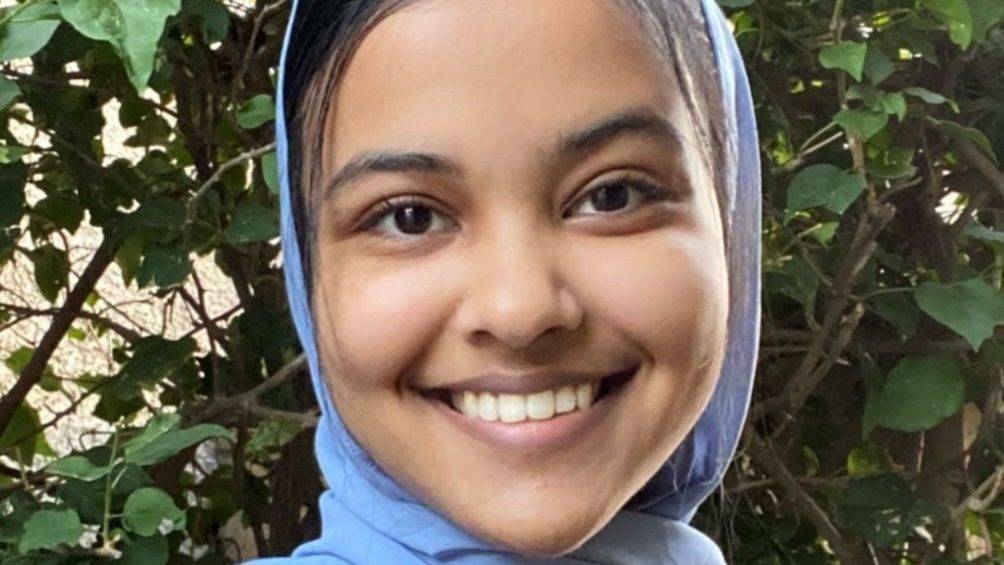
The University of Southern California has cancelled a scheduled commencement speech by Asna Tabassum, citing unnamed security concerns after her selection as valedictorian was met with a wave of online attacks directed at her pro-Palestinian views.
"I am not surprised by those who attempt to propagate hatred. I am surprised that my own university - my home for four years - has abandoned me," Tabassum said in a statement shared online.
On 6 April, USC announced that Tabassum was selected as valedictorian, a student with the highest academic achievements in her year, for the graduating class of 2024.
After the announcement was published on social media, Tabassum began receiving online attacks from an account named, "We Are Tov", a group that describes itself as "dedicated to combating antisemitism".
The group's Instagram account posted Tabassum’s image and said she “openly promotes antisemitic writings”. The group also attacked her for liking Instagram posts from the student group, Trojans for Palestine.
Another group, Trojans for Israel, called for the university to reconsider Tabassum's appointment, alleging she used “antisemitic and anti-Zionist rhetoric”.
The university released a statement on Monday, saying that Tabassum would retain her position as valedictorian, but would not be allowed to give her commencement speech. The school said that the move was made to maintain safety on campus.
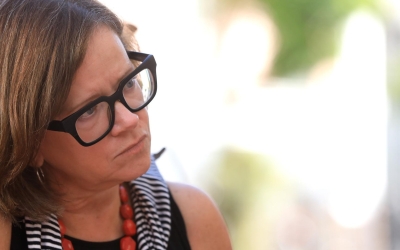
"After careful consideration, we have decided that our student valedictorian will not deliver a speech at commencement," the school said in a statement.
"To be clear: this decision has nothing to do with freedom of speech. There is no free-speech entitlement to speak at a commencement. The issue here is how best to maintain campus security and safety, period."
The move to cancel her commencement speech was met with outrage from Muslim civil rights groups.
"This decision to cancel Asna's speech empowers voices of hate, violates USC's obligation to protect its students, and sends a terrible message to not only Muslim students at USC but all students who dare to express support for Palestinian humanity," the Council on American-Islamic Relations said in a statement.
Since Israel's war in Gaza began in October, universities across the country have been cracking down on pro-Palestinian speech and activity.
Several schools were quick to ban the student groups, Students for Justice in Palestine and Jewish Voice for Peace.
On Sunday, a leading American political theorist was placed on leave from her tenured position at Hobart and William Smith Colleges in New York, after she wrote an essay on how mainstream academia has tried to police how people feel about the Hamas-led break out of Gaza on 7 October.
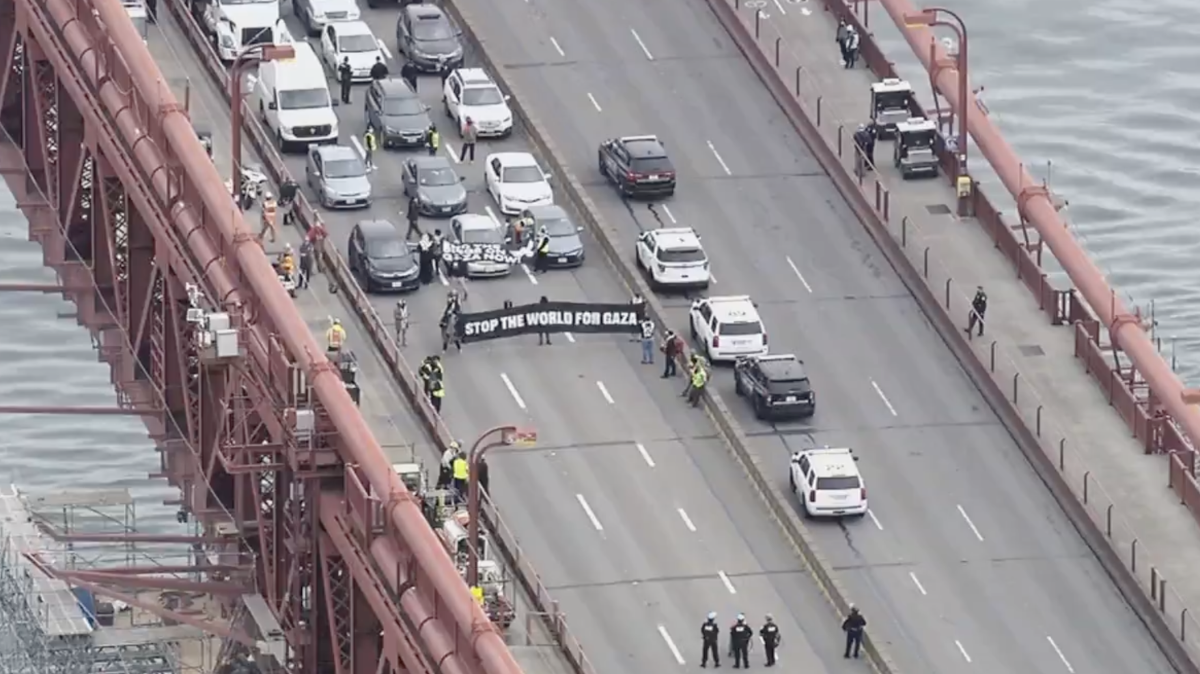
Pro-Palestinians protestors wreaked havoc on commuters on San Francisco's Golden Gate Bridge on Monday, as demonstrators fanned out across the US to demand a ceasefire in Gaza.
Footage of the bridge on Monday morning showed traffic stationary in one direction, while lanes going in the other direction were empty as police were present.
The protest was part of a wider movement across the US organised by the group, A15 Action, which sought to demonstrate “solidarity with Palestine” through a multi-city blockade that imposed “pain to the economy”.
"In each city, we will identify and blockade major choke points in the economy, focusing on points of production and circulation with the aim of causing the most economic impact," the group said on its website.
In Connecticut, protestors blocked access to an aerospace manufacturer, and in Oregon, they temporarily shut down a highway.
In New York, traffic on the Brooklyn Bridge was temporarily halted, and in Chicago, the highway leading to O'Hare International Airport was shut down. Social media footage showed some passengers making their way to the airport on foot to catch their flights.
Protests were also planned in Canada, Italy, South Korea, Colombia and Belgium, while the X account for A15 posted photos of demonstrations in Greece, Spain and Australia.
Demonstrators who were blocking traffic on the Golden Gate Bridge held a banner reading, "Stop the world for Gaza."
Aerial footage from ABC7 News shows pro-Palestine protesters shutting down Highway 101 on the Golden Gate Bridge in San Francisco, blocking traffic and calling for a ceasefire in Gaza on Monday.
— Middle East Eye (@MiddleEastEye) April 16, 2024
Protesters could be seen carrying banners reading, “Stop the World for Gaza” and… pic.twitter.com/wj7MOJUpQD
“There is a sense in the streets in this recent and unprecedented movement for Palestine that escalation has become necessary: there is a need to shift from symbolic actions to those that cause pain to the economy,” the organisers said.
The protests come as the war in Gaza risks erupting into a full-blown regional conflict. On Saturday, Iran launched a historic missile and drone attack on Israel in response to a strike on its consulate in Damascus, Syria, which killed several senior Revolutionary Guard Corps commanders.
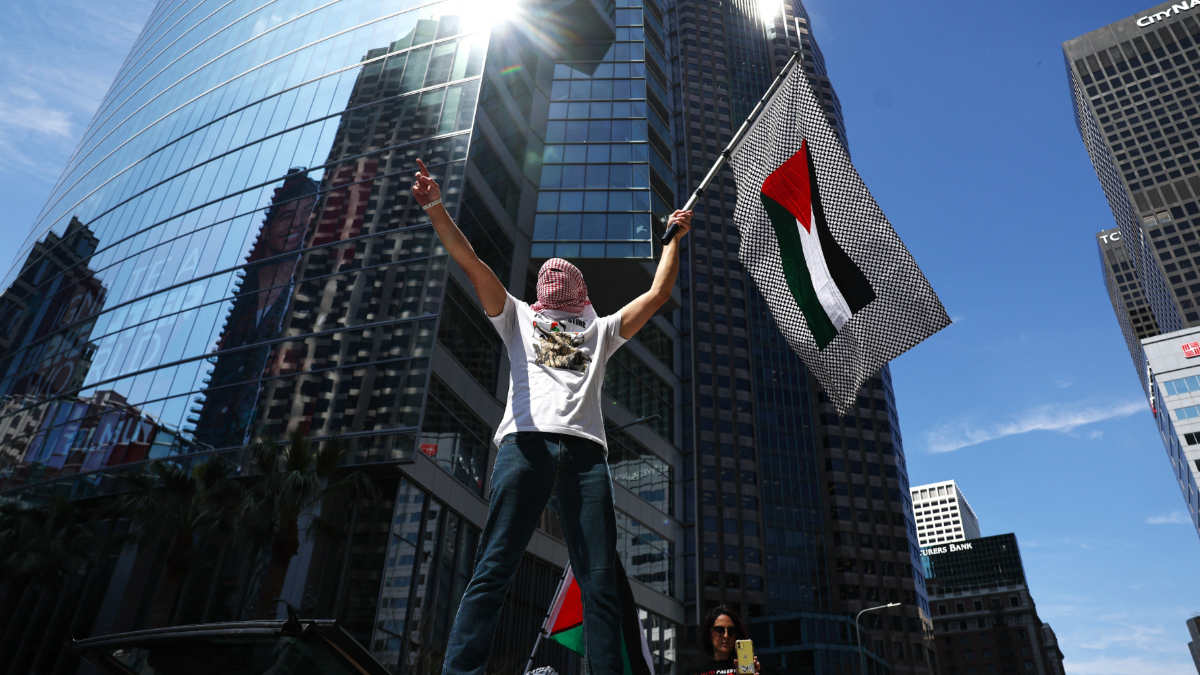
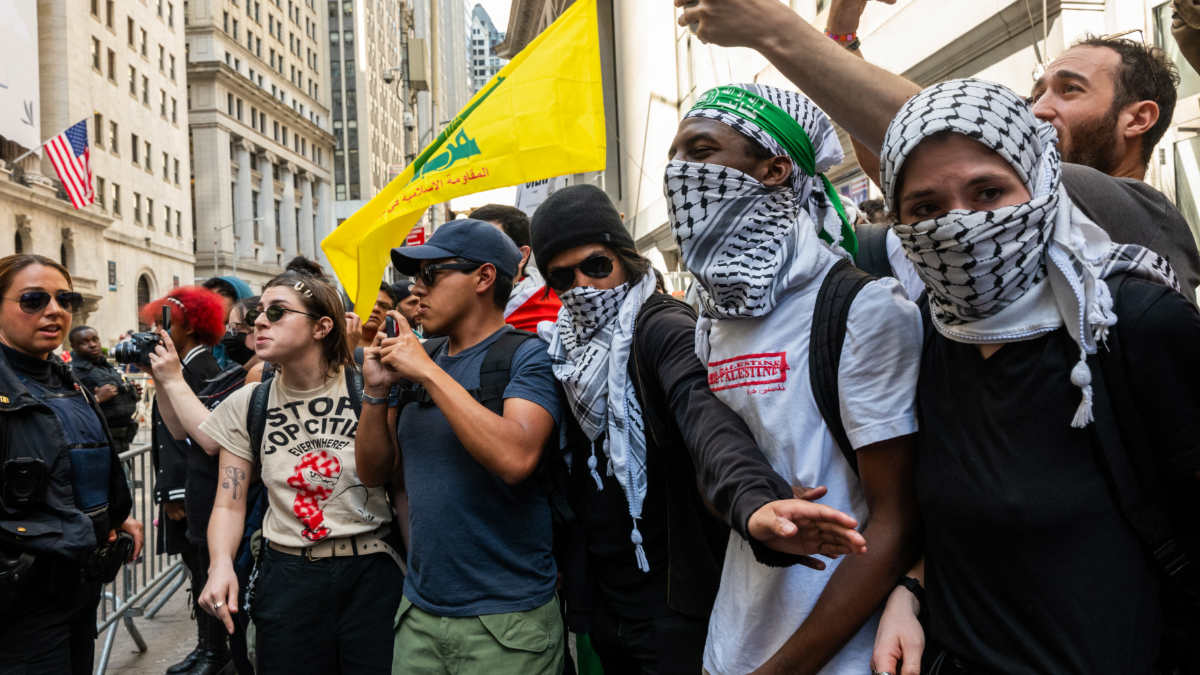
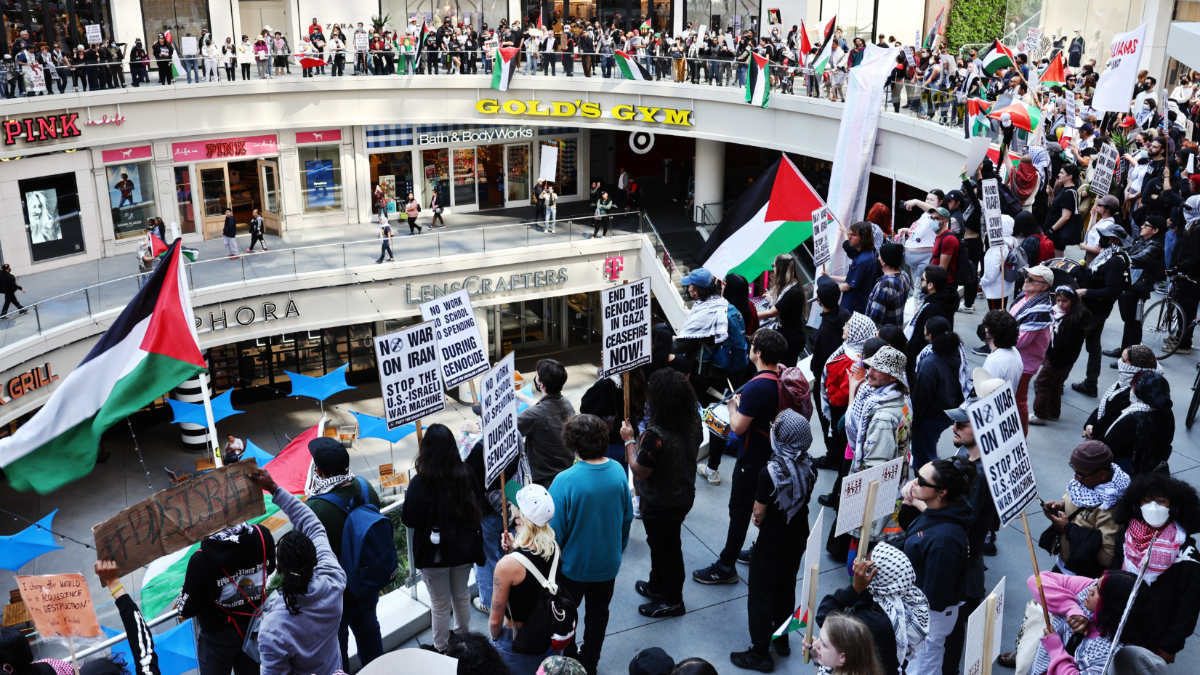
While the US cobbled together a coalition of allies to defend Israel, Iran’s attack comes as ties between the Biden administration and Prime Minister Benjamin Netanyahu’s government deteriorate.
Israel launched a devastating offensive on Gaza after the Hamas-led 7 October attacks on southern Israel killed around 1,200 and saw over 200 taken back to Gaza as hostages.
Brooklyn Bridge New York USA comes to a complete standstill as people protest against the #GazaGenocide by #IsraeliTerroristIDF
— Ria ❣️🖤 🕊️ 💚 (@SemiticRia) April 16, 2024
pic.twitter.com/tQGBvnU8tx
At least 33,797 Palestinians, mostly women and children, have been killed as a result of Israel’s offensive.
Biden is under pressure to rein in US support for Israel, including billions of dollars of arms transfers, ahead of the November 2024 US presidential elections.
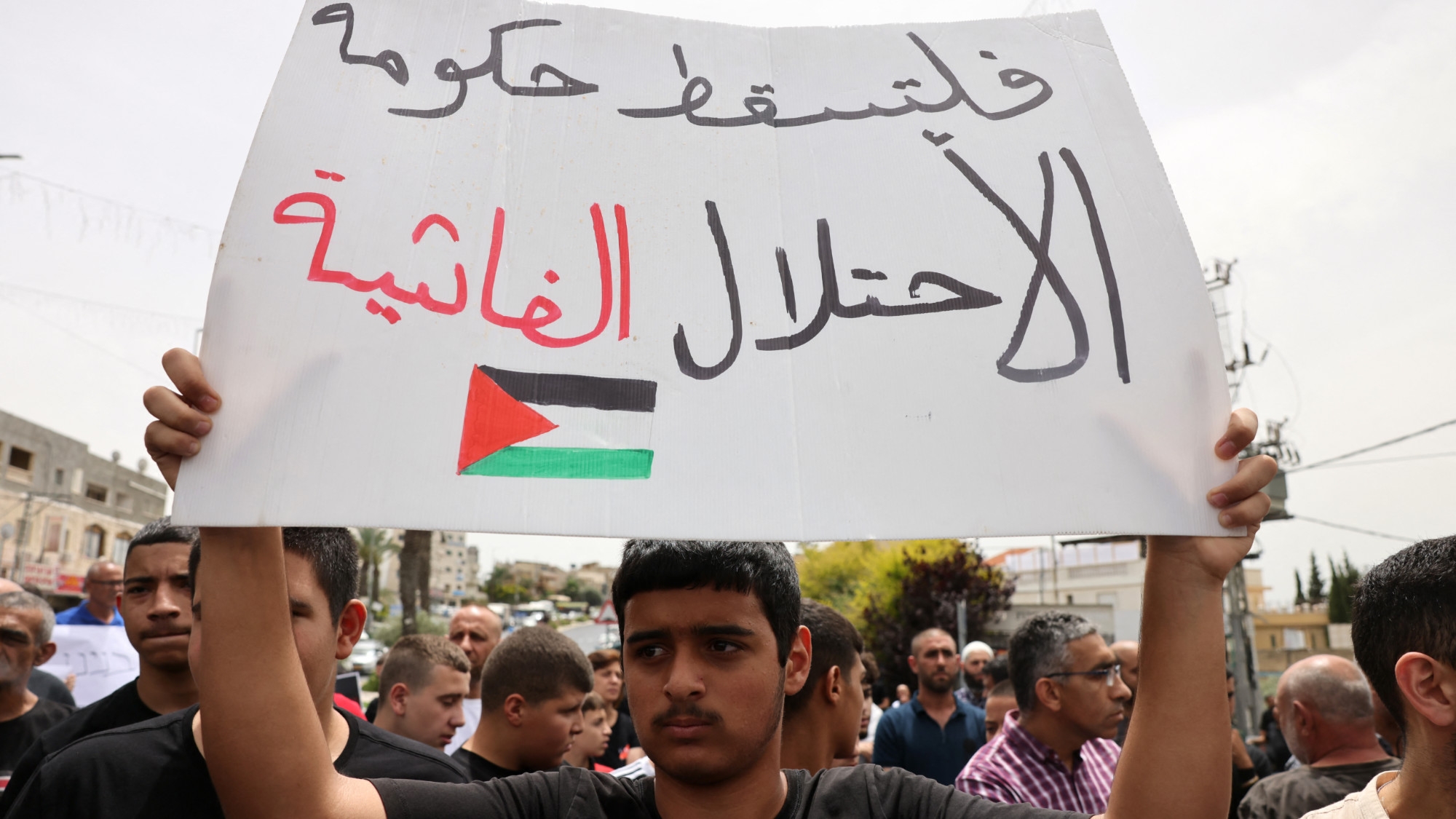
A document prepared by Israel’s Attorney General’s office reportedly reveals plans to criminalise social media posts containing the Arabic word for martyr "shaheed", as well as Quran verses used in particular contexts, Israeli news site Ynet reported on Tuesday.
The disclosure of the document came during secret deliberations of the Constitution, Law and Justice Committee in the Knesset, the Israeli parliament.
According to Ynet, Simcha Rothman, the committee’s chairman, accused public prosecutors of being “lenient” in pursuing those who shared “inciting” social media posts after the war on Gaza started.
Rothman made references to posts that included religious prayers, invocations to God and the use of the word shaheed.
In response, Deputy State Attorney Alon Altman revealed there was already a policy in place to deal with such posts but prosecution depended on the context, a reference to the document, which contains guidance on prosecuting those accused of incitement.
According to the document, using the word martyr to refer to someone killed by Israeli forces while “carrying out a terrorist attack” can be viewed as “ support or praise for the terrorist act”.
The policy also states that investigation can be initiated against users who post supplications to God linked to persons or events deemed connected to a “terrorist act”.
In unclear cases, investigations can be opened based on “reasonable suspicion”.
However, Altman said that the religious text is not criminalised in and of itself, according to Ynet.
Since the Israeli war on Gaza began in October, Palestinian citizens of Israel say they have faced repressive measures implemented by authorities, including arrests for social media posts, bans on peaceful anti-war protests, and dismissals from jobs and universities over their views on the conflict.
According to rights group Adalah, which advocates for Palestinian rights in Israel, hundreds of people have been arrested in relation to their social media posts since the start of the war.
Popular Palestinian folk singer Dalal Abu Amneh was arrested in mid-October following two social media posts that included links to charities working in Gaza and captions that read: “Lord, grant me relief and mercy” and “There’s no victor except God".
She was later released.
Palestinian citizens of Israel are the descendants of Palestine's native population, who remained within territory controlled by the nascent Israeli state in 1948. The majority of the Palestinian population was violently displaced by Zionist militias during the creation of Israel in 1948.
Today, there are more than two million Palestinian citizens of Israel, which equates to nearly 20 percent of the country's total population.
For decades, they have suffered under discriminatory laws and practices imposed by the Israeli state, and have long complained they face inequality.

The wife of a former Team Great Britain cyclist has caused an online uproar after saying that there were “no innocent" Palestinians in Gaza and describing Muslims as a “drain on society” in an outburst on social media on Monday.
Michelle Froome, wife and agent of four-time Tour de France winner Chris Froome, launched a tirade against the Palestinians and Hamas, as well as pro-Palestine protesters and Muslims in a series of posts on social media platform X, formerly Twitter.
Chris Froome currently rides for the Israel-Premier Tech cycling team, which is owned by Israeli billionaires Sylvan Adams and Ron Baron.
“I’m sick of sitting idly by quietly supporting Israel while the Hamas propaganda takes over social media. Enough is enough!” Michelle Froome wrote in one post to her 15,000 followers.
“The silent majority needs to stand up and be heard. We don’t want your religion, we don’t want your beliefs. It is not compatible with modern civilisation.”
As of Tuesday, Froome's X account was no longer active. However, screenshots of her posts continue to be shared on the platform.
“Women’s rights matter! Gay rights matter! Trans rights matter! Hamas doesn’t support any of those. Take the blindfolds off and see the reality of the hatred they are spreading. There are no innocent Gazans,” Froome wrote.
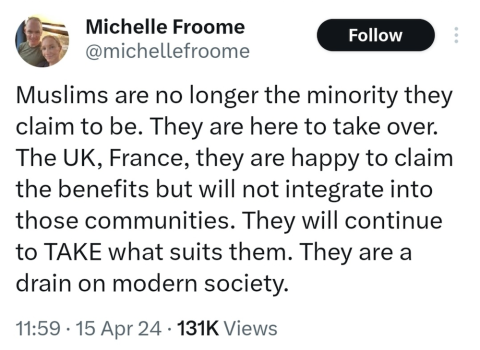
Social media users slammed Froome’s statements, with many describing them as racist and dehumanising.
One user underlined that her rhetoric could have real implications on Muslim citizens, writing on X: “Brazen racism from Michelle Froome. Zero consequences.”
“This is pure incitement and her racist followers will be compelled to act. This is exactly the Great Replacement nonsense that led to the Christchurch mosque massacre. But Michelle knows that,” the user said.
"There are no innocent Gazans", says @michellefroome, wife of UK Olympic winning cyclist @chrisfroome, going full blown depraved, unhinged, dehumanising racist.
— Joseph Willits (@josephwillits) April 16, 2024
The levels of dehumanisation of Palestinians in Gaza to justify Israel's genocide against them are constant. pic.twitter.com/KJbD16bwkv
Other X users responded by defending the Muslim community in Britain.
“Muslims here contribute a huge amount to (in no particular order) the NHS, schools, charities, and the economy,” another user said. “And in turn are far more likely to be affected by prejudice.”
Some social media users also accused Froome of hypocrisy, pointing out that she lives in Monaco, considered a tax haven, while describing UK Muslims as a burden.
“Tell me how much income tax you pay to contribute towards Monaco society?” one X user replied. “What a shockingly racist thing to say.”
Middle East Eye has reached out to Froome for comment.
Michelle Froome's posts came as pro-Palestine activists have increased calls for protests at the upcoming Giro d’Italia and Tour de France amid Israel’s ongoing assault on Gaza, which has killed over 33,600 Palestinians, the vast majority of them women and children.
I hope every single sponsor connected to your husband drops him ASAP. What a fine job you've done of destroying his brand
— Sultan of Spin (@AtheistCyclist1) April 15, 2024
Israel-Premier Tech distanced itself from Froome's comments, telling the cycling outlet road.cc: “Any comments or beliefs made public by third parties associated with the team's riders or staff do not represent Israel-Premier Tech, its team members, or its partners.”
Earlier this year, the team removed the word "Israel" from its vehicles as part of what they described as precautionary measures.
The official Boycott, Divestment and Sanctions (BDS) site also posted a call earlier this month for demonstrations, titled “road closed to genocide”, saying the famous cycling races were “shamefully rewarding” Israel and helping it “sportswash its gravest crimes” by permitting Israel-Premier Tech to compete.

A British Muslim student has lost a High Court challenge against a London school's ban on prayer rituals, in a case about freedom of religion that has captured national attention.
The pupil, who cannot be named, took legal action against Michaela Community School north west London, claiming the policy was discriminatory and "uniquely" affects her faith due to its ritualised nature.
She alleged that the school's stance on prayer – one of the five pillars of Islam – was "the kind of discrimination which makes religious minorities feel alienated from society", a judge was told.
The court was told the pupil, referred to only as TTT, was making a "modest" request to be allowed to pray for around five minutes at lunchtime, on dates when faith rules required it, but not during lessons.
The student also challenged allegedly unfair decisions to temporarily suspend her from school. The school's lawyers claimed its prayer policy was "justified" and "proportionate" after it faced death and bomb threats linked to religious observance on site.
In a written ruling, Justice Thomas Linden dismissed the pupil's arguments, ruling that by enrolling at the school she had effectively accepted being subject to restrictions on manifesting her faith.
He concluded that the prayer ritual policy was "proportionate" and its aims and ability to achieve them "outweighs" any "adverse effects" on the rights of Muslim pupils at the school.
The judge added that the pupil could perform "Qada" prayers for missing prayers earlier in the day "to mitigate the failure to pray within the allotted window."
According to the written ruling, the school's founder and headteacher, Katharine Birbalsingh, said she had spoken with an Imam at the London Central Mosque and Islamic Cultural Centre who said observant Muslim pupils who miss the midday prayer, or dhuhr prayer, can make it up later in the day.
According to the judgement, Birbalsingh also said the Imam offered to speak to any Muslim parents who had doubts on this point.
The student and her mother said through their lawyers that they were upset with the ruling.
"Even though I lost, I still feel that I did the right thing in seeking to challenge the ban," the girl said. "I tried my best and was true to myself and my religion."
In March 2023, up to 30 students began praying in the school's yard, using blazers to kneel on.
Lawyers for the school said students seen praying outside contributed to a "concerted campaign" on social media over the school's approach to religion, with there also being a since-removed online petition attracting thousands of signatures.
Following the verdict, Birbalsingh, who has gained a reputation for strictness and regularly appears as a commentators on British TV, said "a school should be free to do what is right for the pupils it serves."
She also claimed that a tiny number of Muslim students had forced others "to fast, to pray, to drop out of the choir, to wear a hijab."
"Schools should not be forced by one child and her mother to change its approach simply because they have decided they don’t like something at the school," she said.

A former deputy head of Israel's National Security Council has denied that Israel has a mandate to attack Iran despite the strikes on Saturday night.
In a post published in The Times of Israel, Eran Etzion argued that Saturday night was "historic" regarding the ongoing confrontation between Israel, the US and Iran. But he stated that voices calling for an attack on Iran coming from the Israeli government could put Israel in diplomatic isolation from its allies.
Israeli Prime Minister Benjamin Netanyahu, who according to polls enjoys the support of only 20 percent of the Israeli public, can't order an attack on Iran without the approval of US President Joe Biden, according to Etzion.
"Netanyahu and the Israeli government do not have a mandate for any strategic decision except for two returns - the return of the hostages… and the return of the mandate to the Israeli people, who will choose a proper and clean leadership," he wrote.
Israel has already scored two important strategic victories over Iran, wrote Amos Yadlin, a former chief of military intelligence.
"Iran's aggressive and precedent-setting response to the assassination in Damascus exceeded Israel's expectations," he wrote for Mako.
But the interception of 99 percent of more than 300 missiles and drones as reported in Israeli media can be viewed as a victory for Israel, US and her allies.
More importantly, said Yadlin, it was a strategic victory over Iran.
"Israel has an interest in exacting a price from Iran for its aggression, while at the same time avoiding turning the war in Gaza into a broad regional conflict with Iran, which could deteriorate into a severe war on the northern front as well," he wrote.
According to Yadlin, Israel's means of exacting a price from Iran is through "an announcement that Israel will be ready to stop the war in Gaza after all the hostages are returned".
A deal of that sort will open the way for Israel to normalise relations with Saudi Arabia and strengthen the anti-Iran coalition in the region.
Iran's missile and drone attack is the latest failure of Netanyahu's tenure as prime minister of Israel says Yossi Verter, a senior political columnist in Haaretz.
Verter said that Netanyahu, who has pitched himself as "Mr Security" multiple times in the past, has now brought Israel under threats from Gaza, Lebanon, Yemen and Iran.
"Children in Israel were born, grew up, went to the army and graduated under the impression that only one person is capable of handling the Iranian nuclear threat," he said.
According to Verter, Netanyahu's failure to anticipate Iran's Saturday attack stemmed from a similar weakness that led to the Hamas attack on 7 October.
"The longer Netanyahu's tenure lasts, the weaker Israel is perceived to be. Unfortunately, this is not just a perception," he wrote.
Biden is telling Netanyahu not to attack Iran, but his far-right senior ministers and partners are calling on him to carry out a harsh military response.
According to Verter, under the current government of Israel, the regional coalition led by the US is under severe danger because Netanyahu is a "captive" of his right-wing partners.
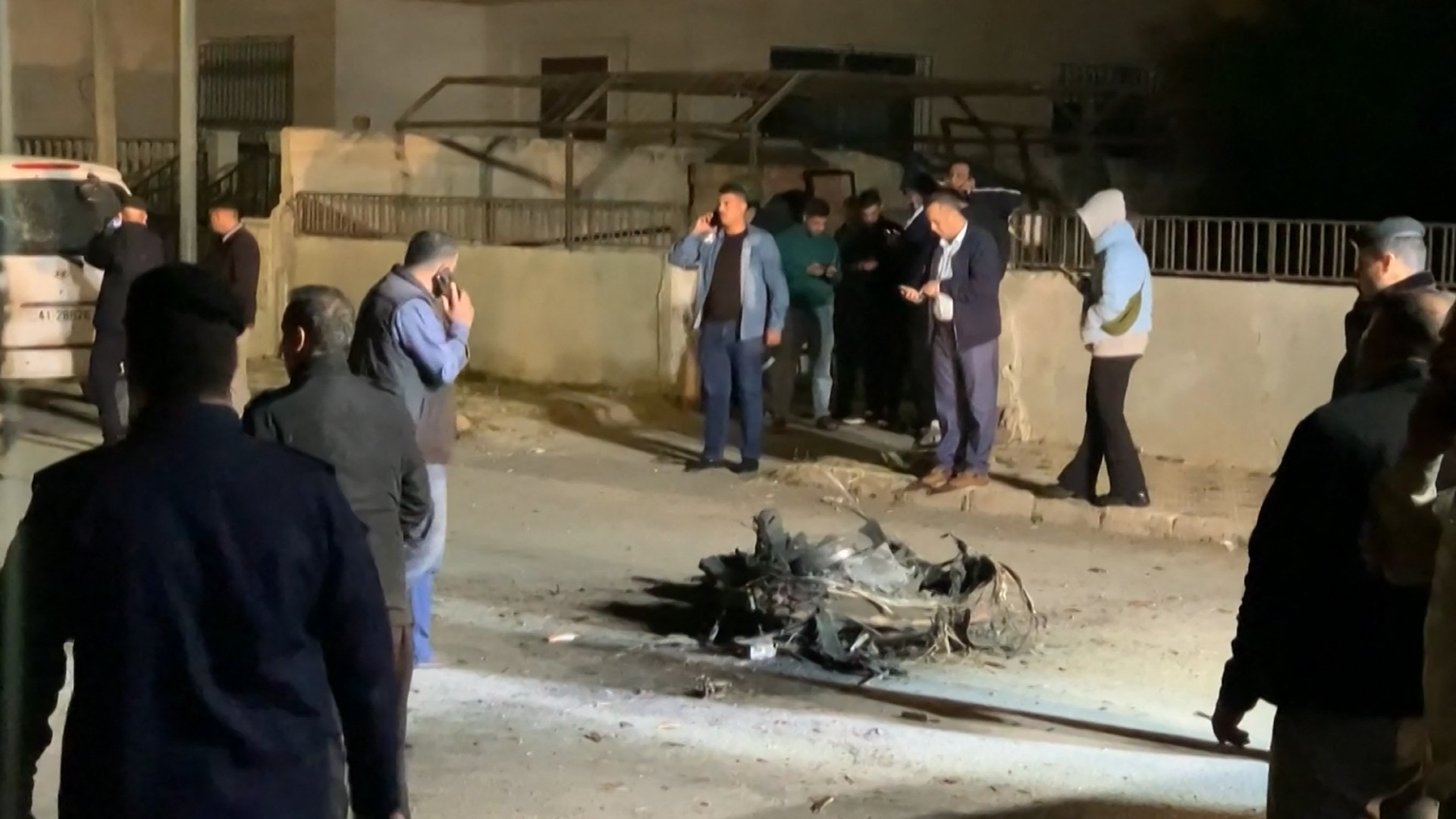
Jordan's involvement in intercepting Iranian projectiles bound for Israel over the weekend has sparked questions about its security relationship with Israel, in a country with the highest population of Palestinian refugees.
Amman joined Israel, the US, UK and France in shooting down around 300 drones and missiles on Saturday night, in the first direct Iranian attack targeting Israeli territory.
The operation was in response to Israeli strikes on the Iranian consular building in Syria earlier this month that killed seven members of Iran's Islamic Revolutionary Guard Corps.
Jordan reportedly intercepted missiles near the Jordan Valley and along the border with Syria. It marked a rare occasion of an Arab country appearing to directly come to the defence of Israel.
Jordan was quick to state that it was defending itself, not Israel.
"Some flying objects that entered our airspace last night were dealt with and confronted to prevent them from endangering the safety of our citizens and residential and populated areas," Jordanian Foreign Minister Ayman Safadi said on Sunday.
The act garnered mixed reactions amongst commentators.
Israeli analyst Mairav Zonszein described it as “especially remarkable for [a] generation of Israelis who remembers sheltering from attacks from Jordan”. She said it showed “diplomatic deals are vital for stability”.
Meanwhile, Dima Khatib, the managing director of AJ+, criticised the interceptions, labelling them “a shocking scene”.
“Sister countries are responding, not to the attack of Israeli planes, drones and missiles on Palestine, but to an attack on Israel,” she said.
According to a report in the Wall Street Journal, Saudi Arabia and the UAE privately agreed to share intelligence with the US to thwart Iran's attack, while Jordan opened its airspace to Washington and its allies.
Michael A Horowitz, a security analyst at consultancy Le Beck International, said that the notion Jordan was protecting its sovereignty “cannot be dismissed”.
“Hundreds of drones and missiles overflew Jordan. No country would allow this to happen, no matter the target, particularly knowing that some Iranian missiles and drones can and have failed,” he told Middle East Eye.
Sean Yom, an expert on Jordanian politics and foreign policy, said the Hashemite kingdom’s defensive actions were “not an error, but a strategic necessity”.
“The Iranian missiles and drones were, technically, in violation of Jordanian sovereignty by entering its airspace,” he told MEE.
“Further, with the US leading much of the anti-air defensive strategy, and having considerable military forces in Jordan, it would have been impossible to stand idle.”
Yom said that the actions showed Jordan and Israel’s relationship were bound “in a triangular sense” by American guarantees of mutual security and foreign aid.
Jordan has the largest number of Palestinian refugees of any country, with over 2.2 million officially registered by the United Nations.
The actual number of Palestinians in the country is believed to be considerably higher.
It established diplomatic relations with Israel in 1994 to engage on economic and security affairs, but the two country's dealings have mostly been kept out of the limelight.
'The Jordanian government cannot abrogate its peace agreement with Israel, or change the situation, because much of these geopolitical power dynamics flow firstly through Washington'
- Sean Yom, expert on Jordanian politics
One of the most public interactions between the two was a memorandum of understanding on water and energy agreed in 2022.
The deal would have seen Jordan build a solar plant with capacity to export 600 megawatts of energy to Israel, in return for Israel supplying Jordan with 200 million cubic metres of desalinated water.
But in November, weeks after the outbreak of war in Gaza, Jordan indicated that it would no longer go ahead with the plans.
Horowitz said that the kingdom’s intervention over the weekend did not necessarily show a deepening of ties with Israel.
“Of course in Israel, this is going to be spun this way, but the realities are that Jordan and Israel have butted heads very frequently,” he said.
Jordan has strongly condemned Israel’s war on Gaza, and backed South Africa’s case at the International Court of Justice accusing Israel of committing genocide in the enclave.
But many Jordanians want the kingdom to go further. For weeks, protesters gathered outside the Israeli embassy in Amman daily during Ramadan, demanding its closure and an end to normalisation.
Jordanian authorities have clamped down on such protests, detaining hundreds of activists since 7 October. Over 1,500 activists in Jordan have been prosecuted over the protests, according to lawyer Louay Obeidat.
While most have been released, dozens are still in administrative detention and around seven are thought to have been forcibly disappeared.
“The Jordanian interception carries with it significant domestic and international risks,” said Horowitz.
“We’ve seen a rise in anti-Israel protests in Jordan just before the Iranian attack. Positioning Jordan as a ‘defender of Israel’ certainly won’t please anti-Israel crowds inside Jordan, and there is always a risk that anger at Israel will eventually be directed at the monarchy.”
Yom said both the Jordanian government and its people have clearly demonstrated their “disgust” with Israel’s government and their “absolute horror with the humanitarian tragedy and crimes happening in Gaza at the hands of the Israeli military”.
“But the Jordanian government cannot abrogate its peace agreement with Israel, or change the situation, because much of these geopolitical power dynamics flow firstly through Washington, which dictates the rules of the game.”

A US federal judge dismissed a series of lawsuits against Libyan military commander Khalifa Haftar, in which the military leader and former US resident was accused of extrajudicial killings of civilians in his assault on the Libyan capital of Tripoli in 2019.
District judge Leonie Brinkema dismissed the case on the grounds that the American court has no jurisdiction over the matter.
The ruling is a major pivot in the trajectory of the years-long legal battle. In 2022, judge Brinkema issued a default judgement saying that Haftar, a US citizen, was liable for war crimes against several Libyan families who accused him of extrajudicial killings and torture.
Several Libyan families had filed lawsuits against Haftar in US courts in 2019 and 2020, saying the Libyan commander was guilty of torturing and killing their relatives.
The families filed their lawsuits under the Torture Victim Protection Act of 1991, a law that allows non-US citizens to seek compensation from individuals who, acting in an official capacity for any foreign nation, allegedly committed torture or extrajudicial killing.
After the judge ruled Haftar was liable for war crimes in 2022, the military commander retained new lawyers and went on to sit for two depositions in 2022 and 2023, where he denied launching attacks on civilians.
Middle East Eye also reported in 2022 that Haftar's family was quietly liquidating their portfolio of US real estate, selling a multimillion-dollar Virginia home, along with a townhouse and other six-figure properties.
A lawyer for the plaintiffs of one of the lawsuits told the Associated Press that they plan to appeal the dismissal.
A former CIA asset, Haftar returned to Libya following the country's 2011 uprising and served in the internationally recognised government until 2014, when civil war broke out in the country.
In 2019, he mounted a 14-month campaign to take control of the country's capital, Tripoli. Fighting soon devolved into a proxy conflict with his Libyan National Army (LNA) receiving support from Russia, the United Arab Emirates, Egypt, and Chadian and Sudanese fighters as well as other mercenary groups.
Haftar was eventually pushed back after Turkey intervened by providing fighters, combat drones and military equipment to support the UN-backed government in Tripoli.
Potential war crimes by Haftar's forces and allied groups have been well documented, including by Middle East Eye in 2020 when it investigated and revealed mass graves found in the city of Tarhuna.
Following a ceasefire in October 2020 and the establishment of a new unity government, Libya was headed toward elections in December 2021, but the vote was delayed due to a constitutional crisis and the country continues to remain politically divided.
Last month, three key Libyan leaders said they agreed on the "necessity" of forming a new unified government and holding elections in the country.
While all major political players in the country have called for elections, many Libyans doubt they genuinely seek a vote that could remove most of them from power.

An Israeli court has ordered the forced removal of three Palestinian families from their homes in Sheikh Jarrah, the Palestinian neighbourhood of occupied East Jerusalem, Wafa news agency has reported.
The authorities gave the families, consisting of 20 people, until mid-July to evacuate their homes.
According to one of the home owners, Saleh Diab, the Jerusalem Magistrate court had a hearing regarding the case in May 2023, where the judge heard that the Israeli Supreme Court decided to freeze evictions of 28 Palestinian families in Sheikh Jarrah.
Diab told Wafa that the judge reopened the case under pressure from The Nahalat Shimon settler group. The group have been active in pursuing eviction orders issued by Israeli courts against Palestinian families.
According to Diab, the three families have lived in the houses for 56 years and have been battling eviction orders since 2009.
Since Israel seized East Jerusalem in the 1967 war, Israeli settler organisations have claimed ownership of the land in Sheikh Jarrah and have filed multiple successful lawsuits to evict Palestinians from the neighbourhood. Settlers say that Jewish families lived in the area before 1917, and that the properties belong to them.
Over 500 Palestinians living in 28 houses in Sheikh Jarrah are facing court order evictions.
The neighbourhood became a significant flashpoint after Israeli tried to expel Palestinian families from the area in May 2021 to make way for Israeli settlers.
The violence led to widespread protests in the occupied West Bank and a large-scale military campaign on Gaza.

Conservative politicians, business and charity leaders are planning to boycott a Downing Street Eid reception on Monday over government support for Israel, the BBC has reported.
Foreign Secretary David Cameron urged invitees to “put aside political differences” and attend the annual celebration, hosted by Prime Minister Rishi Sunak.
According to the BBC report, sources in Downing Street have privately expressed concern at the number of people who might boycott the reception because of their opposition to Israel’s ongoing assault on Gaza.
Conservative peer Baroness Sayeeda Warsi is reportedly among the politicians boycotting the event, along with at least two other Tory MPs.
Baroness Warsi, who was Britain’s first female Muslim cabinet minister, resigned from the cabinet over Britain’s support for an earlier Israeli assault on Gaza in 2014.
A No 10 spokesperson said the UK government “share[s] the deep concern that many British Muslims have over the humanitarian crisis in Gaza and our priority has always been to avoid further escalation in the region".
The Israeli war on Gaza has pushed more than 2.2 million Palestinians to the brink of humanitarian disaste nd famine.
At least 33,700 people have been killed and over 76,000 wounded in Israeli attacks, which have also caused widespread destruction to the health system, infrastructure and housing units.
Asif Ansari, a leading businessman and charity fundraiser, told the BBC that the UK’s continued arms exports to Israel following the International Court of Justice’s ruling which found a “plausible risk” it was committing genocide in Gaza and the killing of seven international aid workers by Israeli air strikes, “was an absolute red line”.
Sunak has come under mounting pressure following the attack on the World Central Kitchen convoy, with three Conservative backbenchers and one former minister calling on the UK to halt arms sales to Israel.
Earlier this month, over 600 prominent lawyers, academics and former judges, including former Supreme Court President Lady Hale and two other former justices of the court, have signed a letter warning the UK government that it is breaching international law by continuing to arm Israel.
On 29 March, over 50 MPs and members of the House of Lords signed a letter to Foreign Secretary David Cameron, urging the government to reinstate funding for Unrwa "without delay".

Saudi Arabia has filed a complaint with the United Nations against the United Arab Emirates after Abu Dhabi announced that a contested maritime area between the two countries was a “protected marine area”.
In a letter addressed to the secretary general of the United Nations, Antonio Guterres, Riyadh said that it rejected a 2019 Emirati decree declaring Al-Yasat a protected area, accusing Abu Dhabi of encroaching on its borders.
Al-Yasat, which consists of four islands - Upper Yasat, Lower Yasat, Esam and Karsha - was initially declared a marine reserve by 2005 decree, with the first artificial coral reef constructed around the islands.
Saudi Arabia said that it does not recognise any measures taken by the UAE government in the maritime area off the Saudi coast.
The two Gulf countries have been locked in territorial disputes since the UAE's founding in 1971.
In 1974, the countries signed the Jeddah Agreement, which saw Saudi Arabia recognise the Emirates as an independent state and cede part of its claims over the oil-rich Al-Buraimi oasis, an area located between northwestern Oman and the UAE.
In exchange, Saudi Arabia acquired the Al-Huwaisat Island in the Gulf and the revenues from the Shaybah oil fields, which extends into UAE territory.
However, the UAE has not ratified the agreement, disputing it since 1975 due to discrepancies between the oral and written agreement, and has tried to renegotiate the agreement ever since.
Over the past decade, the UAE and Riyadh have been close allies, venturing into the Yemen war together and jointly launching the blockade of their Gulf neighbour, Qatar from 2017-2020.
However, in recent years, Saudi Arabia's foreign policy has divereged from Abu Dhabi's as the two states have differed over Yemen and other regional issues.
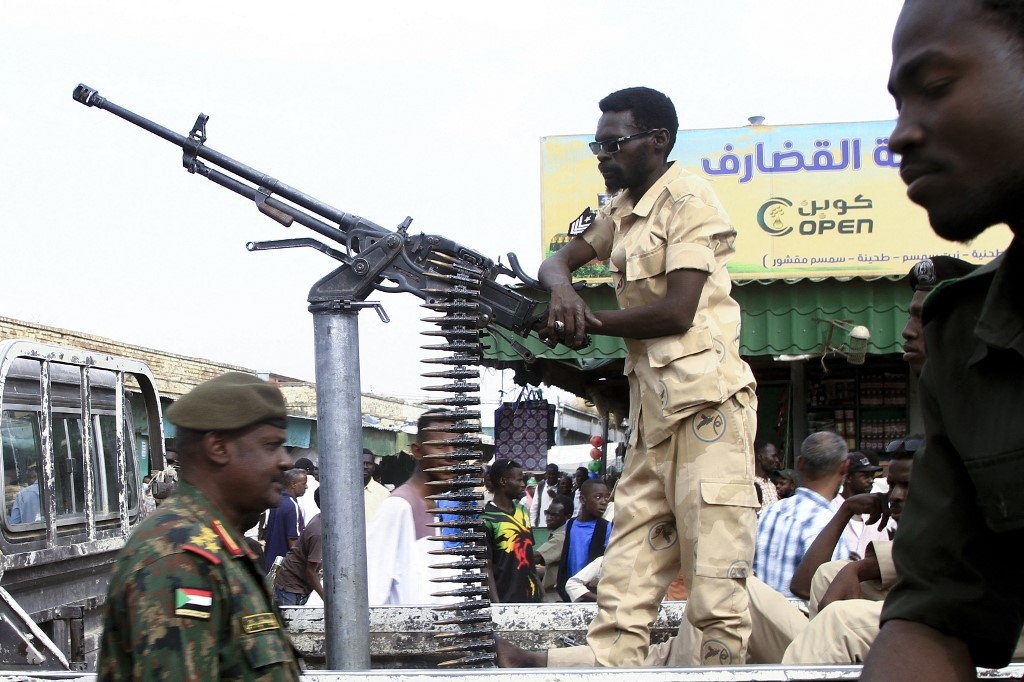
One year on from the beginning of Sudan's civil war, much of the country has been left in ruins and the death toll continues to rise.
The war between the paramilitary Rapid Support Forces (RSF), led by General Mohamed Hamdan Dagalo, better known as Hemeti, and the Sudanese Armed Forces (SAF), headed by General Abdel Fattah al-Burhan, began on 15 April last year.
The statistics are stark behind the images and stories of conflict.
According to the Armed Conflict Location & Event Data Project (ACLED), which the United Nations cites, there have been more than 15,550 "reported fatalities" in Sudan over a year of war. However that is considered to be much lower than the true death toll.
Most of the violence, ACLED said, was recorded in Khartoum. "Targeted violence in Darfur was twice as likely to be deadly for civilians than targeted violence in other states in Sudan," it said, adding that 32 percent of all reported civilian deaths were recorded in the restive western region.
In fact, UN experts in January said 10,000 to 15,000 people were killed in West Darfur's state capital el-Geneina alone. In June and November, Middle East Eye reported on mass killings in the city when the RSF and allied Arab militias targeted members of the Black African Masalit community.
Meanwhile, the war has displaced 10.7 million people, according to the Norwegian Refugee Council, the second highest number this century after the Syrian war. Around 1.7 million of those are in neighbouring countries, particularly Chad and Egypt.
The fighting has also left 25 million Sudanese suffering from hunger or malnutrition, with children dying of starvation across the country.
On Monday, the United Nations's children's agency, Unicef, released a set of statistics about the scale of the disaster in Sudan, particularly its impact on children.
The organisation said an estimated 8.9 million children are currently grappling with acute food insecurity, with 4.9 million now having reached emergency levels.
Just under four million children under five are projected to suffer from acute malnutrition this year.
Around 730,000 children are expected to suffer from life-threatening severe acute malnutrition, while more than 90 percent of the country's 19 million school-age children have no access to formal education.
“This brutal war and potential famine is creating an ominous environment for a catastrophic loss of children’s lives,” Unicef deputy executive director Ted Chaiban said on Monday.
“Almost half of the children suffering from severe acute malnutrition are in areas that are hard to access, where there is ongoing fighting, making their conditions all the more dire.”
Unicef also said it is urgently asking for $240m for the next six months to prevent famine in the 93 most vulnerable places in Sudan, which are home to 3.5 million children under five.
For its part, Doctors Without Borders (MSF) said at least one child dies every two hours at North Darfur's Zamzam displacement camp alone.
The UN has warned that "222,000 children could die of starvation within a few weeks or months" and "more than 700,000 this year".
The UN said $2.7bn is needed for aid inside the country, while another $1.4bn is needed for assistance in neighbouring countries that have housed hundreds of thousands of refugees.
A diplomatic source told Reuters that donors would hopefully pledge "well over a billion euros" at an aid conference being held in Paris on Monday.
The EU is set to pledge 350 million euros, while France will add 110 million euros and the United States will invest a total of $147m.
Germany pledged 244 million euros earlier on Monday.
US Special Envoy Tom Perriello last week called the international response so far "pitiful" and warned that "we're at five percent of the needed amount".
"We can manage together to avoid a terrible famine catastrophe, but only if we get active together now," German Foreign Minister Annalena Baerbock said on Monday.

Jerusalem-born rapper Saint Levant has dedicated his debut set at Coachella, the world's largest music festival, to Gaza prompting widespread support online.
"Coachella, my name is Saint Levant and I was born in Jerusalem and raised in Gaza,” the 23-year-old said, introducing himself to the crowd at the festival on Saturday 13 April.
“As I hope all of you are aware, the people of Gaza have been undergoing a brutal, brutal genocide for the past six months. And the people of Palestine have been undergoing a brutal occupation for the past 75 years. It's not just me on the stage - it's the whole Arab world on the stage," he continued.
Palestinian flags and keffiyehs were raised and "Free Palestine" chants were heard throughout the crowd, AFP reported.
Saint Levant's comments sparked an outburst of support online, with fans and Palestinian activists lauding the artist for using his platform to talk about Gaza.
"Saint Levant honoured Palestine every second of his Coachella concert", one user tweeted after the concert.
Saint Levant spent several years in the Gaza Strip during his childhood. In 2007, his family was forced to relocate to Amman, Jordan.
Wow. Saint Levant really gave his people a voice a coachella! Thank you brother! pic.twitter.com/wwCYWlLmUO
— The Catluminati (@TheCatluminati) April 14, 2024
The artist incuded both old and new songs in his performance, including Deira and From Gaza with Love, which was released in 2023.
Deira, released last month, together with 15-year-old rapper MC Abdul from Gaza, is the name of the hotel which Saint Levant's father built when the family moved to Gaza in 2000, the artist revealed in an interview with Variety.
“Deira means the Kasbah or the old city. He built this hotel with mud because it was impossible to import cement at the time. Located on the beach, this hotel was one of the most beautiful in Gaza. It was totally destroyed by bombing three months ago," Levant, whose real name is Marwan Abdelhamid, told the magazine.
Saint Levant representing Palestine at Coachella is goosebumps pic.twitter.com/iB3pXsqFmp
— Ghida (@ghidaarnaout) April 15, 2024
Saint Levant was not the only singer to express solidarity with Palestine at Coachella.
American rapper Tyler, the Creator wore Palestine and Congo flag pins, while Childish Gambino’s bucket hat also featured the red, white, green and black of the Palestinian flag.
Victoria Monet called for a ceasefire in Gaza and an "end to the genocide" of Palestinians during her set.
Israel's assault on Gaza, which began after the 7 October Hamas-led attacks on southern Israel has killed 33,000 people, including 14,500 children.
Some 1.5 million people have taken refuge in the southern city of Rafah, While Israel plans a military assault on the city, the UN says Israel is blocking vital food supplies into the territory.

At least 357 humanitarian-run sites and convoys in Gaza whose coordinates had been shared in advance with warring parties were hit before the World Central Kitchen (WCK) attack this month, Middle East Eye has learnt.
UN officials and aid workers, many speaking on condition of anonymity, have told MEE it had been clear for months that the humanitarian notification system in Gaza was broken.
But when the Israeli military killed seven aid workers, including six foreigners, in the WCK convoy on 1 April, the flawed system came under global scrutiny.
Israeli Defence Minister Yoav Gallant announced the establishment of a new humanitarian deconfliction cell to ensure the security of aid workers. US Ambassador Jack Lew was given a tour.
Yet two weeks on from the attack, Jamie McGoldrick, the UN's outgoing top aid official working in Gaza told MEE on Saturday that "nothing substantive" had changed in the way humanitarians share their locations with the Israeli military to protect themselves.
McGoldrick also told reporters on Friday, his last day in the post, that aid organisations need a hotline to communicate directly with the Israeli military during emergencies and equipment such as two-way radios and satellite phones, items which are standard for aid workers in other conflicts, but not in Gaza where Israel fears they could be seized by Hamas.
“All we can do is keep pressing them for that,” McGoldrick said, of Israeli concessions made since the attack.
The majority of the hits to deconfliction humanitarian sites - 352 - were to locations run by Unrwa, the largest aid organisation operating in Gaza, including a food distribution centre and schools sheltering thousands of civilians.
Collating publicised accounts, MEE has counted five additional locations and convoys of other humanitarian organisations whose coordinates had been shared were also hit.
'Every single day we are discussing internally whether to leave Gaza. We should not be there'
- Brice de la Vingne, MSF
They include a compound in Al-Mawasi housing staff working for the International Rescue Committee and Medical Aid for Palestine, the Gaza City offices of Doctors of the World, a Medecins Sans Frontieres (MSF) convoy in Gaza City and an MSF shelter in Al-Mawasi, and an American Near East Refugee (ANERA) shelter in Deir al-Balah.
The WCK attack brought the toll of aid workers killed in Gaza since 7 October to at least 216, the vast majority of whom were Palestinians killed by aerial bombardment, according to figures compiled by the Aid Worker Security Database.
Aid workers who spoke to MEE said the scale of incidents was unprecedented, even compared to the most dangerous war zones and emergencies they have experienced.
“To be frank, every single day we are discussing internally whether to leave Gaza. We should not be there,” said Brice de la Vingne, MSF's head of emergency unit. “The level of risk we are taking, I’ve never seen.”
Beyond the impact on the lives of aid workers and their families, an insecure deconfliction system means that aid distribution, which is already hugely problematic in Gaza even as famine sets in, is disrupted.
After the attack, WCK - which had been providing more hot meals in Gaza than the World Food Programme and Unrwa combined - and Anera both suspended their operations.
"Between us we are trying to push back this famine and stop it in its tracks. But it's a team effort," the World Food Programme told MEE soon after the attack. "It will only work if all of us are able to do our work and do it safely."
Humanitarian sites and personnel, like civilians, are protected under international humanitarian law. Sharing coordinates with parties to a conflict does not offer any further legal protection, but serves to make it easier for warring parties to steer clear of hitting these locations.
At least in theory. But humanitarians say the density of Gaza, paired with the intensity - and many would argue the indiscriminate nature - of Israel's campaign in Gaza which has seen more than 33,000 Palestinians killed, has made the already difficult process of humanitarian deconfliction extremely challenging.
“Something people don’t understand is that humanitarian organisations don’t operate inside the battlefield normally,” de la Vingne said.
In Ukraine, for instance, he said all of MSF’s operations run out of the reach of artillery. In Mosul, during the campaign against the Islamic State (IS) militant group, MSF had a large surgical unit and other activities close to the frontline, but outside of IS-controlled territory.
“In Gaza, we are in this nightmarish hell scenario where we are working in an environment where people are not supposed to be,” de la Vingne said.
Aid organisations who have had deconflicted sites and convoys hit express frustration over the lack of clarity - or even response - from the Israeli military about the incidents.
The International Rescue Committee and Medical Aid for Palestine said last month that Israeli officials had offered six different explanations about why an F-16 jet hit their stand-alone compound with a 1,000-pound "smart bomb" early on the morning of 18 January, weeks after its coordinates had been shared.
“It is clear from this experience that the Israeli military and government are either unable or unwilling to properly investigate this serious incident,” the organisations said at the time.
Given that aid organisations share coordinates digitally, there will presumably be a paper trail that could give some clues about who received those details and when, and if how and to whom they were passed on.
Without detail about what, how and when decisions were taken, experts say it’s hard to know exactly where and why the deconfliction system in Gaza has failed.
But those currently involved in humanitarian deconfliction in Gaza say they believe communication breakdowns - both between humanitarians and Israel, and in the Israeli chain of command - are a major factor.
“There have been too many incidents of the deconfliction system not working, be it system failures or human error,” McGoldrick told MEE in an interview earlier this month, days after the WCK attack.
In other conflicts, the UN would normally have direct communication with any military controlling an area, McGoldrick said.
At the height of the Saudi-led coalition campaign in Yemen, he said the UN had face-to-face conversations online with the Saudis, allowing information about movements and complications to be shared in real time.
'There have been too many incidents of the deconfliction system not working'
- Jamie McGoldrick, UN
In 2006, during the war between Israel and Hezbollah in Lebanon, a senior UN humanitarian was embedded in the Israeli military operations room “deconflicting the deconfliction”, McGoldrick said.
But that’s not the case now: the UN doesn’t speak directly to the Israeli military, but to Cogat, the Israeli agency that oversees the Palestinian territories, and to the Civilian Liaison Administration, a subdivision of Cogat focused on Gaza.
If there is a serious security incident - at a checkpoint or enroute to a destination for example - there is no way to communicate directly with the Israeli military.
“We need to have a conversation with them directly,” McGoldrick said.
The UN, he added, should have pushed harder earlier in the conflict to get closer to the Israeli military, if not physically embedding someone in a joint operations room, then at least being able to have a face-to-face conversation online, in real time.
“That way, you can have two things happen,” he said. “First, they understand better what you do and how you do it. Secondly, you can build trust in terms of what your expectations are on both sides.”
During earlier wars in Gaza, UN and Cogat officials would meet almost daily to discuss plans for the next 24 hours, Grisha Yakubovich, the former head of Cogat until 2016, told the Washington Post this month.
According to the Post, Yakubovich suggested that no longer happens because of the Israeli military’s reluctance to work with Unrwa. In late January, Israel accused 12 Unrwa staff members of being involved in the Hamas-led attacks on 7 October.
McGoldrick acknowledged there is “a great deal of mistrust with the UN” on the Israeli side. His predecessor, Lynn Hastings, was effectively forced out of the role in December when Israel foreign ministry officials refused to renew her visa, citing lost “trust and confidence”.
He said he had stepped into his role temporarily “not just to improve the operations, but also to build a different relationship with Israel”.
“It hasn’t been easy, but I think we are making some progress,” he said.
The new humanitarian deconfliction cell, announced by the Israeli defence minister, was among topics McGoldrick told journalists he discussed last week with Major General Yaron Finkelman who heads the Israeli military’s Southern Command.
McGoldrick said it was the first meeting with the Israeli military since he started his role in late December.
“We talked very openly about some of the things that are missing,” he said, adding that he was hopeful the conversation would help “because [Finkelman] said he sees us not against them”.
But as of Saturday, McGoldrick told MEE nothing substantive had changed in the efforts to fix deconfliction, noting a Unicef convoy, carrying high-energy foods and fuel, was hit with bullets at a checkpoint last Tuesday.
Unicef had shared its coordinates and received clearance before starting towards to northern Gaza where it was scheduled, among other stops, to visit Kamal Adwan Hospital where children are dying from malnutrition.
Tess Ingram, a Unicef spokesperson who was part of the convoy, said they were approaching the Wadi Gaza checkpoint, one of the main routes into northern Gaza, when gunfire broke out.
Ingram told NPR it wasn’t clear who made the shots. “We just know that it came from the direction of the checkpoint towards civilians, and there didn't seem to be any fire returned,” she said.
After the incident, Israeli forces refused to allow the convoy to continue.
“We’re not going to give up,” Ingram said. “We’re going to try again hopefully later on this week.”
De la Vingne said MSF has yet to receive any calls from Israeli officials about the announced deconfliction cell.
“Since that announcement, there has been no contact from their side, no initiative, no nothing,” he said.
The Israeli military did not respond when asked when the cell, with humanitarians and the military in one room, would be operational.

Thousands of Palestinians flooded the coast road north on Sunday after hearing that some people had managed to cross a closed checkpoint towards Gaza City, despite Israel denying it was open.
An AFP journalist saw mothers holding their children's hands and families piling onto donkey carts with their luggage as they made the journey.
They hoped to cross a military checkpoint on al-Rashid road south of Gaza City, but the Israeli army told AFP that reports the route was open were "not true".
On the other side, desperate families waited for their loved ones in the rubble of the battered main city in Gaza.
Mahmoud Awdeh said he was waiting for his wife, who has been in the southern city of Khan Yunis since the start of the war on 7 October.
"She told me over the phone that people are leaving the southern part and heading to the north," Awdeh said.
"She told me she's waiting at the checkpoint until the army agrees to let her head to the north," he said, hoping she would be able to cross safely.
During the day rumours also spread that the Israeli army was allowing women, children and men over 50 to go to the north, a claim denied by the army.
Since Israel's assault on Gaza began, the army has besieged the territory, telling Palestinians to leave some areas and preventing them from moving across the narrow strip.
More than 1.5 million Palestinians have taken refuge in the southern city Rafah, according to the United Nations.
Several Palestinians said they came under attack on the route and AFP footage showed people ducking for cover.
The Palestinian official news agency Wafa said "Israeli occupation forces bomb(ed) displaced Palestinians as they were trying to return to the north of Gaza Strip through Al Rasheed street."
Wafa shared a video on X which Middle East Eye has not verified showing people running away from a blast.
Thousands of displayed #Palestinians today tried to go back to their homes in the northern #Gaza Strip before the Israeli forces began opening fire at them killing five, including a woman. pic.twitter.com/NHPyxymvIm
— Khaled Tayeh (@ohitskhaled) April 14, 2024
Nour, a displaced Palestinian said: "When we arrived at the (Israeli) checkpoint, they would let women pass or stop them, but they shot at men so we had to return, we didn't want to die."
The Israeli military did not respond to a request for comment by the time of this article's publication.
Elsewhere in Gaza the fighting continued on Sunday after Iran launched a huge drone and missile attack on Israel overnight.
Iran's first-ever direct assault on Israeli territory came in retaliation for a deadly strike on Tehran's consulate in the Syrian capital.
The strike that Iran blamed on Israel left seven Revolutionary Guards dead, including two generals.
'The Iranian response came so late, after 190 days of war'
- Khaled Al Nems, Gaza resident
But in Rafah on Sunday, Palestinians said they were underwhelmed by Iran's attack on Israel.
"The Iranian response came so late, after 190 days of war," Khaled Al Nems said. "You can see our suffering."
"Their response is too little too late," he added.
Walid Al Kurdi, a displaced Palestinian living in Rafah, said that "Iran's attack on Israel is not really our business".
"The only thing we care about is going back to our homes," he said.
"We are waiting for the coming 48 hours to see if (Israel) responds to Iran, or if they are playing with us and want to distract attention away from Rafah."
Israel has said it plans to send ground forces into Rafah to eradicate remaining Hamas militants there.
Amid makeshift stalls in Rafah's crowded streets, Ahmed Abu Awdeh, another displaced person, said he "hopes Iran will pressure Israel to stop the war" in Gaza.
"Otherwise, let them (the Israelis) strike not only Iran but also Syria, Jordan, and all Arab countries" for not being able to end the war, he added.
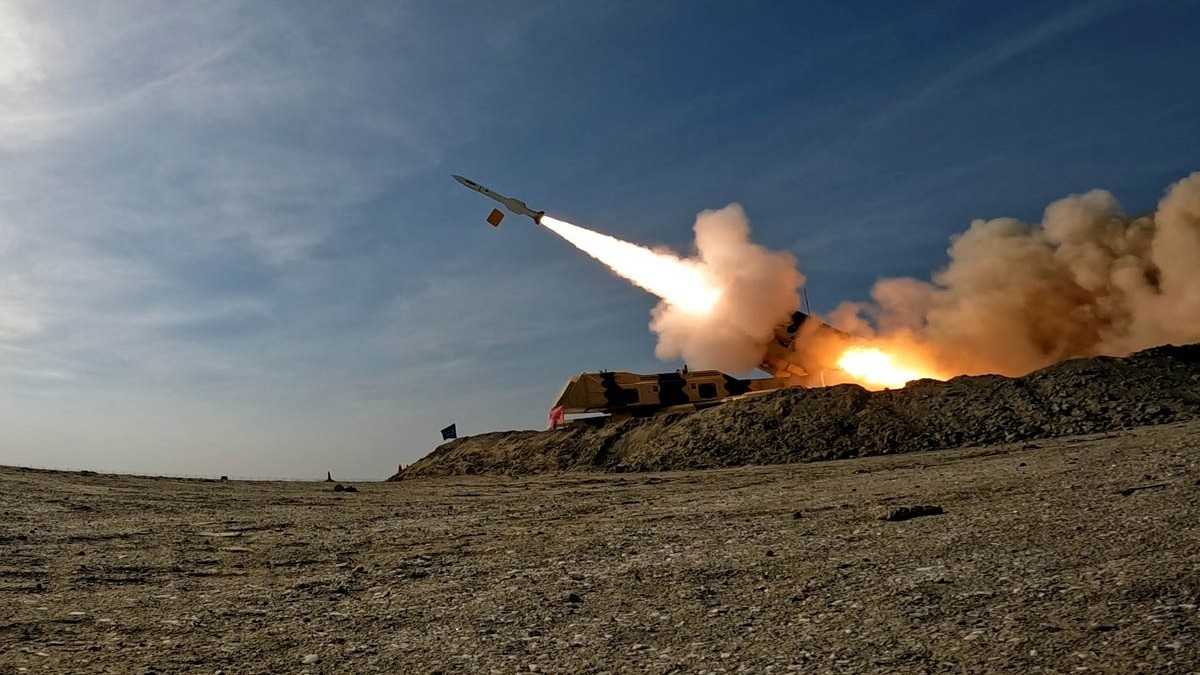
Iran launched a large-scale attack on Israel on Saturday night, firing more than 300 drones and missiles towards the country, most of which were intercepted.
It was Iran's first direct military assault on Israeli territory. The operation was conducted in response to Israeli strikes on the Iranian consular building in Syria earlier this month that killed seven of Iran's Islamic Revolutionary Guard Corps officers, including two senior commanders.
Iran informed Washington that its attacks against Israel would be "limited" and for self-defence, Foreign Minister Hossein Amirabdollahian said on Sunday.
Amirabdollahian said that Iran would "not hesitate" to protect itself against any "new aggression".
Middle East Eye takes a look at what we know so far about what projectiles were launched towards Israel on Saturday night, and which countries were involved in shooting them down.
According to Israeli military officials, around 170 drones, 30 cruise missiles and 120 ballistic missiles were fired towards Israel.
Officials said that while most were launched from Iran, some came from Iraq and Yemen.
Israeli military spokesperson Daniel Hagari said that 99 percent of aerial threats were intercepted.
None of the 170 drones reached Israeli territory, he said, while 25 of the 30 cruise missiles were shot down by Israel.
A small number of ballistic missiles got through Israel’s defences, hitting the Nevatim airbase in southern Israel. Hagari said it caused light structural damage to the facility, but that the base was still functioning.
A young Palestinian Bedouin girl was critically wounded when shrapnel from an intercepted ballistic missile hit her family home near Arad, in the southern Negev region.
"Except for her, as far as we know, there haven't been any other casualties," Hagari said.
The drones are most likely to have been Shahed loitering munitions, which carry around 20kg of explosives, according to US-based weapons expert Jeffrey Lewis.
While it is not yet clear which missiles were used on Saturday, Iran has several types of cruise missiles in its arsenal, including the Kh-55, an air-launched nuclear-capable missile with a range of up to 3,000km.
Tehran also possesses the Khalid Farzh, an advanced anti-ship missile that can carry 1,000kg of warheads with a range of 300km.
Fabian Hinz, a military analyst and researcher, wrote on X that the most likely cruise missile to have been used in the attack was the Paveh, which is part of the Soumar cruise missile family.
It has a range of 1,650km and is therefore capable of hitting Israel. Hinz noted that different versions of the Paveh have been sold by Iran to Yemen's Houthis and Iraq's Popular Mobilisation Forces.
Iran's drones and missiles were intercepted by Israel, the US, the UK, France and Jordan.
Videos on social media showed Israel's Arrow and Iron Dome systems thwarted the aerial threats.
The Arrow, developed in collaboration with the US, is a surface-to-surface missile system that operates outside the atmosphere to fend off long-range missiles. It aims to intercept missiles before they make their descent towards a target.
In November, Israel used the Arrow defence system to successfully intercept ballistic missiles launched by the Houthis in Yemen.
Israel also possesses David's Sling, which intercepts medium-range missiles.
The Iron Dome, which shoots down short-range missiles, has been used throughout the duration of the war to intercept rockets fired by Hamas and Lebanon's Hezbollah.
US officials said that more than 70 drones and three ballistic missiles were intercepted by its navy and military aircraft. It did not give specific details about which defence systems were used.
Officials told CNN that the navy shot down the ballistic missiles using the Aegis missile defence system aboard two guided-missiles destroyers in the eastern Mediterranean.
US forces also shot down Iranian drones above Syria's Sweida and Deraa southern provinces, near Jordan's border, security sources told Reuters.
"To support the defence of Israel, the US military moved aircraft and ballistic missile defence destroyers to the region over the course of the past week," US President Joe Biden said in a statement.
"Thanks to these deployments and the extraordinary skill of our service members, we helped Israel take down nearly all of the incoming drones and missiles."
British Prime Minister Rishi Sunak confirmed on Sunday that the Royal Air Force (RAF) shot down "a number of Iranian attack drones". He added that the RAF had sent additional planes to the region.
Israeli officials said France was also involved in blocking the Iranian attack.
"France has very good technology, jets, radar - and I know they were contributing in patrolling airspace," Hagari said, giving no further detail on French involvement.
Jordan also took part in intercepting Iranian missiles, according to security sources cited by Reuters. Sources said the missiles were intercepted near the Jordan Valley and along the Jordan-Syria border.
"Some shrapnel fell in multiple places during that time without causing any significant damage or any injuries to citizens," a statement from Jordan's cabinet read.